Women Empowerment – Workshop 4 (Money Mindset)

The Appleton Greene Corporate Training Program (CTP) for Women Empowerment is provided by Ms. Tull Certified Learning Provider (CLP). Program Specifications: Monthly cost USD$2,500.00; Monthly Workshops 6 hours; Monthly Support 4 hours; Program Duration 12 months; Program orders subject to ongoing availability.
If you would like to view the Client Information Hub (CIH) for this program, please Click Here
Learning Provider Profile

Ms. Tull is a Certified Learning Provider (CLP) with Appleton Greene. She has over 25 years of experience in coaching, consulting and training CEO’s and executives. She specializes in the areas of personal and professional development and leadership. She is passionate about empowering women in the workplace equipping them with leadership skills and helping them to reveal their unique value, so they can reach their true potential and make a bigger impact. She has industry experience in the following sectors: Technology, Financial Services, Biomedical, Consultancy and Healthcare. She has commercial experience in the following countries: United States, Canada, England, Mexico and Sweden. More specifically within the following cities: Austin, TX; Houston, TX; Dallas, TX; Los Angeles, CA; New York City NY; St. Louis, MS; Virginia Beach, VA; Chicago IL. Her personal achievements include 17 yrs. as Founder/CEO of Silverlining Concepts, LLC where she empowers business owners and leaders to own their value and earn their worth, Certified Money Breakthrough Method Coach, Best-selling Author of a book about owning your value, so you can earn your worth in the workplace, Executive Contributor to Huffington Post, Biz Journals and Brainz Magazine, featured on the Brainz 500 Global list 2021. She also is a co-host on a national TV show- that focuses on bringing more light and positivity to the world. Her service skills include; leadership development, executive coaching, business strategy, sales and marketing strategies, mindset shifting and advanced communications and presentation skills.
MOST Analysis
Mission Statement
Have you ever heard how you do money is how you do everything? Where money is concerned, you are either experiencing contraction (repelling it) or expansion (attracting it). Discover how you can clear your money clutter, so you can earn and save more money. You will obtain clarity, confidence, and freedom when it comes to money. You’ll learn a proven step by step process to allow you to take control of your financial future.
Objectives
1. Money Legacy – Understanding your money story also known as your money legacy, is one of the most important things you can do to improve your financial situation. It’s critical to understand your current relationship with money—what you say about it, how you feel about it, what you believe about it, and how you use it. In this lesson, you will learn actionable steps to bring about positive change for your financial future including creating a new Family Money Legacy.
2. Expansion vs. Contraction – When it comes to money you have either an Abundance Mindset with expansive thoughts of (abundance, peace, freedom) or a Scarcity Mindset with contractive thoughts such as (fear, stress and lack). In this lesson, you learn how contractive thoughts can not only keep you from generating the income and lifestyle you desire but can sabotage your success in all areas of your life.
3. Clear Clutter – Having clutter in our lives can bog us down and create stress and overwhelm in lur lives. Decluttering and getting organized around money is a powerful first step to changing the direction of your money life. In this lesson, you will learn powerful steps to create a clutter free life.
4. Forgive Past – Many of us want to have a bright, shining future: filled with hope and clarity and empowerment when it comes to our financial futures. But something seems to be holding us back. As much as we desire a new future, we simply can’t move forward until we pause, looked into our past, and address the issues that are tying us to it. This course is all about forgiveness – why it’s the answer and exactly how to go about it.
5. Money Breakthrough – Your money mindset influences what you believe you can and cannot do with money, how much money you believe you’re allowed, entitled, and able to earn, how much money you believe you can and should spend, how you use debt, how much money you give away, and your ability to invest confidently and successfully. In this lesson you will lean to shift your money mindset with a money breakthrough that will allow you to instantly up-level your confidence, create a new, empowered money mindset, and feel on fire about the special brilliance you bring to the world.
6. Relationship with Money – We have relationships with almost everything in our environment, including concepts, and yes…even money. In order to be financially successful, it is necessary for you to adopt a new money mindset. This means not only removing blocks, forgiving, shifting your mindset but also creating a new healthy and empowering relationship with money.
7. Need vs Want – When creating a monthly budget, one of the most important steps is to categorize your spending by whether it is a “need” or a “want.” It is also one of the most difficult steps to take because what constitutes a need versus a want varies from person to person. It’s also easy to mistake wants for needs if you’re so used to having them that you can’t imagine life without them. However, as we demonstrate in this lesson, needs, and wants are not the same thing and why it’s critical to understand the distinction between them.
8. Financial Literacy – Many consumers today have a basic understanding of finance. Indeed, a lack of financial knowledge may be one of the reasons why many individuals struggle with saving and investing. Few people are prepared as financial decision-making becomes more complicated. That is why Financial Illiteracy is the #1 crisis in America! Understanding the value of money and how it works can significantly impact our future.
9. Money Management – Your overall wealth has less to do with how much money you make and more to do with learning how to manage your money. Whether you earn $100,000 or $1 million, developing your money management skills can help you achieve financial freedom, retire comfortably, and much more. The good news is that you don’t have to be a math genius or a millionaire to learn about money management. Money management is fundamentally about changing your mindset and developing good habits – habits we will do a deep dive in during this course.
10. Money Goals – It’s important to focus on what you want and create goals when it comes to money. Imagine what it will be like to live debt-free, achieve financial stability, and have the ability to spend your money on the things you value most. When you focus on what you want vs. your current situation it’s far easier to stay motivated and reach your financial goals. During this lesson, we will help you breakthrough your financial glass ceiling determine your freedom number, set your new bold money goal and create your “Money Mantra”.
11. Action and Accountability – Every person in the world wants a comfortable life, smooth relationships, and enough money to live comfortably, have their own house, car, and enough money to enjoy their yearly or monthly vacations. But just having a dream, plan, or vision for your work isn’t enough. To have this kind of life, the most important thing that is required is action. In order to get your desired outcome, you must take action. This lesson is all about learning what actionable steps to take to create the life and financial future that you want.
12. Money Power – Money is a metaphor for your self-worth. If you are not making the money that you desire somewhere in your life you are giving your power away. We’ve all felt as if we were at the mercy of what happened to us. However, just because you believe you are powerless does not imply that you are. When you feel powerless, it’s usually because you’ve chosen (consciously or unconsciously) to give away your power to others. The great news is that you can do something about it. In this lesson we will go through a powerful process to help you re-claim your power in your life and with money.
Strategies
1. Learn and implement the steps to create a new Family Money Legacy.
2. Method to move out of contraction and into expansion when it comes to money.
3. Discover strategies to eliminate clutter in your life and access the 10 steps to de-clutter your finances.
4. Learn a “letting go” tool and create a forgiveness letter.
5. Adopt a new mindset with the 8-step process to improve your money mindset and method to create your own money breakthrough.
6. Learn 5 powerful ways to creating an empowered relationship with money and process to create a sacred relationship with money.
7. Learn the 5 levels of Maslow’s Hierarchy of Needs and develop a strategy to discern wants from needs.
8. Identify 7 reasons why financial literacy is important to your financial success.
9. 10 simple ways to successfully manage your money.
10. Identify your freedom number, create money goals and a new “Money Mantra.”
11. Discover how to prioritize money in your life with the 7 financial priorities, learn powerful action and accountability steps as well as create a money vision board.
12. Learn the 7 Money Archetypes, 10 ways we give our money power away and a step-by-step process to re-claim it.
Tasks
1. Go through the Study Guide and Distance Learning lessons first and make notes.
2. Identify the key relationships that need to be managed to ensure project success.
3. Determine needs, critical drivers, concerns, and interests for each relationship.
4. Ensure that these relationships are built and maintained on a regular basis, by soliciting ideas, comments, and assessing value.
5. Schedule a meeting for the participants to meet and discuss the workshop within 30 days.
6. Participants to share expectations and feedback during the workshop.
7. Set a deadline for determining and analyzing the time commitment for each of the participants.
8. Participants to demonstrate personal presence, get feedback, and make a plan for further development.
9. Participants to experience the challenges of change and apply learnings to the philosophy of leading change.
10. Participants are to complete each exercise fully, actively participate in all of the group exercises and be willing to discuss the process and results with the group.
11. Participants to complete their project by identifying and implementing changes discussed throughout the workshop.
12. Participants to review resources for inspiration and identify at least one new tool for adoption from the provided list.
Introduction
Material wealth and financial success provide more freedom and comfort in life, as well as less stress and hardship. Many of us want to make more money and believe we have a greater potential for wealth than we do now. We may even have a good idea of how to make money, but something is still holding us back. If you don’t feel like you’ve reached your full potential for success, perhaps a change in your money mindset is in order. We can’t change our life if we’re worried about money, and we can’t be happy if you’re constantly stressed about money. Chances are, that you have something to share that offers great value or that can make a difference. If you’re worried about or conflicted around money, you won’t be able to get your gifts or talents out into the world.
This workshop – on Money Mindset dives in deep to uncover where this FEAR around money comes from and how you can shift it and begin to feel empowered when it comes to making and managing money.
With a better understanding of your money mindset, you can begin to take action to change it and transform your relationship with money.
What exactly is Money Mindset?
A money mindset is your distinct and individual set of core beliefs about money and how it functions in the world.
It is your monetary attitude. Your money mindset influences what you believe you can and cannot do with money, how much money you believe you’re allowed, entitled, and able to earn, how much money you believe you can and should spend, how you use debt, how much money you give away, and your ability to invest confidently and successfully.
Your attitude toward people, rich and poor, is influenced by your money mindset. Do you think rich people are evil, mean, materialistic, and greedy, and thus you don’t want to be like them? Do you believe that poor people are noble and virtuous, the salt of the earth – and that it is therefore preferable to be like them?
Another indicator of your money mindset is how you handle yourself in financial conversations: do you feel vulnerable and intimidated, or confident and in control? Are you comfortable asking questions – either yes because you feel safe doing so, or no because you’re shy and embarrassed? Do you have an unspoken belief that money is a man’s world and that women should not be concerned with it?
What’s fascinating about our money mindset is that it resides in our unconscious mind. And it can lie dormant for a long time. However, by becoming an astute observer of your thoughts, feelings, bodily reactions, and interactions with money, you gain awareness of your current set point and the ability to shift your mindset.

History of Money Mindset
Many of our core beliefs about money are formed in childhood as a result of observing and internalizing money messages from our parents, friends, community, and other caregivers. Our parents, in particular.
Little children absorb everything they come into contact with. We paid close attention to how the adults closest to us dealt with money and life – did your parents fight about money, or were they cool and collected when family finances were discussed?
Why is it Important?
Understanding your money mindset and where it came from can aid in its transformation. Just as you would enter your coordinates into a navigator before embarking on a journey, you should be aware of and comprehend your current financial beliefs.
Knowing where you started helps you realize how far you’ve come as you shift your mindset. It’s like looking at the map and realizing you’ve already traveled 200 miles. The difference with money is that it is a once-in-a-lifetime journey. We never arrive at our destination. We’re just getting started. The journey is the destination.
How to Change Your Money Mindset.
Awareness is the first step toward changing your money mindset. Pay attention to your money-related thoughts, behaviors, and actions. Your feelings will be influenced by your financial thoughts. And your emotions influence your behavior.
For example, if you believe money is a scarce commodity, you will be stressed and anxious. You may lash out at family members for their financial frivolity, carelessness, or money mistakes. You are not likely to be generous, and you may even hoard money and material possessions.
We either have expansive thoughts about money (abundance, joy, peace) or contractive thoughts such as (lack, scarcity, or fear).
Most often we have made any financial mistakes that we wish we could undo. It’s perfectly normal! We’re all guilty of it. It’s a part of our financial education and maturation. Furthermore, neither our parents nor our school systems taught us anything about proper money management. As a result, we learned through osmosis and trial and error. It is essential to forgive ourselves for our financial blunders. Allow ourselves to let go of the past and let go of any feelings of shame, guilt, or stress.
It takes time, focus and a structured process to change your money mindset. It’s time to get started if you want to have a more joyful, abundant, and confident relationship with your money. The journey is the destination. Let’s begin your money mindset shift journey.
Executive Summary

It’s a common misconception that money and spirituality are incompatible: if you’re a kind giving person or spiritual in anyway, you shouldn’t want money or people who want money are materialistic and greedy.
However, this way of thinking is extremely detrimental to our success. In fact, this couldn’t be further from the truth: money does not inherently breed greed and materialism. Money and spirituality, go very well together and can bring abundance into our lives. We will have a difficult time creating financial abundance in this lifetime if we feel (even slightly) that money is bad.
That is why having a money mindset that is based on expansive thoughts (abundance and peace) and reflects prosperity is necessary to obtain our financial goals.
The Money Mindset workshop will provide a focused structure and process to shift our money mindset and teaches money skills which will allow us to become confident when it comes to making and managing money.
There are 12 courses (or focus areas) in the Money Mindset Workshop.
Here they are:
1. Money Legacy – Understanding your money story also known as your money legacy, is one of the most important things you can do to improve your financial situation. It’s critical to understand your current relationship with money—what you say about it, how you feel about it, what you believe about it, and how you use it. In this lesson, you will learn actionable steps to bring about positive change for your financial future including creating a new Family Money Legacy.

2. Expansion vs. Contraction – When it comes to money you have either an Abundance Mindset with expansive thoughts of (abundance, peace, freedom) or a Scarcity Mindset with contractive thoughts such as (fear, stress and lack). In this lesson, you learn how contractive thoughts can not only keep you from generating the income and lifestyle you desire but can sabotage your success in all areas of your life.

3. Clear Clutter – Having clutter in our lives can bog us down and create stress and overwhelm in lur lives. Decluttering and getting organized around money is a powerful first step to changing the direction of your money life. In this lesson, you will learn powerful steps to create a clutter free life.

4. Forgive Past – Many of us want to have a bright, shining future: filled with hope and clarity and empowerment when it comes to our financial futures. But something seems to be holding us back. As much as we desire a new future, we simply can’t move forward until we pause, looked into our past, and address the issues that are tying us to it. This course is all about forgiveness – why it’s the answer and exactly how to go about it.

5. Money Breakthrough – Your money mindset influences what you believe you can and cannot do with money, how much money you believe you’re allowed, entitled, and able to earn, how much money you believe you can and should spend, how you use debt, how much money you give away, and your ability to invest confidently and successfully. In this lesson you will lean to shift your money mindset with a money breakthrough that will allow you to instantly up-level your confidence, create a new, empowered money mindset, and feel on fire about the special brilliance you bring to the world.

6. Relationship with Money – We have relationships with almost everything in our environment, including concepts, and yes…even money. In order to be financially successful, it is necessary for you to adopt a new money mindset. This means not only removing blocks, forgiving, shifting your mindset but also creating a new healthy and empowering relationship with money.

7. Need vs Want – When creating a monthly budget, one of the most important steps is to categorize your spending by whether it is a “need” or a “want.” It is also one of the most difficult steps to take because what constitutes a need versus a want varies from person to person. It’s also easy to mistake wants for needs if you’re so used to having them that you can’t imagine life without them. However, as we demonstrate in this lesson, needs, and wants are not the same thing and why it’s critical to understand the distinction between them.

8. Financial Literacy – Many consumers today have a basic understanding of finance. Indeed, a lack of financial knowledge may be one of the reasons why many individuals struggle with saving and investing. Few people are prepared as financial decision-making becomes more complicated. That is why Financial Illiteracy is the #1 crisis in America! Understanding the value of money and how it works can significantly impact our future.

9. Money Management – Your overall wealth has less to do with how much money you make and more to do with learning how to manage your money. Whether you earn $100,000 or $1 million, developing your money management skills can help you achieve financial freedom, retire comfortably, and much more. The good news is that you don’t have to be a math genius or a millionaire to learn about money management. Money management is fundamentally about changing your mindset and developing good habits – habits we will do a deep dive in during this course.

10. Money Goals – It’s important to focus on what you want and create goals when it comes to money. Imagine what it will be like to live debt-free, achieve financial stability, and have the ability to spend your money on the things you value most. When you focus on what you want vs. your current situation it’s far easier to stay motivated and reach your financial goals. During this lesson, we will help you breakthrough your financial glass ceiling, determine your freedom number, set your new bold money goal and create your “Money Mantra”.

11. Action and Accountability – Every person in the world wants a comfortable life, smooth relationships, and enough money to live comfortably, have their own house, car, and enough money to enjoy their yearly or monthly vacations. But just having a dream, plan, or vision for your work isn’t enough. To have this kind of life, the most important thing that is required is action. In order to get your desired outcome, you must take action. This lesson is all about learning what actionable steps to take to create the life and financial future that you want.

12. Money Power – Money is a metaphor for your self-worth. If you are not making the money that you desire somewhere in your life you are giving your power away. We’ve all felt as if we were at the mercy of what happened to us. However, just because you believe you are powerless does not imply that you are. When you feel powerless, it’s usually because you’ve chosen (consciously or unconsciously) to give away your power to others. The great news is that you can do something about it. In this lesson we will go through a powerful process to help you re-claim your power in your life and with money.

Impact for Positive Change
At the conclusion of each workshop, we will focus our collective attention on how you, as a leader, will put what we’ve learned into practice in your business. Impact for positive change means putting what you’ve learned into practice and taking action to make a significant difference. That starts with a strong desire to change and reflection on what you’re going to do differently. It’s also crucial to consider how you’ll involve people in your organization in the discussion about what you’ve learnt and make requests for what you need from them in order to succeed. Not only will your formal team be involved, but so will your cross-functional colleagues. How will you be collaborating to ensure all the women in your company have everything they need to succeed?
Curriculum
Women Empowerment – Workshop 4 – Money Mindset
- Money Legacy
- Expansion vs Contraction
- Clear Clutter
- Forgive Past
- Money Breakthrough
- Relationship with Money
- Need vs. Want
- Financial Literacy
- Money Management
- Money Goals
- Action and Accountability
- Money Power
Distance Learning
Introduction
Welcome to Appleton Greene and thank you for enrolling on the Women Empowerment corporate training program. You will be learning through our unique facilitation via distance-learning method, which will enable you to practically implement everything that you learn academically. The methods and materials used in your program have been designed and developed to ensure that you derive the maximum benefits and enjoyment possible. We hope that you find the program challenging and fun to do. However, if you have never been a distance-learner before, you may be experiencing some trepidation at the task before you. So we will get you started by giving you some basic information and guidance on how you can make the best use of the modules, how you should manage the materials and what you should be doing as you work through them. This guide is designed to point you in the right direction and help you to become an effective distance-learner. Take a few hours or so to study this guide and your guide to tutorial support for students, while making notes, before you start to study in earnest.
Study environment
You will need to locate a quiet and private place to study, preferably a room where you can easily be isolated from external disturbances or distractions. Make sure the room is well-lit and incorporates a relaxed, pleasant feel. If you can spoil yourself within your study environment, you will have much more of a chance to ensure that you are always in the right frame of mind when you do devote time to study. For example, a nice fire, the ability to play soft soothing background music, soft but effective lighting, perhaps a nice view if possible and a good size desk with a comfortable chair. Make sure that your family know when you are studying and understand your study rules. Your study environment is very important. The ideal situation, if at all possible, is to have a separate study, which can be devoted to you. If this is not possible then you will need to pay a lot more attention to developing and managing your study schedule, because it will affect other people as well as yourself. The better your study environment, the more productive you will be.
Study tools & rules
Try and make sure that your study tools are sufficient and in good working order. You will need to have access to a computer, scanner and printer, with access to the internet. You will need a very comfortable chair, which supports your lower back, and you will need a good filing system. It can be very frustrating if you are spending valuable study time trying to fix study tools that are unreliable, or unsuitable for the task. Make sure that your study tools are up to date. You will also need to consider some study rules. Some of these rules will apply to you and will be intended to help you to be more disciplined about when and how you study. This distance-learning guide will help you and after you have read it you can put some thought into what your study rules should be. You will also need to negotiate some study rules for your family, friends or anyone who lives with you. They too will need to be disciplined in order to ensure that they can support you while you study. It is important to ensure that your family and friends are an integral part of your study team. Having their support and encouragement can prove to be a crucial contribution to your successful completion of the program. Involve them in as much as you can.
Successful distance-learning
Distance-learners are freed from the necessity of attending regular classes or workshops, since they can study in their own way, at their own pace and for their own purposes. But unlike traditional internal training courses, it is the student’s responsibility, with a distance-learning program, to ensure that they manage their own study contribution. This requires strong self-discipline and self-motivation skills and there must be a clear will to succeed. Those students who are used to managing themselves, are good at managing others and who enjoy working in isolation, are more likely to be good distance-learners. It is also important to be aware of the main reasons why you are studying and of the main objectives that you are hoping to achieve as a result. You will need to remind yourself of these objectives at times when you need to motivate yourself. Never lose sight of your long-term goals and your short-term objectives. There is nobody available here to pamper you, or to look after you, or to spoon-feed you with information, so you will need to find ways to encourage and appreciate yourself while you are studying. Make sure that you chart your study progress, so that you can be sure of your achievements and re-evaluate your goals and objectives regularly.
Self-assessment
Appleton Greene training programs are in all cases post-graduate programs. Consequently, you should already have obtained a business-related degree and be an experienced learner. You should therefore already be aware of your study strengths and weaknesses. For example, which time of the day are you at your most productive? Are you a lark or an owl? What study methods do you respond to the most? Are you a consistent learner? How do you discipline yourself? How do you ensure that you enjoy yourself while studying? It is important to understand yourself as a learner and so some self-assessment early on will be necessary if you are to apply yourself correctly. Perform a SWOT analysis on yourself as a student. List your internal strengths and weaknesses as a student and your external opportunities and threats. This will help you later on when you are creating a study plan. You can then incorporate features within your study plan that can ensure that you are playing to your strengths, while compensating for your weaknesses. You can also ensure that you make the most of your opportunities, while avoiding the potential threats to your success.
Accepting responsibility as a student
Training programs invariably require a significant investment, both in terms of what they cost and in the time that you need to contribute to study and the responsibility for successful completion of training programs rests entirely with the student. This is never more apparent than when a student is learning via distance-learning. Accepting responsibility as a student is an important step towards ensuring that you can successfully complete your training program. It is easy to instantly blame other people or factors when things go wrong. But the fact of the matter is that if a failure is your failure, then you have the power to do something about it, it is entirely in your own hands. If it is always someone else’s failure, then you are powerless to do anything about it. All students study in entirely different ways, this is because we are all individuals and what is right for one student, is not necessarily right for another. In order to succeed, you will have to accept personal responsibility for finding a way to plan, implement and manage a personal study plan that works for you. If you do not succeed, you only have yourself to blame.
Planning
By far the most critical contribution to stress, is the feeling of not being in control. In the absence of planning we tend to be reactive and can stumble from pillar to post in the hope that things will turn out fine in the end. Invariably they don’t! In order to be in control, we need to have firm ideas about how and when we want to do things. We also need to consider as many possible eventualities as we can, so that we are prepared for them when they happen. Prescriptive Change, is far easier to manage and control, than Emergent Change. The same is true with distance-learning. It is much easier and much more enjoyable, if you feel that you are in control and that things are going to plan. Even when things do go wrong, you are prepared for them and can act accordingly without any unnecessary stress. It is important therefore that you do take time to plan your studies properly.
Management
Once you have developed a clear study plan, it is of equal importance to ensure that you manage the implementation of it. Most of us usually enjoy planning, but it is usually during implementation when things go wrong. Targets are not met and we do not understand why. Sometimes we do not even know if targets are being met. It is not enough for us to conclude that the study plan just failed. If it is failing, you will need to understand what you can do about it. Similarly if your study plan is succeeding, it is still important to understand why, so that you can improve upon your success. You therefore need to have guidelines for self-assessment so that you can be consistent with performance improvement throughout the program. If you manage things correctly, then your performance should constantly improve throughout the program.
Study objectives & tasks
The first place to start is developing your program objectives. These should feature your reasons for undertaking the training program in order of priority. Keep them succinct and to the point in order to avoid confusion. Do not just write the first things that come into your head because they are likely to be too similar to each other. Make a list of possible departmental headings, such as: Customer Service; E-business; Finance; Globalization; Human Resources; Technology; Legal; Management; Marketing and Production. Then brainstorm for ideas by listing as many things that you want to achieve under each heading and later re-arrange these things in order of priority. Finally, select the top item from each department heading and choose these as your program objectives. Try and restrict yourself to five because it will enable you to focus clearly. It is likely that the other things that you listed will be achieved if each of the top objectives are achieved. If this does not prove to be the case, then simply work through the process again.
Study forecast
As a guide, the Appleton Greene Program Title corporate training program should take 12-18 months to complete, depending upon your availability and current commitments. The reason why there is such a variance in time estimates is because every student is an individual, with differing productivity levels and different commitments. These differentiations are then exaggerated by the fact that this is a distance-learning program, which incorporates the practical integration of academic theory as an as a part of the training program. Consequently all of the project studies are real, which means that important decisions and compromises need to be made. You will want to get things right and will need to be patient with your expectations in order to ensure that they are. We would always recommend that you are prudent with your own task and time forecasts, but you still need to develop them and have a clear indication of what are realistic expectations in your case. With reference to your time planning: consider the time that you can realistically dedicate towards study with the program every week; calculate how long it should take you to complete the program, using the guidelines featured here; then break the program down into logical modules and allocate a suitable proportion of time to each of them, these will be your milestones; you can create a time plan by using a spreadsheet on your computer, or a personal organizer such as MS Outlook, you could also use a financial forecasting software; break your time forecasts down into manageable chunks of time, the more specific you can be, the more productive and accurate your time management will be; finally, use formulas where possible to do your time calculations for you, because this will help later on when your forecasts need to change in line with actual performance. With reference to your task planning: refer to your list of tasks that need to be undertaken in order to achieve your program objectives; with reference to your time plan, calculate when each task should be implemented; remember that you are not estimating when your objectives will be achieved, but when you will need to focus upon implementing the corresponding tasks; you also need to ensure that each task is implemented in conjunction with the associated training modules which are relevant; then break each single task down into a list of specific to do’s, say approximately ten to do’s for each task and enter these into your study plan; once again you could use MS Outlook to incorporate both your time and task planning and this could constitute your study plan; you could also use a project management software like MS Project. You should now have a clear and realistic forecast detailing when you can expect to be able to do something about undertaking the tasks to achieve your program objectives.
Performance management
It is one thing to develop your study forecast, it is quite another to monitor your progress. Ultimately it is less important whether you achieve your original study forecast and more important that you update it so that it constantly remains realistic in line with your performance. As you begin to work through the program, you will begin to have more of an idea about your own personal performance and productivity levels as a distance-learner. Once you have completed your first study module, you should re-evaluate your study forecast for both time and tasks, so that they reflect your actual performance level achieved. In order to achieve this you must first time yourself while training by using an alarm clock. Set the alarm for hourly intervals and make a note of how far you have come within that time. You can then make a note of your actual performance on your study plan and then compare your performance against your forecast. Then consider the reasons that have contributed towards your performance level, whether they are positive or negative and make a considered adjustment to your future forecasts as a result. Given time, you should start achieving your forecasts regularly.
With reference to time management: time yourself while you are studying and make a note of the actual time taken in your study plan; consider your successes with time-efficiency and the reasons for the success in each case and take this into consideration when reviewing future time planning; consider your failures with time-efficiency and the reasons for the failures in each case and take this into consideration when reviewing future time planning; re-evaluate your study forecast in relation to time planning for the remainder of your training program to ensure that you continue to be realistic about your time expectations. You need to be consistent with your time management, otherwise you will never complete your studies. This will either be because you are not contributing enough time to your studies, or you will become less efficient with the time that you do allocate to your studies. Remember, if you are not in control of your studies, they can just become yet another cause of stress for you.
With reference to your task management: time yourself while you are studying and make a note of the actual tasks that you have undertaken in your study plan; consider your successes with task-efficiency and the reasons for the success in each case; take this into consideration when reviewing future task planning; consider your failures with task-efficiency and the reasons for the failures in each case and take this into consideration when reviewing future task planning; re-evaluate your study forecast in relation to task planning for the remainder of your training program to ensure that you continue to be realistic about your task expectations. You need to be consistent with your task management, otherwise you will never know whether you are achieving your program objectives or not.
Keeping in touch
You will have access to qualified and experienced professors and tutors who are responsible for providing tutorial support for your particular training program. So don’t be shy about letting them know how you are getting on. We keep electronic records of all tutorial support emails so that professors and tutors can review previous correspondence before considering an individual response. It also means that there is a record of all communications between you and your professors and tutors and this helps to avoid any unnecessary duplication, misunderstanding, or misinterpretation. If you have a problem relating to the program, share it with them via email. It is likely that they have come across the same problem before and are usually able to make helpful suggestions and steer you in the right direction. To learn more about when and how to use tutorial support, please refer to the Tutorial Support section of this student information guide. This will help you to ensure that you are making the most of tutorial support that is available to you and will ultimately contribute towards your success and enjoyment with your training program.
Work colleagues and family
You should certainly discuss your program study progress with your colleagues, friends and your family. Appleton Greene training programs are very practical. They require you to seek information from other people, to plan, develop and implement processes with other people and to achieve feedback from other people in relation to viability and productivity. You will therefore have plenty of opportunities to test your ideas and enlist the views of others. People tend to be sympathetic towards distance-learners, so don’t bottle it all up in yourself. Get out there and share it! It is also likely that your family and colleagues are going to benefit from your labors with the program, so they are likely to be much more interested in being involved than you might think. Be bold about delegating work to those who might benefit themselves. This is a great way to achieve understanding and commitment from people who you may later rely upon for process implementation. Share your experiences with your friends and family.
Making it relevant
The key to successful learning is to make it relevant to your own individual circumstances. At all times you should be trying to make bridges between the content of the program and your own situation. Whether you achieve this through quiet reflection or through interactive discussion with your colleagues, client partners or your family, remember that it is the most important and rewarding aspect of translating your studies into real self-improvement. You should be clear about how you want the program to benefit you. This involves setting clear study objectives in relation to the content of the course in terms of understanding, concepts, completing research or reviewing activities and relating the content of the modules to your own situation. Your objectives may understandably change as you work through the program, in which case you should enter the revised objectives on your study plan so that you have a permanent reminder of what you are trying to achieve, when and why.
Distance-learning check-list
Prepare your study environment, your study tools and rules.
Undertake detailed self-assessment in terms of your ability as a learner.
Create a format for your study plan.
Consider your study objectives and tasks.
Create a study forecast.
Assess your study performance.
Re-evaluate your study forecast.
Be consistent when managing your study plan.
Use your Appleton Greene Certified Learning Provider (CLP) for tutorial support.
Make sure you keep in touch with those around you.

Tutorial Support
Programs
Appleton Greene uses standard and bespoke corporate training programs as vessels to transfer business process improvement knowledge into the heart of our clients’ organizations. Each individual program focuses upon the implementation of a specific business process, which enables clients to easily quantify their return on investment. There are hundreds of established Appleton Greene corporate training products now available to clients within customer services, e-business, finance, globalization, human resources, information technology, legal, management, marketing and production. It does not matter whether a client’s employees are located within one office, or an unlimited number of international offices, we can still bring them together to learn and implement specific business processes collectively. Our approach to global localization enables us to provide clients with a truly international service with that all important personal touch. Appleton Greene corporate training programs can be provided virtually or locally and they are all unique in that they individually focus upon a specific business function. They are implemented over a sustainable period of time and professional support is consistently provided by qualified learning providers and specialist consultants.
Support available
You will have a designated Certified Learning Provider (CLP) and an Accredited Consultant and we encourage you to communicate with them as much as possible. In all cases tutorial support is provided online because we can then keep a record of all communications to ensure that tutorial support remains consistent. You would also be forwarding your work to the tutorial support unit for evaluation and assessment. You will receive individual feedback on all of the work that you undertake on a one-to-one basis, together with specific recommendations for anything that may need to be changed in order to achieve a pass with merit or a pass with distinction and you then have as many opportunities as you may need to re-submit project studies until they meet with the required standard. Consequently the only reason that you should really fail (CLP) is if you do not do the work. It makes no difference to us whether a student takes 12 months or 18 months to complete the program, what matters is that in all cases the same quality standard will have been achieved.
Support Process
Please forward all of your future emails to the designated (CLP) Tutorial Support Unit email address that has been provided and please do not duplicate or copy your emails to other AGC email accounts as this will just cause unnecessary administration. Please note that emails are always answered as quickly as possible but you will need to allow a period of up to 20 business days for responses to general tutorial support emails during busy periods, because emails are answered strictly within the order in which they are received. You will also need to allow a period of up to 30 business days for the evaluation and assessment of project studies. This does not include weekends or public holidays. Please therefore kindly allow for this within your time planning. All communications are managed online via email because it enables tutorial service support managers to review other communications which have been received before responding and it ensures that there is a copy of all communications retained on file for future reference. All communications will be stored within your personal (CLP) study file here at Appleton Greene throughout your designated study period. If you need any assistance or clarification at any time, please do not hesitate to contact us by forwarding an email and remember that we are here to help. If you have any questions, please list and number your questions succinctly and you can then be sure of receiving specific answers to each and every query.
Time Management
It takes approximately 1 Year to complete the Women Empowerment corporate training program, incorporating 12 x 6-hour monthly workshops. Each student will also need to contribute approximately 4 hours per week over 1 Year of their personal time. Students can study from home or work at their own pace and are responsible for managing their own study plan. There are no formal examinations and students are evaluated and assessed based upon their project study submissions, together with the quality of their internal analysis and supporting documents. They can contribute more time towards study when they have the time to do so and can contribute less time when they are busy. All students tend to be in full time employment while studying and the Women Empowerment program is purposely designed to accommodate this, so there is plenty of flexibility in terms of time management. It makes no difference to us at Appleton Greene, whether individuals take 12-18 months to complete this program. What matters is that in all cases the same standard of quality will have been achieved with the standard and bespoke programs that have been developed.
Distance Learning Guide
The distance learning guide should be your first port of call when starting your training program. It will help you when you are planning how and when to study, how to create the right environment and how to establish the right frame of mind. If you can lay the foundations properly during the planning stage, then it will contribute to your enjoyment and productivity while training later. The guide helps to change your lifestyle in order to accommodate time for study and to cultivate good study habits. It helps you to chart your progress so that you can measure your performance and achieve your goals. It explains the tools that you will need for study and how to make them work. It also explains how to translate academic theory into practical reality. Spend some time now working through your distance learning guide and make sure that you have firm foundations in place so that you can make the most of your distance learning program. There is no requirement for you to attend training workshops or classes at Appleton Greene offices. The entire program is undertaken online, program course manuals and project studies are administered via the Appleton Greene web site and via email, so you are able to study at your own pace and in the comfort of your own home or office as long as you have a computer and access to the internet.
How To Study
The how to study guide provides students with a clear understanding of the Appleton Greene facilitation via distance learning training methods and enables students to obtain a clear overview of the training program content. It enables students to understand the step-by-step training methods used by Appleton Greene and how course manuals are integrated with project studies. It explains the research and development that is required and the need to provide evidence and references to support your statements. It also enables students to understand precisely what will be required of them in order to achieve a pass with merit and a pass with distinction for individual project studies and provides useful guidance on how to be innovative and creative when developing your Unique Program Proposition (UPP).
Tutorial Support
Tutorial support for the Appleton Greene Women Empowerment corporate training program is provided online either through the Appleton Greene Client Support Portal (CSP), or via email. All tutorial support requests are facilitated by a designated Program Administration Manager (PAM). They are responsible for deciding which professor or tutor is the most appropriate option relating to the support required and then the tutorial support request is forwarded onto them. Once the professor or tutor has completed the tutorial support request and answered any questions that have been asked, this communication is then returned to the student via email by the designated Program Administration Manager (PAM). This enables all tutorial support, between students, professors and tutors, to be facilitated by the designated Program Administration Manager (PAM) efficiently and securely through the email account. You will therefore need to allow a period of up to 20 business days for responses to general support queries and up to 30 business days for the evaluation and assessment of project studies, because all tutorial support requests are answered strictly within the order in which they are received. This does not include weekends or public holidays. Consequently you need to put some thought into the management of your tutorial support procedure in order to ensure that your study plan is feasible and to obtain the maximum possible benefit from tutorial support during your period of study. Please retain copies of your tutorial support emails for future reference. Please ensure that ALL of your tutorial support emails are set out using the format as suggested within your guide to tutorial support. Your tutorial support emails need to be referenced clearly to the specific part of the course manual or project study which you are working on at any given time. You also need to list and number any questions that you would like to ask, up to a maximum of five questions within each tutorial support email. Remember the more specific you can be with your questions the more specific your answers will be too and this will help you to avoid any unnecessary misunderstanding, misinterpretation, or duplication. The guide to tutorial support is intended to help you to understand how and when to use support in order to ensure that you get the most out of your training program. Appleton Greene training programs are designed to enable you to do things for yourself. They provide you with a structure or a framework and we use tutorial support to facilitate students while they practically implement what they learn. In other words, we are enabling students to do things for themselves. The benefits of distance learning via facilitation are considerable and are much more sustainable in the long-term than traditional short-term knowledge sharing programs. Consequently you should learn how and when to use tutorial support so that you can maximize the benefits from your learning experience with Appleton Greene. This guide describes the purpose of each training function and how to use them and how to use tutorial support in relation to each aspect of the training program. It also provides useful tips and guidance with regard to best practice.
Tutorial Support Tips
Students are often unsure about how and when to use tutorial support with Appleton Greene. This Tip List will help you to understand more about how to achieve the most from using tutorial support. Refer to it regularly to ensure that you are continuing to use the service properly. Tutorial support is critical to the success of your training experience, but it is important to understand when and how to use it in order to maximize the benefit that you receive. It is no coincidence that those students who succeed are those that learn how to be positive, proactive and productive when using tutorial support.
Be positive and friendly with your tutorial support emails
Remember that if you forward an email to the tutorial support unit, you are dealing with real people. “Do unto others as you would expect others to do unto you”. If you are positive, complimentary and generally friendly in your emails, you will generate a similar response in return. This will be more enjoyable, productive and rewarding for you in the long-term.
Think about the impression that you want to create
Every time that you communicate, you create an impression, which can be either positive or negative, so put some thought into the impression that you want to create. Remember that copies of all tutorial support emails are stored electronically and tutors will always refer to prior correspondence before responding to any current emails. Over a period of time, a general opinion will be arrived at in relation to your character, attitude and ability. Try to manage your own frustrations, mood swings and temperament professionally, without involving the tutorial support team. Demonstrating frustration or a lack of patience is a weakness and will be interpreted as such. The good thing about communicating in writing, is that you will have the time to consider your content carefully, you can review it and proof-read it before sending your email to Appleton Greene and this should help you to communicate more professionally, consistently and to avoid any unnecessary knee-jerk reactions to individual situations as and when they may arise. Please also remember that the CLP Tutorial Support Unit will not just be responsible for evaluating and assessing the quality of your work, they will also be responsible for providing recommendations to other learning providers and to client contacts within the Appleton Greene global client network, so do be in control of your own emotions and try to create a good impression.
Remember that quality is preferred to quantity
Please remember that when you send an email to the tutorial support team, you are not using Twitter or Text Messaging. Try not to forward an email every time that you have a thought. This will not prove to be productive either for you or for the tutorial support team. Take time to prepare your communications properly, as if you were writing a professional letter to a business colleague and make a list of queries that you are likely to have and then incorporate them within one email, say once every month, so that the tutorial support team can understand more about context, application and your methodology for study. Get yourself into a consistent routine with your tutorial support requests and use the tutorial support template provided with ALL of your emails. The (CLP) Tutorial Support Unit will not spoon-feed you with information. They need to be able to evaluate and assess your tutorial support requests carefully and professionally.
Be specific about your questions in order to receive specific answers
Try not to write essays by thinking as you are writing tutorial support emails. The tutorial support unit can be unclear about what in fact you are asking, or what you are looking to achieve. Be specific about asking questions that you want answers to. Number your questions. You will then receive specific answers to each and every question. This is the main purpose of tutorial support via email.
Keep a record of your tutorial support emails
It is important that you keep a record of all tutorial support emails that are forwarded to you. You can then refer to them when necessary and it avoids any unnecessary duplication, misunderstanding, or misinterpretation.
Individual training workshops or telephone support
Please be advised that Appleton Greene does not provide separate or individual tutorial support meetings, workshops, or provide telephone support for individual students. Appleton Greene is an equal opportunities learning and service provider and we are therefore understandably bound to treat all students equally. We cannot therefore broker special financial or study arrangements with individual students regardless of the circumstances. All tutorial support is provided online and this enables Appleton Greene to keep a record of all communications between students, professors and tutors on file for future reference, in accordance with our quality management procedure and your terms and conditions of enrolment. All tutorial support is provided online via email because it enables us to have time to consider support content carefully, it ensures that you receive a considered and detailed response to your queries. You can number questions that you would like to ask, which relate to things that you do not understand or where clarification may be required. You can then be sure of receiving specific answers to each individual query. You will also then have a record of these communications and of all tutorial support, which has been provided to you. This makes tutorial support administration more productive by avoiding any unnecessary duplication, misunderstanding, or misinterpretation.
Tutorial Support Email Format
You should use this tutorial support format if you need to request clarification or assistance while studying with your training program. Please note that ALL of your tutorial support request emails should use the same format. You should therefore set up a standard email template, which you can then use as and when you need to. Emails that are forwarded to Appleton Greene, which do not use the following format, may be rejected and returned to you by the (CLP) Program Administration Manager. A detailed response will then be forwarded to you via email usually within 20 business days of receipt for general support queries and 30 business days for the evaluation and assessment of project studies. This does not include weekends or public holidays. Your tutorial support request, together with the corresponding TSU reply, will then be saved and stored within your electronic TSU file at Appleton Greene for future reference.
Subject line of your email
Please insert: Appleton Greene (CLP) Tutorial Support Request: (Your Full Name) (Date), within the subject line of your email.
Main body of your email
Please insert:
1. Appleton Greene Certified Learning Provider (CLP) Tutorial Support Request
2. Your Full Name
3. Date of TS request
4. Preferred email address
5. Backup email address
6. Course manual page name or number (reference)
7. Project study page name or number (reference)
Subject of enquiry
Please insert a maximum of 50 words (please be succinct)
Briefly outline the subject matter of your inquiry, or what your questions relate to.
Question 1
Maximum of 50 words (please be succinct)
Maximum of 50 words (please be succinct)
Question 3
Maximum of 50 words (please be succinct)
Question 4
Maximum of 50 words (please be succinct)
Question 5
Maximum of 50 words (please be succinct)
Please note that a maximum of 5 questions is permitted with each individual tutorial support request email.
Procedure
* List the questions that you want to ask first, then re-arrange them in order of priority. Make sure that you reference them, where necessary, to the course manuals or project studies.
* Make sure that you are specific about your questions and number them. Try to plan the content within your emails to make sure that it is relevant.
* Make sure that your tutorial support emails are set out correctly, using the Tutorial Support Email Format provided here.
* Save a copy of your email and incorporate the date sent after the subject title. Keep your tutorial support emails within the same file and in date order for easy reference.
* Allow up to 20 business days for a response to general tutorial support emails and up to 30 business days for the evaluation and assessment of project studies, because detailed individual responses will be made in all cases and tutorial support emails are answered strictly within the order in which they are received.
* Emails can and do get lost. So if you have not received a reply within the appropriate time, forward another copy or a reminder to the tutorial support unit to be sure that it has been received but do not forward reminders unless the appropriate time has elapsed.
* When you receive a reply, save it immediately featuring the date of receipt after the subject heading for easy reference. In most cases the tutorial support unit replies to your questions individually, so you will have a record of the questions that you asked as well as the answers offered. With project studies however, separate emails are usually forwarded by the tutorial support unit, so do keep a record of your own original emails as well.
* Remember to be positive and friendly in your emails. You are dealing with real people who will respond to the same things that you respond to.
* Try not to repeat questions that have already been asked in previous emails. If this happens the tutorial support unit will probably just refer you to the appropriate answers that have already been provided within previous emails.
* If you lose your tutorial support email records you can write to Appleton Greene to receive a copy of your tutorial support file, but a separate administration charge may be levied for this service.

How To Study
Your Certified Learning Provider (CLP) and Accredited Consultant can help you to plan a task list for getting started so that you can be clear about your direction and your priorities in relation to your training program. It is also a good way to introduce yourself to the tutorial support team.
Planning your study environment
Your study conditions are of great importance and will have a direct effect on how much you enjoy your training program. Consider how much space you will have, whether it is comfortable and private and whether you are likely to be disturbed. The study tools and facilities at your disposal are also important to the success of your distance-learning experience. Your tutorial support unit can help with useful tips and guidance, regardless of your starting position. It is important to get this right before you start working on your training program.
Planning your program objectives
It is important that you have a clear list of study objectives, in order of priority, before you start working on your training program. Your tutorial support unit can offer assistance here to ensure that your study objectives have been afforded due consideration and priority.
Planning how and when to study
Distance-learners are freed from the necessity of attending regular classes, since they can study in their own way, at their own pace and for their own purposes. This approach is designed to let you study efficiently away from the traditional classroom environment. It is important however, that you plan how and when to study, so that you are making the most of your natural attributes, strengths and opportunities. Your tutorial support unit can offer assistance and useful tips to ensure that you are playing to your strengths.
Planning your study tasks
You should have a clear understanding of the study tasks that you should be undertaking and the priority associated with each task. These tasks should also be integrated with your program objectives. The distance learning guide and the guide to tutorial support for students should help you here, but if you need any clarification or assistance, please contact your tutorial support unit.
Planning your time
You will need to allocate specific times during your calendar when you intend to study if you are to have a realistic chance of completing your program on time. You are responsible for planning and managing your own study time, so it is important that you are successful with this. Your tutorial support unit can help you with this if your time plan is not working.
Keeping in touch
Consistency is the key here. If you communicate too frequently in short bursts, or too infrequently with no pattern, then your management ability with your studies will be questioned, both by you and by your tutorial support unit. It is obvious when a student is in control and when one is not and this will depend how able you are at sticking with your study plan. Inconsistency invariably leads to in-completion.
Charting your progress
Your tutorial support team can help you to chart your own study progress. Refer to your distance learning guide for further details.
Making it work
To succeed, all that you will need to do is apply yourself to undertaking your training program and interpreting it correctly. Success or failure lies in your hands and your hands alone, so be sure that you have a strategy for making it work. Your Certified Learning Provider (CLP) and Accredited Consultant can guide you through the process of program planning, development and implementation.
Reading methods
Interpretation is often unique to the individual but it can be improved and even quantified by implementing consistent interpretation methods. Interpretation can be affected by outside interference such as family members, TV, or the Internet, or simply by other thoughts which are demanding priority in our minds. One thing that can improve our productivity is using recognized reading methods. This helps us to focus and to be more structured when reading information for reasons of importance, rather than relaxation.
Speed reading
When reading through course manuals for the first time, subconsciously set your reading speed to be just fast enough that you cannot dwell on individual words or tables. With practice, you should be able to read an A4 sheet of paper in one minute. You will not achieve much in the way of a detailed understanding, but your brain will retain a useful overview. This overview will be important later on and will enable you to keep individual issues in perspective with a more generic picture because speed reading appeals to the memory part of the brain. Do not worry about what you do or do not remember at this stage.
Content reading
Once you have speed read everything, you can then start work in earnest. You now need to read a particular section of your course manual thoroughly, by making detailed notes while you read. This process is called Content Reading and it will help to consolidate your understanding and interpretation of the information that has been provided.
Making structured notes on the course manuals
When you are content reading, you should be making detailed notes, which are both structured and informative. Make these notes in a MS Word document on your computer, because you can then amend and update these as and when you deem it to be necessary. List your notes under three headings: 1. Interpretation – 2. Questions – 3. Tasks. The purpose of the 1st section is to clarify your interpretation by writing it down. The purpose of the 2nd section is to list any questions that the issue raises for you. The purpose of the 3rd section is to list any tasks that you should undertake as a result. Anyone who has graduated with a business-related degree should already be familiar with this process.
Organizing structured notes separately
You should then transfer your notes to a separate study notebook, preferably one that enables easy referencing, such as a MS Word Document, a MS Excel Spreadsheet, a MS Access Database, or a personal organizer on your cell phone. Transferring your notes allows you to have the opportunity of cross-checking and verifying them, which assists considerably with understanding and interpretation. You will also find that the better you are at doing this, the more chance you will have of ensuring that you achieve your study objectives.
Question your understanding
Do challenge your understanding. Explain things to yourself in your own words by writing things down.
Clarifying your understanding
If you are at all unsure, forward an email to your tutorial support unit and they will help to clarify your understanding.
Question your interpretation
Do challenge your interpretation. Qualify your interpretation by writing it down.
Clarifying your interpretation
If you are at all unsure, forward an email to your tutorial support unit and they will help to clarify your interpretation.
Qualification Requirements
The student will need to successfully complete the project study and all of the exercises relating to the Women Empowerment corporate training program, achieving a pass with merit or distinction in each case, in order to qualify as an Accredited Women Empowerment Specialist (AWES). All monthly workshops need to be tried and tested within your company. These project studies can be completed in your own time and at your own pace and in the comfort of your own home or office. There are no formal examinations, assessment is based upon the successful completion of the project studies. They are called project studies because, unlike case studies, these projects are not theoretical, they incorporate real program processes that need to be properly researched and developed. The project studies assist us in measuring your understanding and interpretation of the training program and enable us to assess qualification merits. All of the project studies are based entirely upon the content within the training program and they enable you to integrate what you have learnt into your corporate training practice.
Women Empowerment – Grading Contribution
Project Study – Grading Contribution
Customer Service – 10%
E-business – 05%
Finance – 10%
Globalization – 10%
Human Resources – 10%
Information Technology – 10%
Legal – 05%
Management – 10%
Marketing – 10%
Production – 10%
Education – 05%
Logistics – 05%
TOTAL GRADING – 100%
Qualification grades
A mark of 90% = Pass with Distinction.
A mark of 75% = Pass with Merit.
A mark of less than 75% = Fail.
If you fail to achieve a mark of 75% with a project study, you will receive detailed feedback from the Certified Learning Provider (CLP) and/or Accredited Consultant, together with a list of tasks which you will need to complete, in order to ensure that your project study meets with the minimum quality standard that is required by Appleton Greene. You can then re-submit your project study for further evaluation and assessment. Indeed you can re-submit as many drafts of your project studies as you need to, until such a time as they eventually meet with the required standard by Appleton Greene, so you need not worry about this, it is all part of the learning process.
When marking project studies, Appleton Greene is looking for sufficient evidence of the following:
Pass with merit
A satisfactory level of program understanding
A satisfactory level of program interpretation
A satisfactory level of project study content presentation
A satisfactory level of Unique Program Proposition (UPP) quality
A satisfactory level of the practical integration of academic theory
Pass with distinction
An exceptional level of program understanding
An exceptional level of program interpretation
An exceptional level of project study content presentation
An exceptional level of Unique Program Proposition (UPP) quality
An exceptional level of the practical integration of academic theory
Preliminary Analysis
Empowering female employees at your company is critical for fostering a positive work environment as well as organizational development and growth. It is critical to assist these women in clarifying their core values and defining their priorities in order to develop an empowered mindset. This will necessitate significant changes in the company’s culture, systems, and processes. As a result of this empowerment process, transformation is encouraged. A supportive infrastructure, which also serves as an efficient and strategic business foundation, enables positive change.
Opportunity for Change
As women continue to advance their careers and take on more leadership roles, they must have an empowered mindset, which includes having a healthy and abundant money mindset.
The Women Empowerment Leadership Program is a method of accelerating women’s professional development at work. Women have made significant strides in the workplace, but there is no doubt that they continue to face challenges in climbing the corporate ladder. This program provides the necessary support and tools to ensure that these women have everything they need to succeed. This will in turn benefit the overall growth and profitability of the company.
Workshop 4- Money Mindset continues to focus on developing a success mindset which the first step (and the most significant) step in the Women Empowerment Transformation Process.
Preparing for the Workshop
Participants are encouraged to continue to show up with an open mind and be ready for a transformation from the inside out. Once again, there will be a lot of mindset work that involves being open to change.
Be sure to assess your organizations current stance on mindset development this will be helpful before you start making significant changes to its structure.
Take a look at your current processes and infrastructure.
Participants should also ensure that they are familiar with the major people-related processes of the company. All participants should be familiar with the processes of performance management, recruitment, talent assessment, and talent development. The workshop’s goal is not to change these processes, but rather to supplement them with the 5 Step Women’s Empowerment Business Transformation Process (Mindset Shift, Leadership Development, Personal Presence, Advanced Communications Skills and Creating and Implementing an Action Plan) to improve their effectiveness. Participants compile a list of their most recent successes and failures in each of these processes. The list will be useful later on when discussing how to integrate the process into the existing model.
It may be advantageous to the participants if these processes are also examined from the perspective of the employees. One or two of the participants should meet with a few key employees to discuss the success of the processes. The effectiveness of these processes, rather than the method itself, should be the focal point of these discussions. When discussing the efficacy of the process, it is critical to consider the outcomes from the perspective of the people it is supposed to help. Ineffective processes, regardless of their efficiency, fail to meet the expectations of the customer. The Women’s Empowerment Business Transformation Process will be able to fill in the gaps discovered by identifying flaws in these procedures.
The fourth workshop in our Women Empowerment Program – Money Mindset continues to work on developing a positive shift in our mindset.
How this will be achieved, is by implementation of the following strategies:
1. Learn and implement the steps to create a new Family Money Legacy.
2. Method to move out of contraction and into expansion when it comes to money.
3. Discover strategies to eliminate clutter in your life and access the 10 steps to de-clutter your finances.
4. Learn a “letting go” tool and create a forgiveness letter.
5. Adopt a new mindset with the 8-step process to improve your money mindset and method to create your own money breakthrough.
6. Learn 5 powerful ways to creating an empowered relationship with money and process to create a sacred relationship with money.
7. Learn the 5 levels of Maslow’s Hierarchy of Needs and develop a strategy to discern wants from needs.
8. Identify 7 reasons why financial literacy is important to your financial success.
9. 10 simple ways to successfully manage your money.
10. Identify freedom number, create money goals and a new “Money Mantra.”
11. Discover how to prioritize money in your life with the 7 financial priorities, learn powerful action and accountability steps as well as create a money vision board.
12. Learn the 7 Money Archetypes, 10 ways we give our money power away and a step-by-step process to re-claim it.
Sources/Resources
• A Theory of Human Motivation” by Maslow in 1943
• Money Breakthrough Method Program by Kendall Summerhawk
• www.maggiebakerphd.com
• All Your Worth: The Ultimate Lifetime Money Plan,” is a book written by Senator Elizabeth Warren and her daughter
• Case Study on Written Goals: Created by Brian Francis Redmond, last modified by crw5202@psu.edu on Feb 22, 2011
• (Conversation Starters about Money, Finances, and Saving – ITHRIVE320)
Preliminary Plan
It’s important to have a plan to start implementing the processes learned throughout the workshop. Here are the steps to get this “project” started.
• Define the scope and objectives. Why is this project being initiated? …
• Define the roles and responsibilities.
• Next, you need to identify the project stakeholders – the ones who are responsible for its success. …
• Set milestones and create a timeline.
• Then, it’s time to break down the work that needs to be done into manageable blocks. …
• Hold regular meetings to check in on the progress.
Course Manuals 1-12

Course Manual 1: Money Legacy
What’s Your Money Story?
Let’s face it: we all know what’s best for our finances: earn a lot of money and save a lot of money. That’s all. That is the great success secret.
It’s similar to losing weight: we all know to eat a lot of vegetables and exercise.
That’s all. It’s a very simple concept.
Despite this, 70% of American adults are overweight, and approximately 80% of Americans are in debt. Something is clearly preventing us from being our best, healthiest selves.
Sure, some of it stems from simple ignorance. We may be completely unaware that we should contribute to our 401k. It may not have occurred to us that buying a house with a down payment of only 3% is a bad idea.
We may not be aware that restaurants frequently slather their vegetables in butter, so our “healthy” option contains the same number of calories as the french fries.
But a lot of it is us mentally battling ourselves. And, it appears, we’re losing.
We’re aware that we shouldn’t eat the cake. But we make excuses for why it’s acceptable. We understand that we should not spend more than we earn. However, we learn to justify why some purchases are worthwhile.
What our subconscious truly thinks about money is reflected in our money story. Sure, everyone claims to want to be wealthy. However, as a child, perhaps all your parents did was fight over money. Every time you consider having money, your subconscious reminds you that money equals conflict, and you now subconsciously dislike holding onto it. You immediately spend it to resolve the conflict in your life.
Perhaps nothing was more important to your parents than impressing the neighbors. You discovered that money should not be saved, but rather spent to impress. Money equals self-worth.
If we want to change our money story, we must shift our money mindset.
“The only way you will ever permanently take control of your financial life is to dig deep and fix the root problem.” – Suze Orman- Financial Advisor

Case Study of a Money Story
How Susan Conquered Her Money Fear
Susan Whelan’s former self was hopeless with money, according to her. She recalls sitting on her father’s knee as a child and hearing him say, “Sometimes, Susan, the more money people have, the meaner they become.” Taking this statement to heart and witnessing her father’s financial stress and anxiety, whenever money came her way, she spent it as soon as she received it.
Later, after a significant trauma in high school, she was unable to pay her bills or save money for the future. Her father, she claims, was always there to assist her and pay off her debts.
After seeking help in this area. Susan discovered she had the ability to change her future and get on the path to Financial Freedom. She is no longer stressed about money and is well on her way to becoming debt-free. Even better, she is no longer afraid to discuss money with her father.
The Relationship Between Addiction And Money
Susan carried a great deal of sadness and shame as a result of the trauma she experienced as a child. For the majority of her life, she struggled with drug, alcohol, food, and poverty addictions.
At the same time, she combined her addictions with a desire for a better life for herself. She experimented with personal training, holistic body care, qigong, and other activities. However, she had an on-again, off-again relationship with these self-care techniques, just as she did with her addictions. She didn’t like her body and alternated between starving and binging.
She treated money in the same way, blowing through it as quickly as it came in. There were times when money came easily to her, and she even ran her own business for a while.
For example, in 2010, she and her partner went bankrupt, losing both their business and their home. What had happened to all the money? She had treated her business income the same way she had treated her personal income. She overspent and failed to save or run her business properly. She and her family were soon homeless. They joined a caravan and lived with friends while figuring out their financial situation.
Following a death in the family, they were left a run-down cottage in a small town of 400 people. Despite their family’s grief over the loss of a loved one, Susan and her family found that little cottage to be a lifesaver.
Overcoming Her Money Fears to Achieve Financial Independence
Susan had always felt sick and panicked whenever she thought about money or needed to check her bank accounts. Money was a monster to her, causing squabbles with her parents and siblings and instilling feelings of shame.
Finally, she decided she had to face her fears and learn about money. She was interested in learning how to budget, save, and spend wisely.
She worked with a number of financial experts who assisted her in confronting her financial anxiety and difficult emotions. Her other addictions became manageable once she accepted her negative feelings about money. Susan claims that she would not have been ready to begin the process if she had not gone through the process of dealing with her emotions.
Now she was ready to tackle her Cash Flow problems. But she realized she still didn’t know how to deal with money on a daily basis. She needed to learn how to actually manage her finances. She enrolled in a program to help her do just that.
She is now on track to reach her financial goals in eight years or less achieving a Financial Freedom she never even dreamed of just a few years ago.
Probably the best result though, is that Susan and her father can talk about money without the stress and anxiety that used to permeate their financial conversations.
“Any time my dad tried talking to me about money, it was just really, really too uncomfortable. He would end up having to get me out of debt, and it was just a whole toxic money cycle. So, there was all of that stuff. Now he can just say to me, ‘you’ve got this,’ you know, and it’s really cool. I talked to him about money the other day, and it was the best time in our lives, you know, that we were able to sit there and talk about it.”
Your Money Story
Understanding your money story is one of the most important things you can do to improve your financial situation. It’s critical to understand your current relationship with money—what you say about it, how you feel about it, what you believe about it, and how you use it. (We will be diving deep into your Relationship with Money in Course Manual 4:6)
Our thoughts are influenced by external factors, such as “the economy is bad” or “a person or situation is the problem.” Your thoughts are what shape your reality.
You were given your money story. You weren’t born into it; it chose you.
Think about how money was discussed in your home?
Have you ever noticed that children of successful parents are frequently (not always, but frequently) successful themselves, whereas children of poor parents are frequently poor?
This is due, in part (and not insignificantly), to the advantages bestowed upon them early in life. Rich kids have better school systems, tutors, colleges, clothes, and so on. However, it is also because wealthy parents are wealthy. They understand how to manage their money properly. They understand when to save, when to invest, and how to achieve success. They did it on their own! And they pass it on to their children. They instill in their children (and those around them) the values that they have instilled in themselves.
Parents who are poor, on the other hand, are poor. They have no idea how to become extremely successful. Money is a stressful and enigmatic subject, and these values are passed down to their children.
Your money story is what your subconscious tells you about money. It is your unconscious thoughts and feelings about money that you may or may not be aware of.
Perhaps you overheard your parents arguing frequently about money (money = bad).
Perhaps your parents frequently chastised wealthy people (money = bad). You may not have had the opportunity to select your story, but you do have the opportunity to do so now.
Begin by researching the patterns, beliefs, or behaviors you witnessed as a child that shaped your money legacy.
The ability to choose how we think about a situation is one of our last true liberties in life.
You have the ability to choose how you perceive any situation in your life. Your thoughts about a situation influence your feelings/emotions, which in turn influence your behaviors and actions in the world, resulting in the outcomes you have right now in your life.

Transforming Your Inheritance
To begin developing your money story, answer the following questions:
1. Is there a defining moment in your family’s financial history? A defining moment shapes our beliefs; we derive meaning from that experience.
2. If your family went through a catalytic event, such as losing family wealth, losing a job, living through the Depression, or going through a divorce that caused financial hardship, this would shape your beliefs about money.
3. Has your family experienced a period of sudden wealth or financial success?
4. What memories do you have of your parents discussing money?
5. Did they argue about money or did one parent have a different view on spending and saving than the other parent?
6. What was your earliest memory about money?
7. Do you have any unhappy memories around money from your childhood until now?
8. What emotions did your family associate with money?
9. How would you define the status of your family growing up? Were they considered rich, poor, or middle class?
10. So, what would you say overall is the money story you grew up with?
11. How has this shown up in your life?
12. What is the core underlying money belief within that story?
13. What was their positive intention (for themselves)?
14. What is there to appreciate or be grateful for?
15. What is there to forgive?
Creating Your New Family Money Legacy
Write down 5 statements you resonate with the most from the list below. Then write down 2 statements you resonate with the least.
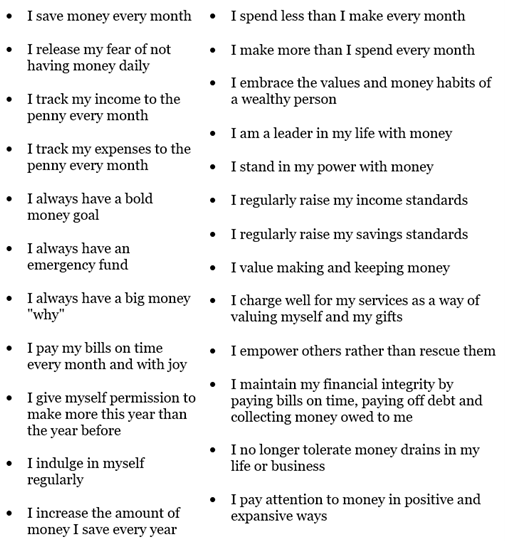
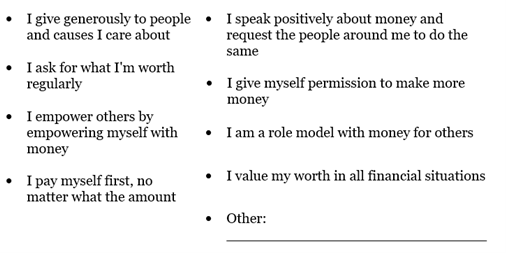
The 7 statements would then need to be prioritized, writing them in on the following page and posting it where you can see it daily. These statements support the beliefs and actions that lead you towards creating the new, empowered money legacy you desire and deserve! (Get printable version of this Exercise in the Project Study Section)
Wealth is a mental state.
It’s all a matter of perception.
We may have money in the bank or in the stock market, but the universal thought is “I don’t have enough.” Do we really have the money we think we have now that we have electronic transactions, and our government just keeps printing more money?
We have a tendency to give money a lot of power and even give away our personal power to money. We define our success based on how much or how little money we make.
We have a “lack” mentality in our society. We can never have enough of the latest fashion, the hottest pair of boots, the next version of software, or the newest iPhone.
We are taught to consume, and advertising persuades us that we require more. What matters most to me at the end of our lives, I believe, is who we loved and how we lived with integrity and service. This country requires a more conscious economic system.
How to Change Your Money Story
Take action to bring about change. Set the goal of learning as much as possible about money. Take a money class, seek out a coach who uses inquiry, or ask a trusted friend to talk with you about what is holding you back.
Get clear on the money story you’re telling yourself and others. Recognize your money-related thoughts, beliefs, and fears, as well as what you’ve been carrying around since childhood (your money legacy). If the story isn’t empowering you, decide to change it.
To overcome fears and find the support you need to move forward, read Suze Orman’s books or take a class. Our attitudes toward money, as well as our emotional attachments to it, influence how we spend and manage it.
What does it take to create a new money story that serves your life and allows you to grow your business?
Determine what is preventing you from moving forward.
Ask a friend to assist you in clarifying your work, its value, and your salary. Know what you have and how much money you’ll need to cover your expenses.
Set savings goals and automate it so that even as little as $25 is saved each month. It will add up before you know it.
Today marks the beginning of the rest of your life. If you’re concerned about not having enough money to live on as you get older, start saving now.
Start a Prosperity Journal
Begin a “Prosperity Journal” to investigate your relationship with money. Write about what works for you, what feels good, and when and where you feel frustrated, powerless, or just not right. Make a list of what you are grateful for in this journal every morning. Make a list of everything you can think of every day. On one of her shows, Oprah stated that she said a prayer of gratitude every time she stepped down the elevator to the stage. She discusses how gratitude has always been an important part of her life. Begin practicing your gratitude!

Exercise 4:1: What’s Your Money Story?
1. Is there a defining moment in your family’s financial history?
2. So, what would you say overall is the money story you grew up with?
3. How has this shown up in your life?
4. What is there to forgive?

Course Manual 2: Expansion vs. Contraction
It’s no surprise that our money values, beliefs, and thoughts – our “money mindset” – have a profound impact on every aspect of our lives, including our professional ones.
When it comes to money you have either an Abundance Mindset with expansive thoughts of (abundance, peace, freedom) or a Scarcity Mindset with contractive thoughts such as (fear, stress and lack).
It is important to note that your money mindset has nothing to do with how much money you earn or have. There are wealthy people who have a scarcity mindset, believing that there isn’t enough money and that they will never have enough. And there are people with few possessions who feel blessed, abundant, and wealthy on a deep level.
The majority of us fall somewhere in the middle.
Just as our mind expands or contracts so does money.
Expansionary vs Contractionary Monetary Policy
In general, contractionary monetary policies and expansionary monetary policies involve changing the level of a country’s money supply. Expansionary monetary policy simply means expanding (increasing) the supply of money, whereas contractionary monetary policy means contracting (decreasing) the supply of a country’s currency.
Monetary Policy Expansion
When the Federal Open Market Committee in the United States wants to increase the money supply, it can do one of three things:
• Open Market Operations are the purchase of securities on the open market.
• Reduce the Federal Discount Rate.
• Reduced Reserve Requirements.
All of these have a direct impact on the interest rate. When the Fed purchases securities on the open market, the price of those securities rises. We saw in my Dividend Tax Cut article that bond prices and interest rates are inversely related. Because the Federal Discount Rate is an interest rate, lowering it effectively lowers interest rates. If, on the other hand, the Fed decides to lower reserve requirements, banks will have more money to invest. Because the price of investments such as bonds rises as a result, interest rates must fall. Whatever tool the Fed employs to expand the money supply, interest rates will fall and bond prices will rise.
Increases in the value of US bonds will have an impact on the currency market. Rising bond prices in the United States will prompt investors to sell those bonds in exchange for other bonds, such as Canadian bonds. As a result, an investor will sell his American bond, convert his American dollars to Canadian dollars, and then purchase a Canadian bond. This increases the supply of US dollars on the foreign exchange market.
Because the lower exchange rate makes American-made goods cheaper in Canada and Canadian-made goods more expensive in America, exports will rise while imports will fall, causing the trade balance to improve.
The cost of financing capital projects is lower when interest rates are low. All else being equal, lower interest rates lead to higher investment rates.
What We’ve Learned About Monetary Policy Expansion:
• Bond prices rise and interest rates fall as a result of expansionary monetary policy.
• Lower interest rates encourage more capital investment.
• Lower interest rates make domestic bonds less appealing, so domestic bond demand falls while foreign bond demand rises.
• The demand for domestic currency falls while the demand for foreign currency rises, causing the exchange rate to fall. (The domestic currency’s value is now lower in relation to foreign currencies.)
Monetary Policy Contraction:
• The Federal Open Market Committee (FOMC)
• Open Market Operations are the sale of securities on the open market.
• Increase the Federal Discount Rate.
• Increase the Reserve Requirements
What We’ve Discovered So Far About Contractionary Monetary Policy:
• Bond prices fall and interest rates rise as a result of contractionary monetary policy.
• Higher interest rates result in lower capital investment.
• Higher interest rates make domestic bonds more appealing, so demand for domestic bonds increases while demand for foreign bonds decreases.
• The demand for domestic currency rises while the demand for foreign currency falls, causing the exchange rate to rise. (The domestic currency’s value has risen in relation to foreign currencies.)
• A higher exchange rate reduces exports, increases imports, and reduces the trade balance.
An Expansive or Contractive Mindset
Contraction:
Noun: The process of becoming smaller
Synonyms: Shrinking, reduction in size, shrinkage
Expansion:
Noun: The action of becoming larger and more extensive.
Synonyms: Growth, increase in size, enlargement, extension, augmentation, development, evolution
Investigating the State of Contraction
Most of us have experienced contraction at some point in our lives. Based on my own observations, it appears that we are constantly ebbing and flowing between contraction and expansion, and that one cannot exist without the presence of the other. Increasing our awareness of when and how we are living in our contracted state appears to be the catalyst that propels us forward into the transformative space of expansion.
Let us examine the various manifestations of the state of contraction in our daily lives to gain a better understanding of it:
• As a result of anxiety and fear
• a lack of self-esteem or self-love
• a lack of confidence
• Staying small in order to feel safe
• We do not want to leave our comfort zone and thus do not experience growth.
• Living a routine and unfulfilling life
• Are you afraid of change or making important decisions?
• Fear of standing up for oneself or speaking one’s truth
• Maintaining old habits and thought patterns (for example, “I’m not deserving/I’m not good enough”)
• Allowing your underlying beliefs to guide your life
• Giving up on yourself for the sake of others’ happiness
• You don’t want to look at what’s causing you to be stuck.
• Not being in touch with or trusting your true self
• Fear of appearing to be too big or too much for others
• Concerned about shining too brightly or making others uncomfortable
• Fearful of judgment from others, but also stuck in a loop of self-judgement
One of the most important, and possibly the most debilitating, reasons we are in a state of contraction is that it is what we know and where we find comfort. It may have served as a safety mechanism as a child, and as adults, we are still holding on to the underlying belief that “I need to be this way in order to survive.” Although, for the time being, it is having the opposite effect of what it was intended to have.
Other examples of contraction related specifically to money:
• Avoiding paying your bills – Do you ever find yourself putting off or avoiding paying the bills? – Quite often, it is not about paying the bills, it’s about your limiting beliefs showing up or your resistance around money or you are playing small because you’re shrinking in fear.
• Not having enough money in the bank – By not having enough money in the bank to pay the bills, you may find that you’re judging yourself or beating yourself up about it. Instead, create a plan and start paying off what you can each month until you get back on track again.
• Owing someone money that results in avoiding them because you are ashamed or embarrassed – It can be extremely uncomfortable if you owe a friend or a family member money. Even if you have every intention of paying them back as quickly as possible, you may be struggling just to get by, making it seem impossible to repay them. This can cause you to feel ashamed or embarrassed to even talk to them. I suggest that you have a conversation with them and let them know that you still intend to pay them back and commit to a plan to do so, – even if it’s just $100.00 a month until it’s paid off. -Most likely they will understand what you’re going through and except those or similar terms. This may just restore your relationship.
• When someone owes you money – When a friend or family member owes you money, this is an example of you giving your power away and letting this person take advantage of you. It is necessary to have defined boundaries set up from the get-go with everyone in your life. Stand in your power!
• No savings in the bank – If you have no money in savings, this is often related to deservability (not feeling that you deserve to be wealthy) or a reflection of being stuck in the cycle of lack and scarcity. A simple step you can take to change this is to make a point to start saving a portion of your income each month, even if it’s only 5%. This can really allow you to start feeling more in control and confident in your ability to generate or manifest money in your life. You can slowly start increasing the amount you save each month. You’ll be amazed at how quickly your savings account will start growing once you make the commitment to start saving. If having no money in your savings account is due to the lack of deservability you will need to work on this first.

Case Study on Contraction:
A women named Anita was working an event and she appeared to be very uncomfortable.
The initial reason was because she reported a chronic tight neck; however, there seemed to be more to it.
(Chronic pain typically is emotional.)
It was revealed through questioning that the emotion beneath the tightness was fear.
Anita had an underlying fear of not being able to support her children due to events in her childhood, despite being in a comfortable financial situation, it was discovered.
She had limiting beliefs about herself and found herself doubting her ability to succeed in the future.
This is an example of what contraction looks like.
Investigating the State of Expansion
Expansion is the polar opposite of contraction. It’s like taking a deep breath of fresh air, a sense of filling our lungs to break free from the ever-restricting state of contraction. Let us now consider the various ways in which Expansion can manifest itself in our daily lives:
• Having faith in your intuition
• Realizing your full potential
• Be opened to change and the growth that comes with it.
• Being willing to receive
• Being open to new experiences
• Believing in yourself, your journey, and your destination
• Clearer thinking about future goals and a clearer path to achieving them
• Self-transformation and self-realization are encouraged.
• Allowing your light to shine
• Accepting your true self
• Vulnerability
• valuing self-compassion and deep love
• Being Fearless
• Having a sense of liberation
• Opening oneself up to new ways of living and/or thinking, a sort of rebirth
The Expansion state is all about believing in yourself, your intuition, and being in the universal flow of life. A lovely place to live, but not always easy to get to. How do you go from Contraction to Expansion? By becoming aware of where and how they are contracting, believing in themselves, and finding the courage to keep moving forward.
Other ways to compare Expansion vs. Contraction
Another way to compare Contraction vs Expansion is to consider the various thoughts and beliefs associated with each state. Thoughts and beliefs associated with contraction have a heaviness to them, whereas those associated with expansion have a positive and uplifting lightness to them. When you read through the thoughts and beliefs that accompany each state, notice how you feel differently.
• I’m not worthy.
• I am not intelligent enough.
• I don’t think I deserve to be happy.
• I don’t belong here.
• Nobody comprehends what I am saying.
• I’m too afraid.
• I have flaws.
• I am frail.
• I am helpless.
• I’ll never be able to get out of this rut.
• I can’t_______________________ (sing, dance, play sports, write)
• There will never be enough money for me.
• I will never achieve success.
• I’ll never live a fulfilled or meaningful life.
To shift these thoughts and beliefs into a state of expansion, we must first bring our attention to what is keeping us stuck, what old beliefs they are clinging to, what fears they we unwilling to let go of, and what old stories are we replaying over and over that keep us small and comfortable.
The great news is, once you develop a plan to either make more money or to pay off your debt, you can start moving into expansion. The beauty of it is that you don’t have to be debt-free or financially successful to start feeling expansion, all you have to do is start working your plan.
Expanded ideas/beliefs:
• I am a Fantastic Human Being.
• I am powerful.
• I am strong.
• I am knowledgeable.
• I am deserving of happiness.
• I am a brave person.
• I overcame adversity.
• This moment will pass, as will this feeling.
• I am capable of realizing my ambitions.
• I have a prosperous life.
• I have faith in myself.
• I believe in my instincts.
• I am thankful.
• I am deserving of living a meaningful life.
• I am capable of completing difficult tasks.
• I am gifted.
• I am loved.
What Contraction Looks Like at Work
As professionals, we are constantly shifting between contracted and expanded states throughout the course of our workday. In my own experience, I have seen myself on some days full of confidence and ready to tackle the workday one task at a time, and on other days I have found myself doubting my abilities. Fear begins to creep in. Can I do it? Is it even possible that I’m any good at this? Who am I to think I can change people’s lives? When this contracted mindset tries to take over, awareness is essential. If we can recognize when it is attempting to settle into our thoughts, we can simply acknowledge what is happening and reframe our perspective into one of an expanded mindset.
We can practice this in a variety of ways, including journaling, visualizations, mirror work, mantras, and, once again, trusting ourselves and moving forward with courage into that beautiful state of expansion. The journey of self-work and self-realization that it entails is always worthwhile.

Exercise 4:2: Moving Into Expansion
Discussion Questions- Go through these questions as a group:
1. In what areas of your life have you witnessed yourself contract?
2. In what areas of your life have you witnessed yourself expand?
3. What helped you move forward from contraction into expansion?

Course Manual 3: Clear Clutter
Decluttering and getting organized around money is a powerful first step to changing the direction of your money life.
It FEEL GOOD TO BE ORGANIZED, especially when it comes to something as important as money. This training will assist you in BEING and FEELING organized. You’ll have more room in your wallet, you’ll be able to tie up loose ends, and you’ll begin to feel better. SPACE is created by decluttering. It’s nice to have some breathing room!
The impact of clutter in your life
Clutter appears to be relatively innocuous, doesn’t it? And, harmless or not, it appears impossible to handle for many of us when life moves at such a breakneck pace.
A cluttered home or office, on the other hand, equals a cluttered mind.
According to Psychology Today, clutter in our homes and workplaces makes us feel anxious, helpless, and overwhelmed.
And Americans spend millions of dollars on medications and other solutions to alleviate their anxiety, helplessness, and overwhelm.
However, clutter is rarely recognized as a significant source of stress in our lives. Fortunately, unlike other more widely recognized sources of stress, clutter is one of the most easily remedied life stressors.
Dishes in the sink, clutter on every flat surface, family belongings and toys strewn about the house, closets stuffed with items we rarely use; this clutter not only makes our homes look bad, but it also makes us feel bad.
At least, that’s what UCLA researchers discovered after studying the relationship between 32 families and the objects in their homes. Clutter, it turns out, has a significant impact on our mood and self-esteem. Anthropologists, social scientists, and archaeologists from UCLA discovered:
• The more stuff a woman has, the more stressed she is.
• The more dishes that accumulate in the sink, the more stressed-out women become.
• Even families who want to reduce clutter are frequently emotionally paralyzed when it comes to sorting and pitching items. They can’t let go of sentimental attachments to objects or believe their possessions have hidden monetary value.
If stress and anxiety aren’t enough, dealing with clutter, moving it around, and looking for misplaced items in a disorganized home takes up a lot of time. According to studies, Americans spend an average of 2.5 days per year looking for things. Millennials are also shown to be twiddling their thumbs.
Furthermore, we spend $2.7 billion per year replacing items, and more than half of us are frequently late for work or school due to frustrating searches. Then, when we finally arrive and begin our day, our effectiveness is diminished for minutes, if not hours, as a result of the emotional state we are in as a result of these occurrences.
Consider all of the things you could do with that time and money.
A great place to start is to de-cutter your home.
This may seem overwhelming for some.
Cherry Dale, a financial coach with the Virginia Credit Union, compiled this list. She suggests that you don’t think of decluttering your home as a chore.
Consider it like putting money back in your pocket or helping others. While some of your items may be worn out and only fit for the trash can, there may be many others that you can sell to a consignment store, sell at a yard sale, or even donate to charity.
“As you’re donating or selling, you can apply what you’re making to your financial goals. To wrap it all into one thing. Declutter your house and improve your finances along the way,” Dale advised.
Dale also suggests that if you come across something sentimental, such as a doll you bought for your now-25-year-old daughter, take a picture of it. This can make it easier to let go.
Even if it’s no longer collecting dust in your closet, you’ll have a reminder. Similarly, for your finances, find a picture of what you are no longer spending money on and place it next to a picture of your financial goal. So, that’s what you’re saving this year.
A Clutter Test
One way to determine if your home or workspace is too cluttered is to consider how difficult it is to keep your home or office tidy. If you spend a lot of time straightening up your house on a regular basis, you probably have too much stuff.
Our closets, cabinets, and chests of drawers frequently house items we never use, while our most-used items end up on countertops, other surfaces, and the floor. It’s no surprise we can’t find them. This has a serious impact on mental clarity and productivity.
Are you organized, with enough space in your closets and drawers to store the items you actually use until you need them? Or are you guilty of stuffing your storage units to the brim rarely opening them and seeing what’s inside?

How to De-clutter Your Workstation
Examine your workstation thoroughly. To get a sense of the big picture, you may need to get up and walk a few feet away from your workstation.
While it is acceptable to use office supplies and keep a few personal items at your workstation, you do not want to be drowning in these items while working! Remember, your workspace is supposed to be a place where you can do your work… and isn’t a magnet for clutter.
How does your workstation look? What’s on top of, beneath, behind, and beside your workstation and chair? What office supplies and materials do you use on a daily basis? Which items should be kept elsewhere in your office? What items should be saved?
You should be able to identify a few items that should be removed, relocated, or recycled.
You might be surprised at how this simple exercise can transform a cluttered environment. Simply removing a box of old files from beneath your desk, recycling a large stack of old journals or magazines, or moving several reams of printer paper and assorted office supplies to your storage closet provides you with more space to type, write, review, and move around in general.
Make a De-cluttering Checklist
If you want to keep your home office in good shape, you should incorporate a series of regular decluttering tasks into your work routine.
Create a simple checklist to keep track of these tasks. Aim to clean these items on a weekly or monthly basis to prevent materials from piling up.
Looking for some personalized decluttering ideas? Make a mental note of the areas in your home office that tend to attract or accumulate clutter over time.
If your office appears to be a clutter magnet, schedule weekly decluttering sessions at the end of each workweek. You can remove items, for example, every Friday afternoon after lunch, so you have a neat and tidy space to look forward to the following week.
Here are some decluttering tasks to consider adding to your to-do list:
• Remove any personal or household items that have made their way into the home office.
• Declutter the top, bottom, and sides of your desk/workstation.
• Take out any old or expired paper or digital files.
• Discard any old project, program, or assignment materials.
• Confidential paperwork and materials should be shred.
• Clear out your email folders and accounts.
• Remove files and folders from your computer’s desktop.
There’s nothing quite like looking around your house and office and seeing it exactly the way you’ve wanted it to look for so long.
What would it be like to wake up every day with the peace of mind and soul that comes from having your home exactly the way you want it – where you have control over your belongings, not the other way around.
And it only gets better. Decluttering has the effect of opening door after door for you.
• Decluttering frees you from the shackles that have been holding you back.
• Decluttering ignites a fire of energy within you that you were unaware you possessed!
• The tension in your face and body will dissipate, and your confidence will resurface.
When you get your life in order, things start to fall into place in every aspect of your life!
Clutter and Your Money
When it comes to clean and organized homes, money mindset also plays a significant role. First, as UCLA discovered, many people have a difficult time getting rid of things because they place an unrealistic monetary value on their possessions.
Making space in your home and having empty drawers and closets allows wealth to come to you. This does not simply imply emptying them until you buy more. It’s the idea of not filling them back up after giving things away or having garage sales, because this communicates to the universe that you are open and ready to receive more money.
Whether it’s the universe or our own subconscious, when we don’t have room for anything else in our closets or lives, we aren’t as motivated or mentally prepared to go to the next financial level.
When we focus on developing our organizational habits and make empty spaces in our cupboards, closets, and drawers, this creates space for more money to come into our lives.
Your spaces will become cluttered if you have a scarcity mindset. A scarcity mindset keeps you cleaning your own house when you’d get a far better return hiring someone to do that work while you operate in your personal zone of genius.
It’s time to get organized and signal that you’re ready for financial independence.
“From personal experience, when I doubled down on my already extremely organized habits and made empty spaces in my cupboards, closets and drawers, within 6 months my business revenues were higher than ever, and I doubled my personal salary.” – Tobi Fairly

The Advantages of Getting Rid of Money Clutter
Before you become overwhelmed by the prospect of having to do more work, consider the benefits of decluttering or cleaning up your house, finances, garage, or anything else that could use a facelift! Going forward, as we discuss what we need to do to declutter or organize our financial lives, I want you to imagine what it will look like, feel like, sound like, smell like, or even taste like (LOL) when you’ve completed the task.
1. You will feel a sense of accomplishment as a result of your efforts.
2. The space or area you worked on will appear more organized.
3. There will be a freshness or cleanliness in the air that pervades the room.
4. Your body, soul, and spirit – yes, I said it – will experience a sense of lightness or weightlessness.
5. You will have renewed vigor to pursue your life goals.
6. Your stress level will drop significantly, and you will sleep better as a result!
7. You will discover hidden treasures – information that you have been looking for a long time.
8. You will be more productive and creative now that the mess is out of the way.
9. You save cash. You’ll almost certainly find expenses you can cut or accounts you didn’t realize you had!
10. Eventually, you’ll have order and control over a previously chaotic area of your life, such as money.
10 Steps to Declutter Your Finances
How financially organized would you say you are? Being financially organized is frequently regarded as a drudgery or as an activity that would detract from the joy of living. Being financially organized, on the other hand, is essential for success in money management. It would also reduce the amount of stress in your life. These financial decluttering tips will assist you in becoming financially organized and maintaining order (i.e., keeping the clutter out of) your finances.
1. Know where you keep your important documents.
Most people are often unprepared in this area and can waste a significant amount of time trying to locate important documents when they are required. Take the time to find any permanent documents, such as financial, legal, or other documents that are valid for more than a year. Wills, powers of attorney, insurance policies (life, health, disability, critical illness, home, car, or business related), mortgage agreements, title deeds, and other documents are examples. Non-financial documents, such as birth and/or baptism certificates, immunization records, educational certificates, passports, and so on, may also be included. Place these documents in a secure location and ensure that your spouse, executor of your will, and any other responsible and trusted person knows where and how to access them.
2. Create a filing system
No matter how electronic the world becomes, paper bills and other important documents will continue to be issued in hard copy. To keep the paper piles organized, make a folder for each of the following: Checking and savings accounts, retirement and investment accounts, credit card accounts, loans, personal lines of credit, tax returns, bills and receipts by vendor or month.
3. Make use of your computer
Your computer is an excellent location for filing e-bills and e-statements, which you can organize by organization or type of account. It is also the most convenient way to pay bills, save, and invest. To keep your finances in order, make good use of both.
4. Have a drop box
Often times we get the mail and just drop it on the first flat surface we come to when we get home. I am as guilty of this as anyone else. This is a hassle because I then have to clear the space when it’s time to have family meals. So why not have a drop box? Most homes have a designated place for their home office or even just a small desk space in a room where you can work. Wherever that is, having a location to go to and drop your mail helps reduce the clutter. At another time, you can open the mail and sort them.
Consider three simple categories for now: (1) Trash or Recycle – what’s not needed dump right away, (2) To Pay – keep upcoming bills in one location, and (3) To File – either do this right away or place in the “to file” slot for later.
5. Clear out the clutter in your wallet.
This can be a difficult task. Unwanted receipts can fill up our wallets at times. Sometimes we can find our wallets overflowing with papers! Most of us do, however, you will want to keep them in order to record your financial activity – you can track your current and future cash flows. You can keep your purse or wallet from becoming cluttered by removing receipts and placing them in a small box on your desk until you can record them (which by the way should be done on a weekly basis). Once you do this, you’ll discover that having a clutter-free wallet makes it easier to find the cash or card you need when you need it. Also, you want a nice place to keep your money to “honor it”- so if you need to, buy yourself a beautiful new wallet – your money deserves it!
6. Involve your family in the process.
You may believe that you must go it alone, but you do not. When you involve others, the work becomes lighter and more enjoyable to complete. Have a filing day, enlist the help of your children or spouse – have someone shred or destroy all the papers you no longer need, and someone else label and file bills and statements by organization, month, or whatever order you prefer. As a thank you for your assistance, prepare their favorite meal for dinner or plan a special family outing.
7. Establish financial objectives.
Make a decision about what you want to do with your money. How much money you want to save, donate, invest, spend, or borrow. Also, how much money do you make now? Is it enough, or do you need more? If you evaluate this and discover that your cash flow is frequently negative, review your spending and, where possible, reduce it, but also consider whether you need to find ways to increase your cash flow. Involve your family in goal setting; problems frequently arise due to a lack of communication. Setting spending limits and saving targets is a good place to start. If this is agreed upon, it will relieve the stress of trying to make ends meet.
8. Automate, automate, and automate some more.
If you use the technology available to you in this day and age, you can make your life a lot easier. Setting up standard weekly or monthly transactions can help you save time and stay organized by reducing the amount of time you spend managing your finances. Automation would eliminate the need to remember when certain financial transactions are required, as well as avoid unnecessary and unwelcome late payment fees. Consider first setting up transfers to your savings and investment accounts, and then payments to your mortgage, any other debt, and utilities. However, even with automation, it is still necessary to monitor your cash flow.
9. Conduct regular financial audits.
As I previously stated, it is a good practice to keep track of your financial activity on a weekly basis. This is something I do on a spreadsheet because it is my preferred method. You should think about getting a personal finance app to track your spending. The weekly review includes not only recording financial activity but also paying upcoming bills. Each month, you must also reconcile your bank accounts. This is more than just a check-off activity; it is a way of verifying the accuracy of what the bank has recorded. When there are discrepancies, they can be resolved quickly. Quarterly reviews are also required, and this is an excellent time to clear out any clutter that has accumulated. Take a snapshot of your finances – look at your net worth – once a year and compare it to the previous year. Have you made any financial strides? Did you spend more this year than the previous year(s)? These should be reviewed and discussed with your spouse as well as your financial advisor.
10. Have a good time saving money.
I believe you should save with a purpose in mind. You’ve been told to keep that emergency fund well-stocked, and that if it is ever depleted, it should be replenished as soon as possible. That can have a negative impact and add stress to the task of managing your money. Consider a container (such as a large bottle with a top opening) that can be kept in a secure location but is easily accessible. Empty your wallet of all loose change into that container at the end of each week. Encourage everyone in the family to participate.
These suggestions are intended to serve as a starting point and a guide for becoming financially organized.
Don’t let your financial situation stress you out. Keeping organized is essential if you want to begin mastering your finances.
“A simple life is not seeing how little we can get by with—that’s poverty—but how efficiently we can put first things first. . .. When you’re clear about your purpose and your priorities, you can painlessly discard whatever does not support these, whether it’s clutter in your cabinets or commitments on your calendar.” – Victoria Moran, Lit From Within: Tending Your Soul For Lifelong Beauty

Exercise 4:3: Action Time: Remove Clutter Exercise
What steps are you going to declutter items on a regular basis?

Course Manual 4: Forgive Past
Many of us want to have a bright, shining future: filled with hope and clarity and empowerment when it comes to our financial futures.
But something seems to be holding us back.
It is as if heavy chains are pulling us backwards, into our past, anchoring us to outdated money beliefs, shameful secrets, unresolved relationship dynamics, and even practical To Do’s that we haven’t completed.
As much as we desire a new future, we simply can’t move forward until we pause, looked into our past, and address the issues that are tying us to it.
Forgiveness… finish… and letting go are the topics at hand.
The real problem…
In many cases we already know what is holding them back:
“I haven’t paid my taxes in three years, and I’m dying of embarrassment.”
“My inheritance caused a schism in my family, and I can’t see my brother without arguing about money.”
Other issues can be more subtle, and don’t come to light until digging deeper into our past:
“That time when I was seven and stole money from my mother’s purse still haunts me.”
“Wow, I had no idea how much my church’s teaching that “money isn’t spiritual” had hampered my career!”
People admitted sheepishly, one by one, to these issues from their past. They usually assumed they were the only ones with a Big Dark Secret or unfinished business involving money, and they sighed with relief when they discovered that we all have “money stuff” from the past that needs to be completed, released, forgiven, and grieved.
As we delve deeper into our Money Story, you will most likely come across pieces that we are ready to let go of. Shame that hurts or blame that zaps our energy. We have loose ends that we desperately want to tie off. We’ve outgrown our money beliefs.
On one level, this is about finishing things: making that phone call, mailing that letter, and so on.
But what if it’s something subtler and more internal? So, how do we let go? How can we let go of the old baggage that’s still hanging around with us so we can get current with our Money Story and move forward?
This is the delicate territory of forgiveness, completing, and letting go. We come full circle here, back to Money Shame… and let it go. We transform our shame gradually, baby step by baby step, with as much mindfulness and courage as we can muster. We mourn, forgive, finish, and let go.
On the other side of this transformation, we are hard-wired for wholeness. We are irresistibly drawn to it. When we summon the courage and compassion to forgive within your financial relationship, you will realize this profoundly empowering truth: Your past does not have to equal your future.
“Practicing forgiveness means letting go of self-righteous anger, blame, and resentment. That’s hard. The combination of self-righteous anger, blame, and resentment is one of my favorites. Umm. Umm. Umm. Drink it up! Unfortunately, I think it’s toxic and eats you alive from the inside. It might go down like a milkshake, but it burns up your insides like battery acid.” ~ Brené Brown
Forgiveness always has two sides: the letting go and the moving forward. Looking back and taking a step forward. Creating and releasing.
It may appear paradoxical, but I’ve seen it time and again: when we look back at our past pain, honor it, and let it go, we can move forward in new, more liberated ways.
We let go of old money beliefs — and choose which new beliefs we will carry forward with us into the future. We not only let go of old wounds, but we also discover unexpectedly wonderful gifts.
A word of caution: forgiveness is difficult work. It’s an adventure. Non-linear, fluid, deeply personal, frequently mysterious, and undertaken by a brave few. But the rewards are enormous, my friend.
I’m not just referring to the ability to mail a letter or file a tax return. I’m referring to deep, soul-level healing. Energy reserves have been liberated. Compassion for yourself and others has greatly increased.

Understanding Shame
Almost everyone has felt financial shame at some point in their lives. It’s the sense of embarrassment that comes from having too much or too little money. Money shame can paralyze you and cause problems with your financial decisions.
In its most basic form, shame is the feeling of being unworthy, unlovable, and not good enough. Shame symbolizes isolation, rejection, and excruciating physical pain.
Some of us experience shame simply by hearing the word “shame.”
Shame is a huge topic, especially in the field of counseling.
Shame has an impact on our minds, brains, bodies, relationships, and spirits.
Shame is a painful feeling that is felt viscerally and physically, but it is often unspoken.
You will frequently feel shame as your shoulders collapse, your head hangs low, your chest hollows out, or your sense of self shrinks within your body.
Why Is It Necessary to Understand Shame?
I enjoy the topic of shame because it has helped me understand myself over time. The study of shame has given me a better understanding of my client’s perplexing, contradictory, and, yes, even immoral thoughts and actions that society and family find repulsive.
Shame is a major topic. It’s also a difficult subject to broach.
To reduce shame, however, you must approach it with openness, curiosity, love, and compassion.
Shame does not have to be a way of life for you.
I’m not saying you should deny your experiences with shame, but rather recognize when you’ve moved into or are living in a chronic state of shame.
I have a great deal of empathy for anyone who is struggling with feelings of shame.
Shame is frequently found at the heart of psychological distress, buried beneath layers of defense mechanisms, mental illnesses, addictions, and lost or overwhelming relationships.
Shame is a relational emotion.
Shame is a relational experience of failing to meet the standards of others or yourself and then feeling rejected as a result.
Shame is defined as the sensation of being judged negatively.
Shame is not something you choose to feel; rather, it is an automatic reaction to a situation in which you do not feel accepted for who you are at that point in your growth and development.

Money Shame
Have you ever considered the relationship between financial shame and financial well-being? Financial shame can have a significant impact on your finances as well as your ability to communicate about money.
Financial embarrassment emerges in childhood.
As children, you are prone to feeling ashamed about your wants, desires, and interests because you lack the ability to meet them on your own.
You rely on your parents to meet many of your material needs with the money they have access to.
What you can’t know or fully comprehend as a child are your parents’ financial constraints.
You have no knowledge of or understanding of your parents’ financial situation.
This creates numerous opportunities for miscommunication between parents and children regarding money and meeting your needs.
When parents aren’t aware of this dynamic or are dismissive, demeaning, or disorganized about it, it can make you feel bad about asking for what you want.
When you get a “no” to what you want, you may feel ashamed. This shame extends to knowing what you can and cannot have, as well as feeling insecure about your ability to achieve your goals over time.
It would be easier if your emotional reaction to your parents and getting your needs met were limited to a single emotion, such as shame, and that nothing else was going on.
However, as a child, you are navigating getting your own needs met as you interact with your parents about money.
You have no understanding of what is going on with your parents and their ability to be aware of their own and their children’s needs. Not to mention that children are unaware of their parents’ embarrassment over money and being responsible for providing care for their children.
Many parents feel compelled to give their children a better life than they had for themselves.
Much of this is centered on experiences that necessitate larger sums of money than were available to them as children.
All of this adds up to a potentially significant amount of financial shame.
Identity And Financial Shame
Money, like shame, is a relational experience by definition. It isn’t just about your personal finances.
You use money to express yourself and your perspective on the world.
You are aware that others will form both positive and negative opinions about how you use and interact with money in your life.
Keep in mind that money-love and security are all about having a healthy relationship with money. Will go into this more later in the Workshop.
There is no ultimate goal of achieving ultimate financial love and security, but rather a growing experience of love and security in relation to money.
It’s fascinating to assess the fields of sex therapy and eating disorders because they provide significant insight into how people develop shame around issues related to their identity, such as their sexuality and eating and body image patterns.
This is far more serious than when someone steals your credit card information and uses it to purchase items you would never buy yourself. Remember the Friends episode where Monica is perplexed about who she is because someone steals her credit card and appears to be living a much more exciting life than Monica?
That exemplifies how money and identity are intertwined.
The sense of violation associated with stolen financial information helps us understand and remember how personal your relationship with your financial life is.
Your financial situation has an impact on how you perceive yourself. It has an impact on what you buy and how you present yourself to the world.
In their lives, everyone has a deep and very personal relationship with money.

How Does Money Shame Appear?
Let’s take a look at how financial shame sounds, looks, and feels.
You’re surrounded by financial shame in every aspect of your life, like a fish in water. It is the water in which you swim. As a result, you may not even recognize financial shame when it occurs to you.
Money shame affects people of all races, classes, religions, genders, and sexual orientations.
Examples of Financial Shame
Please keep in mind that I am not saying you should be ashamed of any of these facts.
These are all issues that are common – either I have either dealt with personally or assisted clients in dealing with.
The intention in naming these realities is to help you break free from isolation and alienation and re-establish relationships with yourself and others who matter to you.
• Not having enough money to pay your bills or being in debt
• Making financial mistakes, such as bad investments or incurring credit card debt.
• Falling behind on taxes and unable to find a way out.
• Having more money than everyone in your social circle.
• Receiving a large inheritance, not knowing what to do with it, and being told to be grateful.
• Being unable to discuss money with your spouse.
• Being overlooked for a promotion.
• Crossing social class boundaries and being expected to know the social rules of that class while attempting to figure it out for yourself.
• Being chastised for how much or how little you work.
• Being chastised for the nature of your work.
• Financial documents such as budgets, balance sheets, insurance plans, taxes, and estate planning documents should be avoided.
• Your financial identity being stolen by a family member, friend, or an unknown person.
• Being monetary objectified “Oh, because you are wealthy, middle-class, or poor, you can…”
• Growing up in a financially conflicted family.
• Growing up in a family where everything on the outside appeared to be in order, but everything on the inside was a financial disaster.
• Money is the root of all evil, according to religious or spiritual teachings. Money is filthy, bad, or otherwise undesirable.
• Being accused of being ungrateful, greedy, princess-like, overly jealous, lazy, and so on.
• Failure of a business and financial strain.
• Being financially exploited or ignored during a divorce.
• Being embarrassed about your credit score.
• Having a parent who becomes financially dependent on you when you are young.
• Being told that you don’t make enough money to work with a financial advisor or planner.
• Cultural oppression of your people, exploitation of your labor, and, in the worst cases, enslavement for your labor.
Money shame ranges from innocuous and barely noticeable disapproval facial expressions between husband and wife to large-scale traumas perpetrated by one group of people on another.
While this list does not even come close to naming all of the different expressions and scenarios that have left my clients with financial shame, it does provide a broad sample of the potential ways that shame can be evoked around money.
However, the word “shame” does not appear once in any of these encounters. Nonetheless, it is present in all of them.
How Has Shame Affected Your Financial Situation?
Take a moment now to consider what experiences and people in your life have caused you to feel ashamed about money.
Take note of any physical sensations that arise for you.
Bring compassion and warmth to the area of your body where this is manifesting. See if this helps to alleviate some of the shame response.

Case Study: Jody’s Story on Overcoming Money Shame
(Source- www.maggiebakerphd.com)
Jody loved her job as a high school English teacher. She got to read books she liked and teach curious, motivated students. What Jody was not so engaged with (some people would call this avoidance) as her money.
When a bill came, she’d toss it on a table and convince herself she’d pay it later. But the stacks kept growing until they began to fall over and litter the floor. She’d sweep them up, grab another table and start new piles.
Her behavior contradicts her belief in financial independence and reliability. If she were talking to a financial therapist, the therapist would challenge her to figure out why she is sabotaging her financial well-being. The therapist might ask her to imagine those bill stacks growing and what that makes her feel in her body. She might say that her stomach gets tight, her shoulders slump down and she feels immobile. These bodily reactions are indicative of shame – that feeling of embarrassment, of feeling bad, unworthy, and helpless.
Jody and the therapist would then talk about what got stirred up in her mind and what painful past experiences he’s had involving money. This inquiry would then lead to the source of conflict that makes Jody so money avoidant.
After 10 sessions with her therapist, Jody was able to surface her money conflicts and put into action what she’d learned. Slowly the bill piles shrunk. Since she wasn’t using so much energy to avoid her money conflicts, she had more time for both her work and enjoying her money.
Forgive, Finish, and Let go.
Forgiveness is not about giving in. If we hold judgements -hurt and blame, we continue the assault on ourselves we remain wounded. We keep re-creating the pain and suffering. The fastest way to break out of this cycle is to forgive from the heart.
You must forgive yourself. Please forgive your parents. Please forgive that obnoxious collection agent. Please forgive the IRS. Please forgive society. Forgive your forefathers and mothers for what they did and did not do.
Let go of your anger, hurt, regret, and stuckness. Examine everything, bless it, thank it, and let it go.
You must forgive yourself… for being unorganized – Because you didn’t know any better. For knowing better but still doing it.
Grieve. Be sad about the money that has vanished. Grieve the end of a chapter in your life that came too soon. Be sad for the friendship you’ve lost. Weep for the paths you never took.
Forgive yourself… for not bringing in more money. Making more money than you’re comfortable with. For amassing debt. For choosing to be a stay-at-home mom over an entrepreneur. For choosing to be an entrepreneur rather than a stay-at-home mother. For failing to meet your parents’ expectations.
Complete any outstanding tasks. Tie up any loose ends that are draining your energy.
Forgive yourself… for the big and small things. For the obvious, subtle, and hidden.
Let go of your shame. Let go of the anguish. Let go of the guilt. Allow it all to go.
By holding on to these old beliefs, you will stay in a stuck pattern and continue to struggle and not get the results you desire. By “letting go,” you can create the space for new empowering beliefs to develop and for opportunities to show up that will assist you in reaching your personal and financial goals.
Easy Letting Go Exercise:
Take a deep breath and focus on the feelings that arise when you think about your current financial situation.
Then, ask yourself the next 3 very simple questions.
“Can I let it go?“
“Will I let it go?”
“When?” You can repeat this process until it feels lighter and lighter and ultimately dissolves.
This will free up energy for you, no act of forgiveness is too small.
So, here’s to forgiveness. Both large and small. For both yourself and others. Concerning money and more. And here’s to the beautiful, loving new world that awaits you on the other side.

Exercise 4:4: Forgiveness Letter Exercise
Hand out Forgiveness Exercise Document. (Access Here) Forgiveness Letter Doc
Have the participants fill in the blanks to the letter.
Now there are two options for the next step – As a group, have a burning ceremony outside in a self-contained space such as a fire pit or metal bucket and have a burning ceremony. Or as a group, go to the paper shredder and shred each of the letters.
Group Discussion: Have everyone share their experience – How they feel after this powerful forgiveness exercise (they don’t have to share specifics.)

Course Manual 5: Money Breakthrough
Shifting your money mindset with a money breakthrough will allow you to instantly up-level your confidence, create a new, empowered money mindset, and feel on fire about the special brilliance you bring to the world.
A money mindset is a manifestation of your monetary attitudes and beliefs.
How you do money is how you do everything and how you do everything is how you do money.
Your financial behavior is defined by how you handle money. Your financial behavior reflects how you have been reacting in the world. Your emotions and thoughts contain your response. You are likely to discover a common pattern or set of beliefs that underpin every aspect of your life based on your external actions.
Everything is interconnected. As a result, how you do anything determines how you do everything. Your external world reflects your internal world. Your inner world has an impact on how you present yourself in the world. A self-inquiry process will lead you to discover your perceptions of the world and of yourself. You can delve into discovering your core beliefs, whether through a financial situation, a relationship situation, or any other life situation.
The Power of Your Money Mindset
Your money mindset influences what you believe you can and cannot do with money, how much money you believe you’re allowed, entitled, and able to earn, how much money you believe you can and should spend, how you use debt, how much money you give away, and your ability to invest confidently and successfully.
It influences how you make important financial decisions every day. And it can have a significant impact on your ability to achieve your objectives. When you change your money mindset, you tend to make better decisions about how to overcome challenges. In this case, the power of positive thinking is extremely important.
A positive money mindset can help guide your behaviors in an unusually powerful way, whereas a negative money mindset can have the opposite effect.
How does one develop a money mindset?
Money mindset is heavily influenced by previous financial experiences. It’s possible that you learned financial etiquette from your parents or grandparents, but it’s also possible that you grew up in a home where money was a taboo subject. Based on your life experiences, you’ve either consciously or unconsciously developed a unique set of beliefs about money.
The good news is that your money mindset can be strengthened and/or changed based on the information you consume today, regardless of your background. Developing new attitudes – and reforming old ones – is absolutely possible by adopting a more positive outlook and regaining control over the aspects of your financial life that you can influence.
Understanding your money mindset and where it came from can aid in its transformation. Just as you would enter your coordinates into a navigator before embarking on a journey, you should be aware of and comprehend your current financial beliefs.
Knowing where you started helps you realize how far you’ve come as you shift your mindset. It’s like looking at the map and realizing you’ve already traveled 200 miles. The difference with money is that it is a once-in-a-lifetime journey. We never arrive at our destination. We’re just getting started. The journey is the destination.

Characteristics of negative and positive money mindsets
If you find yourself repeating negative phrases in your head about money, you are not alone. However, there is an antidote in the form of maintaining a genuine positive outlook – even when it appears difficult or unrealistic.
Check out the following table for characteristics of an unhealthy (bad) and healthy (good) money mindsets:
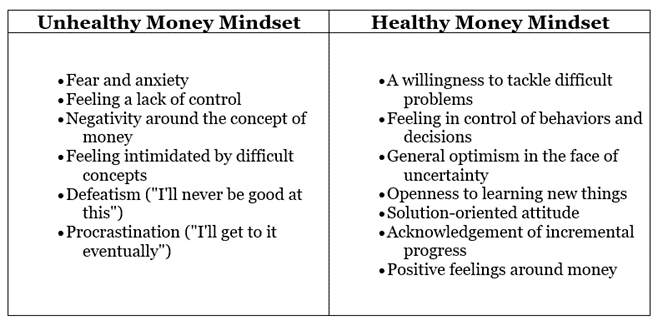
An unhealthy money mindset breeds an even unhealthier money mindset. It’s very easy to catastrophize when you’re in a downward spiral of negative thinking. You may believe that you will never be “good at money,” or you may be concerned about the prospect of doing the work required to become proficient.
Simply reading the column on the right can help you reframe your financial perspective. If you’re willing to confront the difficult issues in your financial life and do so from a position of independence and strength, you’re already ahead of the game. Believing in yourself can go a long way toward developing a healthy money mindset.
“If you are stuck in a cycle of scarcity, old beliefs, and traditions that demonize money, you will struggle with abundance, plenty, or anything that resembles prosperity. Your mind will always default to a negative money story.” -Samantha Gregory, Rich Single Momma
Samantha Gregory of Rich Single Momma continues, “Changing your mindset will move you from scarcity and poverty thinking to abundance and prosperity thinking. Money will no longer be a villain in your life but will become a tool to enhance your life. You will no longer see it as something that always leaves, but as something that always comes back to you. A new money mindset will help you achieve your goals with confidence!”
When you change your mind set about money to focus on the positives and what you can do, it’s easier to see the path forward.

8 Steps to Improve Your Mindset About Money
1. Remind yourself that you have complete control. Everyone comes from a unique background and set of circumstances. Keeping this in mind, you do have control over the financial decisions you make on a daily basis. The sense of control and the ability to improve your financial situation can be extremely beneficial at any stage of wealth accumulation.
2. Be willing to put in the effort. If you are unsure about a particular topic in personal finance, there is a vast library of free resources available on the internet. There is no need to understand every single topic in minute detail, but educational resources are available to help you learn the fundamentals. If you’re simply willing to learn, you’ll put yourself at a distinct advantage.
3. Recognize incremental progress. Paying off a small debt or contributing to an employer-sponsored retirement plan are both accomplishments that should be recognized. Over time, small positive steps can lead to significant progress. Small victories also indicate that your behavior is consistent with your larger goals.
4. Make a firm commitment to success. There are good and bad days, months, and years in everyone’s life. Many things happen by chance in life and are ultimately beyond your control. Deal with these situations by remaining optimistic and reaffirming your commitment to your financial goals – even in the face of setbacks.
5. Extend your gratitude. Nobody’s financial situation is perfect, and it’s safe to say that almost everyone experiences some level of financial stress. Be thankful that you’re doing everything you can to improve your financial situation and be thankful for what you’ve already accomplished.
6. Stop negative self-talk before it spirals out of control. One way to do this is to visualize a stop sign whenever you tell yourself you can’t do something financially. The truth is that you can do it but limiting beliefs can be a major impediment to developing self-confidence. Make every effort to avoid putting yourself down.
7. Continue forward. Our past experiences shape who we are, but we must find the courage to move forward in the face of adversity. Having a long-term mindset when it comes to investing can help you form good habits today. Investing in long-term vehicles such as ETFs or mutual funds can provide financial direction as well as peace of mind.
8. Adopt a mindset of abundance. It is not your loss if someone else succeeds. Even if you believe that others are “ahead” of you in the money game, remember that you are a completely separate person with a completely different set of life circumstances and experiences. Adopting an abundance mindset, rather than a scarcity mindset, can serve as a reminder that there is more than enough to go around.
“I totally believe your mindset can heavily influence your ability to make, save and manage money. I practice daily going to my bank account and being thankful for my money. I’m learning to LOVE my money!” -Alexis Schroeder, FITnancials
Summary
It’s obvious that your money mindset influences your behavior and, ultimately, your financial success.
Your money mindset is made up of your unconscious thoughts and beliefs about money and how it functions in the real world. However, it is not fixed. Your money mindset is not fixed, and it does not have to define who you are. You have the ability and power to change it.
When you wake up in the morning, you have the ability to think of new ideas and engage in new behaviors. It makes no difference where you were yesterday, a month ago, or a year ago. You have the option of taking control of your money – and your money mindset.
It takes time to change your money mindset. It’s time to get started if you want to have a more joyful, abundant, and confident relationship with your money.
Limiting beliefs about money are major impediments to financial success, so do your best to maintain a positive attitude toward money. Your future self will undoubtedly appreciate it.

Exercise 4:5: Breakthrough Coaching Exercise
With the right questions you can create a powerful transformation in a surprisingly short amount of time. In this exercise we will ask and answer these Powerful questions to create breakthrough results.
1. Have participants team up with a partner. (It doesn’t have to be their business buddy)
2. Write the following questions on a white board.
• What is the one thing holding you back from reaching your financial goals?
• How has it impacted your life? (confidence, relationships, lifestyle)
• Are you ready to change this?
• What’s the breakthrough you want to create around this?
• What’s the decision you would like to make?
• What’s in conflict or not in alignment?
• How do you know? (What lets you know that?)
• What is your desired income?
• What if you could earn that income? (how will you and your life be different?
• How will you feel?
• What action step will you take today to work towards your goal?
3. Have partners ask each other these questions. One person serves as the “coach” and asks the other all 11 questions then they switch places.

Course Manual 6: Relationship with Money
Oprah Winfrey once said, “If you want your life to be more rewarding, you have to change the way you think.”
In order to be financially successful, it is necessary for you to adopt a new money mindset. This means not only removing blocks, forgiving, shifting your mindset but also creating a new healthy relationship with money.
We have relationships with almost everything in our environment, including concepts, and yes…even money.
Many people struggle with their finances due to having an unhealthy relationship with money. This usually starts early in life. Having negative thoughts around money such as “money is evil”.
Money is energetically neutral; it is the energy behind it that is important.
Money is neither good nor bad in and of itself. It’s made of paper! It is not making conscious decisions on its own. As a result, it’s neutral. It is the energy we bring to our finances that determines whether it feels “good” or “bad.”
Money earned at the expense of others is likely to feel tainted because it is spent in an egocentric, selfish manner — which feels energetically negative.
If we conduct yourself in a responsible and kind manner with money, that is exactly what the money will become. Because money is an extension of our energy, the vibration it carries is ultimately determined by how we choose to use it.
How you were raised around money may be greatly impacting how you feel about or manage money today. If you are uncomfortable or not confident when it comes to finances, follow these simple steps to help you solve your money issue once and for all! What money type did you grow up with?

4 Money Types
Money Type # 1: The Financial Adolescent
If you were raised to:
Be financially naïve, you never talked about money, possibly because it was considered impolite.
Today you might…Intentionally avoid bills, bank statements and money negotiations, including asking for payment from a client or asking for a raise at work. It can also affect the way that you shop: For example, not comparing prices for the best deal or bargain-hunt.
Your new goal:
Become a confident and empowered consumer and negotiator, a person who can ask tough or possibly uncomfortable questions.
1. Ask financial questions of those around you- what they paid for certain items and if they got a deal. Get comfortable freely talking about money.
2. Track your money daily. Get used of focusing on money. What you pay attention to you attract in your life.
3. Ask for the sale or ask for a raise. Be confident in the value that you offer.
Money Type # 2: The Over Spender
If you were raised to…
Be an over spender, you learned to use money freely and spending was a way to regulate your mood.
Today you might…take your emotions out by abusing your credit card. If you’re happy you shop as a reward, if you’re sad you shop for a pick me up. Both are temporary highs that will most often end up with buyers’ remorse.
Your new goal:
You must disconnect your spending from your emotions. Learn how to feel good about yourself without the use of your credit card.
Your first steps:
1. Learn how to identify an emotional buy. For example, when you feel as though you need a particular item right now. For some people it’s an addiction, so you’ll literally think you can’t live without it.
2. When you have the impulse to shop, make a commitment to yourself to say no, not now. Then revisit the decision in the next few days. This will allow you to delay the purchase and make a more informed, less impulsive decision.
3. When you’re upset, find alternative ways other than shopping to allow yourself to feel better. Some suggestions are to take a walk, workout, do something using your creativity like painting or drawing or take a nice relaxing bath.
Money Type #3: The Penny Pincher
If you were raised to …
Be broke all of the time, you learned to penny pinch and think of money as something that you’ll never have enough of.
Today you might…Deny yourself of fun (yet reasonable) buys like dinner or a drink. Shopping may stress you out, you may hastily come to the decision that you can’t afford it.
Your new goal:
Step back, take a deep breath and look at the bigger picture. Determine where you are and where you want to be financially. Start making a step-by-step plan to get there. You deserve to have an abundant life in all areas including your finances.
1. Change the statement “I can’t afford it” and instead say “I can’t afford it right now.” Identify your priorities and make a list of the things you want and why. Start a savings account for “reasonable fun” like tickets to a concert or a weekend getaway.
2. Allow yourself to splurge a little from time to time on purely pleasure purchases that won’t break the bank such as a new book or movie tickets. Ease in one step at a time.

Money Type #4: Buy Me Love
If you were raised to…
Be codependent with money, you often put others’ needs before your own as a way to be loved.
Today you might…Frequently pay for your friends’ tabs racking up your credit cards or pay for your deadbeat boyfriend or girlfriends half of the rent.
Your new goal:
To love yourself first. Value yourself as much as you value others. Learn how to manage your debt.
Your first step:
1. Commit to 3 priorities that you would like to accomplish this year – just for you. Then create a budget that includes those things. Stay the course don’t let someone else’s wants steer you off course.
2. Start consolidating/paying off your debt by paying off your highest interest debts first. Don’t be afraid to get the support you need to help you attain your goals.
Chances are, you resonated with one of the money types shared above. It is important to know where you stand regarding your relationship with money and start working towards creating a new healthy and empowered relationship. Money can be a great tool to create the lifestyle you desire. It’s up to you to take the necessary steps to make that a reality for you.
The majority of people have an unhealthy relationship with money. And it’s not always their fault. Some of you have been taught since childhood to think about money in a certain way. As a result, rather than inheriting money, you inherited your dysfunctional relationship with it. Some people have had negative experiences with money at some point in their lives and carry this bad feeling with them for the rest of their lives. There are entire industries dedicated to perpetuating an unhealthy relationship with money. Take education as an example. I’m sure you’ve heard the saying, “you don’t go into teaching for the money,” or “you’ll never get rich as an educator.” People in this industry are practically brainwashed into believing in scarcity. As a result of this? They continue to face scarcity. It’s safe to say that the same is true for the nursing and social services industries.
I once heard a well-known yoga instructor say that as spiritual beings, we should prioritize financial abundance. “After all,” she said, “imagine what the world would be like if the majority of money was in the hands of conscious people.”
What a profound concept! What if the majority of the money in the world was used to save lives? Can you imagine how that would feel? Recognizing that this way of thinking about the world is available to us is empowering in and of itself, and it can significantly help to reframe each of our relationships with money.
If you have a negative relationship with money, you will never be able to achieve the abundance you desire. You must change your feelings and paradigm about money in order to change your financial world. You must alter your money-related thoughts, feelings, and behaviors.
Here are some concrete beliefs you can adopt to start changing your attitude toward money:
• When it comes to earning money, your background, IQ, degree, and social status are completely irrelevant. Many of the world’s wealthiest people did not complete college. In fact, many of them came from impoverished immigrant families. Some of the brightest students and those with the highest IQs and grades in college never made it financially.
• Be prepared to make a lot of money. Consider the possibilities: $150,000, $500,000, or a million dollars. It happens every day.
• In today’s economy, ANYONE can make a lot of money. ANYONE! That is how the economy works, people!
• You will make the most money if you solve a major problem for people. The question is not, “What type of business should I start?” “What problem can I solve?” asks the question.
• Even if you are in the service of others, you have the right to make a lot of money. You have the right to make as much money as you can if you provide an incredible service to others. This is possibly one of the most critical paradigms to shift. Too many people believe that if they provide a service that benefits another soul, they should do so for free. This is not correct. You are just as deserving as the person who invented smart phones for people or the person who invented Netflix streaming.
• You will never have enough money if you believe you will never have enough money. What you concentrate on the most produces exactly what you concentrate on the most.
• If you truly believe that abundance is available to everyone, you will attract your own abundance.
• You have no idea where your money goes if you don’t pay attention to it. If you want to improve your relationship with money, you must pay attention to it. Consider it like a marriage. Stop ignoring it and begin to appreciate it.
• No one will make you wealthy. Nobody is going to find you or fix you. You must put in the effort and believe that you are deserving of success.
• Money is something that can be made at any time. For example, good health is not always a given.
• Stop denying the importance of money. Money is important in today’s economy. You want a place to live, food, clothing, and healthcare? You have a tooth infection and require the services of a dentist? You’ve got to have money! By denying the importance of money, you keep very little of it.
If you want to attract more money, you must first develop a healthy relationship with it. Choosing to stay in an unhealthy relationship is a choice and, to be honest, a bit of a cop out. Even if you only want to make ends meet and occasionally take a vacation, developing a healthy relationship with money is essential. Once you and your money concept are solidly connected, you can nurture your relationship for the rest of your life.
Think of Money As Person
How you treat those around you impacts how they feel or respond to you. Money is no different. If you are constantly thinking “Money, your never there when I need you” (lack and scarcity) Or, if you’re stressed out thinking about money do you think it will ever want to be around you? Energetically you could be pushing it away. And the opposite is true if you think of money as being abundant and you love money because of all of the amazing things it will allow you to do then you will start attracting more of it to you.

5 Keys to Creating an Empowered Relationship with Money
Key #1: Eliminate Old Beliefs that are Sabotaging Your Financial Success
As I mentioned earlier in this workshop, we often develop limiting beliefs around money either from our relatives or through our personal life experiences. Either way, these limiting beliefs are very disempowering and will sabotage your success. There are four steps in eliminating these old beliefs.
1. Recognize your old beliefs. You can do this by thinking about your current financial situation. Ask yourself, “What are you afraid of?” What are the feelings that come up? There are typically five underlying needs that we form our beliefs around. The need for love, security, value, respect, or validation.
2. Acknowledge where these beliefs come from. Ask yourself which underlying need are you satisfying? Where did this belief originate from or from whom did you adopt them from?
3. Forgive yourself and/or anyone else who was responsible for this old belief. Forgiveness is an incredibly powerful tool. This is the biggest gift you can give yourself or others. It is also necessary so you can move on. Forgiving doesn’t mean that you necessarily agree with the individual that you had the conflict with, it just means that you understand that they had a positive intention for doing what they did, even though it does not currently serve you. You also must forgive yourself and take responsibility that you are where you are in your life and/or business because of your beliefs and choices up until now. The great news is that you also have the opportunity to make different choices coming from a new empowered mindset.
4. Let It Go. By holding on to these old beliefs, you will stay in a stuck pattern and continue to struggle and not get the results you desire. By “letting go,” you can create the space for new empowering beliefs to develop and for opportunities to show up that will assist you in reaching your personal and financial goals. Take a deep breath and focus on the feelings that arise when you think about your current financial situation. Then, ask yourself the next 3 very simple questions. “Can I let it go? Will I let it go? When?” You can repeat this process until it feels lighter and lighter and ultimately dissolves.
Key #2: Move Into Expansion Around Money
Depending on old beliefs or past experiences, individuals either feel contraction or expansion when it comes to making and managing money. Let’s take a closer look as to what this means.
Contraction = Feelings of Fear, Stress or Frustration
Expansion = Feelings of Joy, Abundance and Peace
You may feel contraction if you are experiencing financial challenges, such as trouble paying the bills or carrying a substantial amount of debt. These two situations can certainly cause you to have feelings of stress, fear, or frustration. The problem is that these feelings can paralyze you, preventing you from taking positive steps in resolving your financial situation.
The great news is, once you develop a plan to either make more money or to pay off your debt, you can start moving into expansion. The beauty of it is that you don’t have to be debt-free or financially successful to start feeling expansion, all you have to do is start working your plan.
Key # 3: Money is an Exchange for Service
Many individuals, especially women, struggle when it comes time to ask for the sale or they don’t ask for what they’re worth. When it comes time to ask for the sale, many women have their old negative beliefs show up, feelings of “Am I good enough?” or “Is my product or service worth it?” If you are 100% sure that the product or service, you’re selling offers a solution to a problem that your target client is experiencing, then your product or service provides value and can truly help them.
By making your offer, you are offering a solution providing value and remaining in integrity with yourself. So, in essence if someone pays for product or service the money is an exchange for the service. Or you can even think of it as a reward for your service.
It’s so amazing to me, how many business professionals feel so guilty making money as if it’s a bad thing. They say things like “I’m not doing it for the money.” It really is ok to make money – even a lot of money. All it takes is a simple mindset shift. Think of it like this…the more money you make represents the more people you’ve helped. Come from a place of serving, not selling.

Key #4: Start Focusing on Money
You may have heard this saying before; what you focus on you bring about. I can’t stress enough how true this statement is. The problem is when individuals are in debt, they focus on the debt. That will only keep you in debt. The only way to shift this is to start focusing on the solution and how you will start making more money.
Cash flow is one of the most important ingredients in business. If it’s not in yours, it should be! There are 3 things to focus on when it comes to cash flow in your or professional career.
1. Keeping track of your money- It is critical to keep track of your money on a daily basis. How much money is coming in and how much money is leaving. Even if the number is 0 or negative, go ahead and do it. If you have a “big ole zero” for the day, you may be disappointed at first, but use that energy to motivate you to make more money the next day. The purpose of tracking is to teach you that you have control over your money. Nothing can change until you take control! (A Money Tracking Tool is available in the Project Study section of this Workshop)
2. Investing – Once you understand how much money is coming in or not coming in, you can determine what changes need to be made to advance your career. This is where you should put your money.
3. Make Money- Making money comes from marketing efforts and closing sales. As a business professional, you should focus on the income-producing activities that are going to bring more sales or new business your business, which means more cash flow to the company.
It’s also incredibly important to respect your money. Money is energy. You worked hard to earn it so treat it with respect. For example, instead of leaving your change lying around in a sock drawer or in the cup holders in your car, take it to the bank and exchange it for dollar bills. Also, be sure to keep your money in a wallet that is organized and clean. Show your money some appreciation! Remember, what you focus on you bring about. So, if you focus on money, you’ll have more of it show up in your life.
It’s also very important to have some goals set related to your finances. In the terrific book, The Slight Edge by Jeff Olson, Jeff shares 4 Simple Strategies to assist you in setting your financial goals:
• List your specific and vivid dreams for your finances. Make sure to include a timeline.
• Write out the price you’ll need to pay to achieve your goal.
• Outline your plan for getting started.
• Write down one simple daily discipline that you can incorporate into your life to help you reach that goal.
Key #5: Adopt a Healthy Empowered Relationship with Money
There is nothing unspiritual about focusing on money. Money makes you more of who you are. For example, if you are a loving, caring, and generous person you’ll be able to express that even more, by having more money in your life because you’ll be able to help others in a bigger way. Once you own your value and start charging what you’re worth and you start making the money you deserve, everything will start to shift. As successful entrepreneur, you will grow in more as a passionate leader, you will grow in more ways than you ever thought possible. You will continue to build your self-worth and value more and more and become more and more fulfilled. You will create a new empowering belief system and stand in your power when it comes to money. This requires you to tap into your inner power, be your best self, be true to who you are and trust your abilities.
New “Empowering” Money Mindsets
• Making more money means I provide more value to the world – Since money is an exchange for the services you provide the more money you make reflects the more people you’ve been able to help.
• More money allows me to be more generous – If you are a caring and generous individual, think of all the ways you can assist others or give back to your community if you made a substantial amount of money.
• The more money I make the more I can circulate it – When you are consistently making money on a monthly basis in your business, you can begin to hire team members to help you spread your message in a bigger and more efficient way. You’ll be able to provide opportunity/jobs to people in need so they can support themselves and their families.
• I can become a great role model for what is possible – By being successful in your business, you are demonstrating what is possible for other individuals that are aspiring to follow their passion and start their own business and/or make an impact by sharing their gifts with the world.
• I can give back in a bigger way – start a charity or a foundation – Once you’ve built a successful and sustainable business, you now have the ability to take a portion of your income and invest in a charity or a foundation. Whether it’s supporting an existing cause that you are passionate about or you start your own foundation, there is nothing more rewarding than being a part of something bigger than yourself and using your resources to make a huge impact in your community or the world.
“Money is usually attracted, not pursued.” — Jim Rohn

A Personal Experience in Circulating My Money (from Ms. Tull)
One of my scariest yet most fulfilling decisions in my business was when I was able to bring on my first team member. When I hired my first personal assistant/client relations manager, it was difficult to let go of control and trust in someone to represent my mission. However, it was so rewarding to know that I could and help them generate and income, thereby helping her to support her family. When you have others assisting you and supporting you on your mission, you free up your time to start focusing on things that you are most passionate about, and that can take your business to the next level.
Your New Powerful Money Mindset
With a new empowering and healthy relationship with money, you can move forward confidently when making financial decision in your life and career. This will allow you to reach your personal and professional financial goals so you can start living a life without limits. – I encourage you to continue using the tools provided in this lesson to help you get through any financial obstacle or challenge you may face.

Exercise 4:6: Create a Sacred Relationship with Your Money
With the right questions you can begin to transform our relationship with money. In this exercise, we will ask and answer these Powerful questions to reveal a new sacred relationship with money.
1. Have participants team up with a partner. (It doesn’t have to be their accountability buddy)
2. Write the following questions on a white board.
• Think of something or someone you have a sacred relationship with. This is someone who holds a very special place in your heart. When you think of them you feel strongly connected to them. (Write it down)
• What are the qualities or feelings that make this relationship sacred or special (Write them down – aim for 8-12)
• Now substitute the word “money” for whom you have the sacred relationship with then read through the list of qualities or feelings again.
• Circle the 3 qualities or feelings that are missing from your relationship with money or feel uncomfortable in some way.
• What are 3 ways you can take action to include these missing qualities into your relationship with money? (Write them down)
3. Have partners ask each other these questions. One person serves as the “coach” and asks the other all 5 questions then they switch places.

Course Manual 7: Need vs. Want
Many people do not understand or care about the distinction between needs and wants. It’s also not uncommon for people to confuse the two. Some people even believe the terms are interchangeable.
When creating a monthly budget, one of the most important steps is to categorize your spending by whether it is a “need” or a “want.”
It is also one of the most difficult steps to take because what constitutes a need versus a want varies from person to person. It’s also easy to mistake wants for needs if you’re so used to having them that you can’t imagine life without them.
However, as we demonstrate in this lesson, needs, and wants are not the same thing and why it’s critical to understand the distinction between them.
“The moment you learn to separate your wants from your needs, your vision becomes clearer.” – Kemi Sogunle
Why Is It Necessary to Distinguish Between Needs and Wants?
The distinction between needs and desires has a direct impact on your personal finances. It alters how you budget and spend money.
You’ll be able to manage your money more effectively if you understand the difference between needs and wants.
The Differences Between Needs and Wants
Let us begin by answering some of the most frequently asked questions, specifically:
1. What exactly are needs and wants?
2. What are the distinctions between needs and wants?
3. What are some examples of wants needs and wants?
What exactly are needs and desires?
Definition and Meaning of Needs
“If you need something, or need to do something, you cannot successfully achieve what you want or live properly without it,” according to the Collins Dictionary.
It’s not a great definition, but it’s one of the better ones in the dictionary.
Needs can be defined in terms of personal finance as follows:
Wants are non-essential items that, in your opinion, improve the quality of life. These items are not required for survival or to maintain your standard of living. Wanting a new car when you don’t need one is an example.
Definition & Meaning of Wants
Wants are defined as “having a desire to possess or do (something); wishing for” by Lexico (powered by Oxford). They use the phrase “I want an apple” as an example. It’s a very basic definition that doesn’t go into much detail about the financial aspects of it.
In terms of personal finance, we can define wants as follows:
What are the distinctions between needs and desires?

Here are the top ten distinctions between needs and wants:
1. Needs are limited, whereas wants are virtually limitless, depending on how creative you are.
2. Needs are things that are absolutely necessary, whereas wants are non-essential items that are nice to have.
3. Needs are mostly concerned with the present. Wants, on the other hand, are primarily concerned with the future.
4. Needs arise out of necessity and self-preservation. Wants arise out of desire or what’s perceived as self-improvement.
5. Not getting what you need may, in the best-case scenario, cause you to be worse off. In the worst-case scenario, it may lead to disease and even death. Not getting what you want won’t cause you any harm. In most cases it will simply mean you remain where you are.
6. Basic needs such as food, water, warmth, shelter, and rest don’t change much over time. Wants change often.
7. When your basic needs are met, you can achieve contentment. Wants almost never lead to contentment. As one is satisfied, another appears.
8. Needs must be met before desires can be satisfied.
9. If at all possible, needs should be met. Not all desires should be granted.
10. Your budget should prioritize needs. You can live without wants that fall under the category of discretionary expenses.
“In my life, I’ve found that when I align my wants and my needs, less becomes more.”
― Laurie Buchanan, PhD
What are some examples of desires and needs?
Here are some concrete examples of needs and desires to help you understand the distinctions between them.
Examples of Needs
Perhaps the best way to explain basic needs is to imagine yourself stranded on an island. A good example is the popular reality show Survivor.
Finding water and food will be your most basic needs. You will require shelter to protect yourself from the elements. You’ll also need clothing or a fire to stay warm. You also need to rest. These are your basic requirements. You won’t last long if you don’t have them.
Your needs, however, are not limited to your basic survival needs.
The things you need to maintain your standard of living, as I mentioned in my definition of needs, are also needs. You’ll regress and be worse off than you are now if you don’t have them.
Here are some examples of needs:
• Assume you’ll need your own vehicle to visit customers. You can’t work if you can’t afford a car. In this case, you’ll need a car. It’s not a frivolous item that collects dust in your garage. It’s a must-have item.
• Assume you have a home loan. You must pay it. You may lose your home if you default. You may also receive a poor credit rating, which may have far-reaching consequences. Mortgage payments are a necessary expense. It is something for which you must pay.
• If you work in an office, you must dress appropriately for the job, as specified, or expected by your employer. If you do not comply, you may lose your job. This does not imply that you must purchase expensive brand names. However, you must include an item in your budget for necessary work clothes.
Examples of Wants
Wants are non-essential items that you do not require but believe will improve your quality of life.
Some of the following items may be on your wants list:
• You want to buy a brand-new Mercedes when you already have a perfectly good, dependable vehicle.
• You want to spend a luxurious vacation in Paris, France.
• You want to buy a bigger house even though your current one is more than adequate.
• The list goes on and on. It really includes anything that isn’t absolutely necessary. It could be imported red wine, an expensive meal at a fine restaurant, a new boat, designer shoes, designer clothes, or a vacation home.

Hierarchy of Needs
Abraham Maslow published a famous paper titled “A Theory of Human Motivation” in 1943. Maslow mentions a five-level hierarchy of needs in this paper, namely:
• Level 1: Physiological Needs – Food, water, warmth, and rest.
• Level 2: Safety – A sense of safety and security.
• Level 3: Belonging and Love – Meaningful relationships
• Level 4: Esteem – Self-esteem and feelings of accomplishment.
• Level 5: Self-Actualization – Realization of one’s full potential.
Maslow’s needs hierarchy describes the various stages of human development. Before proceeding to the next stage, each stage must be completed. According to Maslow’s hierarchy of needs, humans should strive for the fifth level, self-actualization.
Levels 1 and 2 are for your basic requirements.
Levels 3 and 4 are for your psychological requirements.
Needs Pyramid
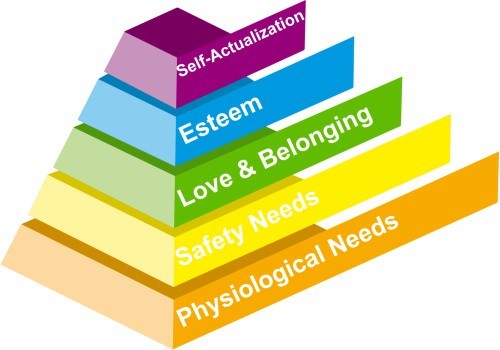
At the bottom are your basic physiological and safety requirements. When they are satisfied, you can progress to the next level, which is love and belonging, until you reach self-actualization.
For example, according to Maslow’s needs hierarchy, you cannot progress to having meaningful relationships if your basic needs are not met.
Why is Maslow’s needs hierarchy, also known as the “needs pyramid,” relevant when distinguishing between needs and wants?
Wants Can Become Needs
It’s very likely that your needs will change as your circumstances change or improve. What you once considered a “want” may now be considered a “need.”
It’s a completely natural part of life.
Assume, for example, that you don’t need a car for your current job. A car would be considered a “want.” What if you are offered a high-paying job that requires you to have your own car?
Take care not to turn something you can live without into a necessity.
For example, even if you don’t need a new car, you may decide to purchase one anyway. You must maintain your new car now that you have it.
Buying a new car that you don’t really need isn’t the end of the world if you’re wealthy. If you’re barely making ends meet each month, it’s not a good idea to put additional strain on your finances.
A needs list of essential items
Make a list of all the necessary payments you must make, such as groceries, mortgage or rent, and utility bills. These are obligations that must be met and must be prioritized.
A wants list for non-essentials
In order of priority, list all non-essential or nice-to-have items. You may be able to pay for at least some of them depending on your financial situation.
Always make an effort to stick to your budget. There is no such thing as a set budget, but it will help you manage your money more effectively. It provides you with a clear picture of your income and expenses. It will also show you which non-essential items you can afford.
The Budget Rule of 50/30/20
“All Your Worth: The Ultimate Lifetime Money Plan,” is a book written by Senator Elizabeth Warren and her daughter.
They propose a 50-30-20 budget rule in this book. It recommends allocating your disposable income as follows:
Needs receive 50% of the budget.
30% for Wants
20% for Savings
Although this ratio has gained popularity over the years, it is not suitable for everyone.

Find a Happy Medium Between Needs and Wants
Needs vs. Wants does not imply either/or. They aren’t really diametrically opposed. They are simply distinct from one another and should be managed accordingly.
Always strive to strike a healthy balance between needs and wants.
Needs are limited, whereas desires are nearly limitless. However, there must be a balance between them in terms of your budget.
This does not imply that you should spend half of your money on necessities and half on desires.
When comparing needs and wants to a meal, your needs are the healthy plate of food you have for dinner. Your desires would be a small dessert after dinner.
Old proverb: the old proverb: “Money is a good servant but a bad master.” You have to control your money, or it will control you.
Tips for Managing Your “Wants”
Here are seven suggestions for managing and controlling non-essential purchases.
1. Don’t go into debt for something that isn’t necessary – If you don’t have the money for it, save up for it until you can afford it.
2. Avoid impulse purchases – If it isn’t something you planned to buy ahead of time, don’t buy it. Consider it and take a look at your budget. If you still want it and can afford it, you can always get it later.
3. Reduce unnecessary expenses – If you enjoy something, such as going out to dinner, you don’t have to give it up completely. Depending on your budget, you could simply reduce it to once a month instead of every week.
4. Include it in your budget’s “wish list” – Non-essential items that you want to include in your budget in order of priority make them easier to manage.
5. Can it wait? Consider what will happen if you do not get what you want. Is it merely a nice-to-have? If it isn’t going to make a significant difference in your life, leave it alone.
6. Can’t you spend the money on something more worthwhile? You most likely have a long list of desires. Some items may be available for purchase right away. Others will necessitate saving. Before you spend money on something that isn’t absolutely necessary, ask yourself if you wouldn’t rather spend it on something else.
7. Maybe it makes sense to first pay off more debt or invest the money? Consider that, in most cases, it is preferable to pay off debt before purchasing something you don’t really need. It could also be a wise decision to invest the money.
Asking yourself these questions does not imply that you are not allowing yourself any luxuries. It’s all about managing your money and making sound financial decisions.
Conclusion
To summarize, needs are items that are required for survival or to maintain one’s standard of living. Wants are non-essential items that, in your opinion, improve the quality of life.
Needs and wants are not diametrically opposed or mutually exclusive concepts. They are simply distinct from one another and should be managed accordingly. You should be able to strike a good, healthy balance between them now that you learned how.

Exercise 4:7: Hierarchy of Needs Collage
This group activity works well with five groups.
Ask each group to create a collage.
Each group should be assigned to a particular level of Maslow’s hierarchy.
• Level 1: Physiological Needs – Food, water, warmth, and rest.
• Level 2: Safety – A sense of safety and security.
• Level 3: Belonging and Love – Meaningful relationships
• Level 4: Esteem – Self-esteem and feelings of accomplishment.
• Level 5: Self-Actualization – Realization of one’s full potential.
Distribute old magazines to each group. Have the groups look through the magazines, looking for pictures that illustrate the needs that correspond to their assigned hierarchy level. Have the group cut out these pictures and glue them to a separate piece of paper. The finished collage should depict several different needs that illustrate that level of the hierarchy.
Have each group share their collage with the whole group.

Course Manual 8: Financial Literacy
“Most people spend more time picking out a suit than planning their careers and retirement.” Earl Nightingale
Many consumers today have a basic understanding of finance. Indeed, a lack of financial knowledge may be one of the reasons why many individuals struggle with saving and investing. Few people are prepared as financial decision-making becomes more complicated.
That is why Financial Illiteracy is the #1 crisis in America!
The Financial Industry Regulatory Authority (FINRA) conducts a short financial literacy test as part of its National Financial Capability Study every few years. The quiz assesses consumers’ understanding of interest, compounding, inflation, diversification, and bond prices. In general, the study discovered that test performance was related to key indicators of financial capability. In the most recent test, slightly more than a third of respondents answered four or more questions correctly out of five, indicating widespread financial illiteracy.
Consumer habits and financial products have changed, making it more difficult for Americans to manage their finances. Most people used cash for daily purchases in the past. Credit cards are being used more frequently nowadays. Credit accounted for 27 percent of payments in 2019, up from 24 percent in 2017.3 Our shopping habits have also changed. Many people prefer to shop online, which makes it easy to use and overextend credit, an all-too-convenient way to accumulate debt quickly.
Meanwhile, credit card companies, banks, and other financial institutions are bombarding consumers with credit opportunities, such as the ability to apply for credit cards or pay off one card with another. It is very easy to get into financial trouble if you do not have the proper knowledge.
People cannot rely on one-time windfalls like the $1,400 stimulus checks distributed as part of the American Rescue Plan for long-term financial planning. Individuals must instead strengthen their financial knowledge in order to manage their day-to-day financial lives while also planning for the future.
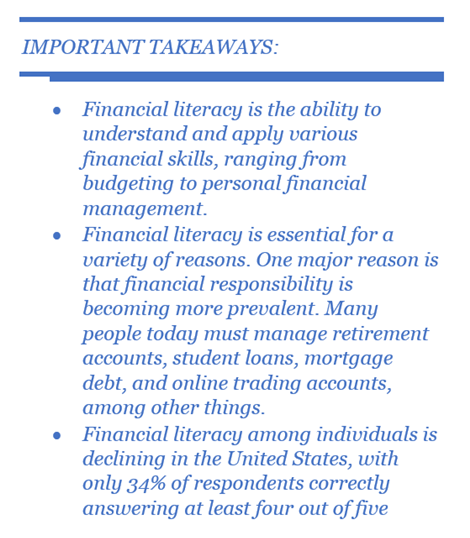
What is Financial Literacy?
Financial literacy combines financial, credit, and debt management knowledge that is necessary to make financially responsible decisions—choices that are integral to our everyday lives. Financial literacy includes paying off debt, creating a budget, and understanding the difference between various financial instruments. In sum, financial literacy has a material impact on families as they try to balance their budget, buy a home, fund their children’s education, or ensure an income for retirement.
People in advanced economies, as well as those in economically emerging or developing economies, are affected by a lack of financial literacy. Nations all over the world are dealing with consumers who do not understand basic financial concepts, from Brazil to Bulgaria to India.
Though financial literacy varies depending on education and income, research shows that highly educated consumers with high incomes can be just as ignorant about financial issues as less-educated, lower-income consumers (though in general, the latter do tend to be less financially literate).
People all over the world suffer from financial illiteracy. Currently, 90 percent of Venezuelans live in poverty. Greece’s unemployment rate has remained close to 20% since the country’s economic collapse in 2010. These are just two examples of countries that are in an economic emergency.
The causes of each crisis differ, but they all include the aftermath of a global recession, military turmoil, political corruption, natural disasters, and a variety of other causes and complexities. The deep anguish that millions of people face on a daily basis as a result of economic disasters should never be underestimated. The number of people affected by national economic problems, however, pales in comparison to the widespread crisis of financial illiteracy.
• 44% of Americans don’t have enough cash to cover a $400 emergency
• 38% of households in America have credit card debt
• 43% of student loan borrowers are not making payments
• 33% of American adults have zero retirement savings
“Too many people spend money they haven’t earned, to buy things they don’t want, to impress people that they don’t like.” ― Will Rogers
7 Reasons Financial Literacy is So important
1. For starters, it teaches us the value of money so that we can better manage our finances. Being financially literate will instill in us the value of budgeting and saving. We will not squander our money on expensive gadgets, clothes, cars, bags, shoes, and other items that we do not require. We can distinguish between our wants and needs and prioritize things in our daily lives based on their importance.
2. Secondly, it prevents us from acquiring too much debt. Too much debt can get us into a lot of trouble. We can determine how much loan we can afford to pay if we are financially literate, especially if we have bills for mortgages and insurance. This will also teach us how to save for our children’s education and future needs, as well as medical and hospital bills, without having to borrow money.
3. Third, it enables us to pass on our financial literacy knowledge to the next generation. Financial literacy will assist us in securing the future of the next generation. We can teach them how to budget and save for the future. They can also see, even at a young age, how hard their parents work to meet all of their needs. Helping them understand the value of financial literacy will also teach them discipline and respect for their parents. This will also teach them that they should eventually be financially self-sufficient. They’ll be more responsible and streetwise.
4. Fourth, financial literacy allows us to better prepare for emergencies. We all have times when we need cash or a large sum of money to survive or overcome financial and emotional crises. Being financially literate in times like these will save us the trouble of borrowing money that will only cause us more problems.
5. Fifth, it informs us on how to invest and generate income. Investing in stocks and generating income streams in addition to our salaries are outcomes of financial literacy. Relying on a single source of income will keep us in a position where we must always make ends meet. Having multiple income streams will give us confidence that we will be able to survive financial crises.
6. Sixth, it allows us to contribute to the growth of our country’s economy. When we invest a portion of our money, say, in stocks, we assist the company in which we invest in creating more jobs. This means increased employment and a greater contribution to the development of a more progressive nation.
7. Seventh, financial literacy allows us to assist those who are less fortunate. It allows us to share our blessings with those in need. This is because we can spend our money more wisely and save a portion of it for investment, business, and retirement, to name a few. We can then donate a portion of our savings to those in desperate need of assistance. Helping others provides us with a sense of fulfillment that is truly priceless.
Any advancement in financial literacy will have a significant impact on people’s ability to provide for their future. Recent trends make it even more important for consumers to understand basic finances because they are now expected to shoulder a greater portion of the burden of investment decisions in their retirement accounts, all while deciphering more complex financial products and options. Being financially literate is not easy, but once mastered, it can significantly reduce life’s burdens.
If you are interested in financial self-improvement, then you fall under one of these 3 groups:
• You are aware that you are part of the 95% of people who are attempting to live an unaffordable lifestyle, and you have come to gather the knowledge, skills, and practices to change that.
• You are one of the other 5% who have come to improve skills that will help you amplify your financial success or accelerate your path to financial independence.
• You currently consider yourself to be in the 5%, but the exercises provided teach you that what you thought wasn’t necessarily true.

The Difference Between Women vs. Men When It Comes to Financial Literacy
Men and women exhibit a variety of different financial behaviors, in addition to gender differences in financial knowledge and attitudes. In contrast to the evidence presented above on financial knowledge, gender patterns in financial behavior are more complex, and their interpretation is more difficult.
Women’s financial attitudes can have a significant impact on their financial behavior. For example, women’s financial risk aversion and lack of confidence in their financial skills may limit their ability to profit from financial market opportunities by limiting their willingness to take risks.
Common qualities with women and money
• Financial dangers can be that women have a higher risk aversion, as well as a greater awareness of their own mortality.
• Low financial knowledge and lower overall confidence in comparison to men underpin a more prudent approach.
• In a number of countries, women are vulnerable in certain areas, such as decision-making.
• Financial behavior that may protect them from large investment losses or being victims of fraud.
• Women are more likely than men to keep a budget and track their finances.
In the next workshop, on money management, we will reveal simple skills to successfully manage money.
“Making money isn’t hard in itself… What’s hard is to earn it doing something worth devoting one’s life to.” ― Carlos Ruiz Zafón, The Shadow of the Wind

Exercise 4:8: Money Conversation Starters
(Conversation Starters about Money, Finances, and Saving – ITHRIVE320) www.blog.ithrive320.com
Let’s face it money can be a hard topic to discuss. This exercise will help to start a conversation about Money, Finances, and Saving.
Below is a list of creative conversation starters that focus on the topics of money, finances, and savings, because the best way to gain new insights is to ask great questions.
Have participants pair up and go through as many of the questions listed below. One person starts by asking the questions while the other answers and after 7 – 10 minutes they switch roles.
1. Are you more of a saver or a spender?
It’s been said that savers and spenders tend to find one another and get married. Is this true for you?
2. What was the very last purchase that you made?
The purchase may have been big or small. It might have been made online or in the store. With one-click “buy now” buttons, and online shopping readily available by laptop and cellphone, it’s easier to spend money than ever before. This conversation starter might even provide you with some new insights into your own spending habits.
3. What is something positive you learned about money and finances from your parents?
All of us began learning about money when we were young. This question highlights positive financial habits that may have been passed down from generation to generation.
4. What negative spending habits did you pick up from your parents?
Although this question is not as fun as the previous one, it can lead to new insights. Our negative spending habits come from somewhere, right? Did you happen to pick up a few at home? Let’s talk about it!
5. If a rich uncle suddenly gave you a million dollars, what would you do first?
This question tries to get at your top money priority so that you can both talk about it. Plus, scheming and dreaming about how to spend a small fortune is a lot of fun too. So let the creativity flow, and the conversations begin.
6. Will Rogers said, “Too many people spend money they earned. To buy things they don’t want. To impress people that they don’t like.” Can you think of a time you’ve done this? If so, tell the story.
Everyone makes good and bad money decisions at times. Are you able to talk and even laugh about past financial blunders? This conversation starter focuses on connecting through story.
7. Is accumulating money good, bad, or morally neutral? Why do you believe this?
Don’t answer this question too fast. First, examine what you believe in your head. Then, think about what you believe in your heart. Are the two congruent? What we believe isn’t always black-and-white. The goal of this conversation starter is to get to the heart of what you think about money.
8. Jim Rohn said, “Formal education will make you a living; self-education will make you a fortune.” When it comes to finances, do you think Jim is right? Is self-education a better way to accumulate wealth? Why or why not?
Conversations about famous money quotes are an excellent way to think deeply about what is being said. You’ll find a number of these types of questions here.
9. Tell a story about a savings success. When were you able to make a big purchase by meticulously planning, and how did you do it?
This is a hero question. All of us have moments when we are the hero of our own financial story. This conversation starter is meant to get you to think deeply about those times so you can do more of what works.
10. How do you currently feel about your finances? Are you relaxed, stressed, or somewhere in between?
This is one of those questions that you can come back to time and again. Feelings come, go, and change over time. This conversation starter can even be used as a monthly check-in.
11. Do you believe in the old adage, “A penny saved is a penny earned?” Why or why not.
Old sayings like this one are fun to recite. But it’s all too easy to quote them without putting thought into what they mean. This question tires to help you get to the heart of your feelings about this well-known money saying.
12. Are money conversations easy for you to have, or do they make you uncomfortable? Why do you think this is?
Most people have strong feelings about money. For some, talking about finances is taboo. For others, the money-talk flows freely. This conversation starter is meant to get to the heart of your feelings about money, and to help you gain new insights into why you might feel this way.12. Are money conversations easy for you to have, or do they make you uncomfortable? Why do you think this is?
13. What books about budgeting, money, and financial management have you already read? What was one key takeaway?
When it comes to money, budgeting, and finances, you’re likely not starting from ground zero. Have you and your partner taken similar classes, read the same books, or are there financial ideas you have in common? This money question will help you find out. It’s also an excellent question to help you discern where you’re at on your money management journey.
14. What books or courses on budgeting, money, and financial management would you like to take in the future?
It’s said that those who fail to plan, plan to fail. This conversation starter is meant to help you think ahead and plan for your financial education future.
15. How did you spend money wisely this week?
This question is all about keeping things real. Sure, it’s fun to talk about money theory. But how are you putting this knowledge into action? Did you budget well? Did you think about making a frivolous purchase but ultimately put the item back on the shelf? Are you proactively contributing to a savings account? This conversation starter is all about finding those wins so you can do more of what works!

Course Manual 4:9: Money Management
According to one study, 78 percent of Americans live paycheck to paycheck – but you don’t have to be one of them. You can save money, invest it, and achieve your financial and personal goals. You can not only save money, but also learn how to put it to work for you by investing. It all comes down to money management.
What is money management?
Money management is a business strategy that allows you to maximize your earnings. It entails tracking, budgeting, saving, and investing your paychecks in the most efficient manner – and it is a necessary skill for everyone on the planet. Why? Your overall wealth has less to do with how much money you make and more to do with learning how to manage your money. Whether you earn $100,000 or $1 million, developing your money management skills can help you achieve financial freedom, retire comfortably, and much more.
The good news is that you don’t have to be a math genius or a millionaire to learn about money management. Money management is fundamentally about changing your mindset and developing good habits.
Why is money management important?
Without money management, personal finances are a bit of a mystery. This can lead to overspending and living paycheck-to-paycheck. Money management can help you have a better handle on your income and spending so you can make decisions that improve your financial status.
How can you improve your money management skills?
You can improve your money management by evaluating what you’re doing with money on a regular basis and making changes that make sense for you. If you don’t have a budget, for example, you could start by creating one. If you have a budget, you could track your spending and see how it compares to it. Based on your financial goals, you could choose to increase your savings, pay off debt, or begin investing once you have an idea of your income and spending.
10 Easy Ways to Manage Your Money
1. Make a budget: Many people don’t budget because they don’t want to go through what they perceive to be a tedious process of listing expenses, adding up numbers, and ensuring everything is in order. If you’re bad with money, there’s no room for excuses when it comes to budgeting. Why wouldn’t you do it if all it takes to get your spending under control is a few hours each month spent working on a budget? Instead of focusing on the process of creating a budget, consider the benefits of budgeting in your life.
2. Use the budget: Your budget is useless if you make it then let it collect dust in a folder tucked away in your bookshelf or file cabinet. Refer to it often throughout the month to help guide your spending decisions. Update it as you pay bills and spend on other monthly expenses. At any given time during the month, you should have an idea of how much money you’re able to spend, considering any expenses you have left to pay.
3. Set a limit for yourself for unplanned spending: The net income, or the amount of money left over after deducting your expenses from your income, is an important component of your budget. If you have any extra money, you can spend it on fun and entertainment, but only up to a certain limit. You can’t go crazy with this money, especially since it isn’t much and has to last the entire month. Before making any major purchases, make certain that they will not conflict with anything else you have planned.
4. Keep track of your money coming in and going out: Being aware of and tracking money going in and out on a daily basis is very important. Small purchases add up quickly, and before you know it, you’ve gone over your budget. Begin tracking your spending to identify areas where you might be unknowingly overspending. Keep your receipts and record your purchases in a spending journal, categorizing them so you can identify areas where you struggle to keep your spending under control. You will also want to track money coming in- even if you have to write down a zero for the day. Remember what you focus on expands.
5. Do not sign up for any new recurring monthly bills: Simply because your income and credit qualify you for a loan does not mean you should accept it. Many people mistakenly believe that the bank will not approve them for a credit card or loan that they cannot afford. The bank is only aware of your reported income and the debt obligations on your credit report, not any other obligations that may prevent you from making your payments on time. It is your responsibility to determine whether a monthly payment is affordable based on your income and other monthly obligations.
6. Check to see if you’re getting the best deal: You can save money by comparison shopping and ensuring that you are paying the lowest price for products and services. Look for discounts, coupons, and less expensive alternatives whenever possible.
7. Save for large purchases: Being able to delay gratification will help you be a better money manager. When you postpone large purchases, rather than sacrificing more important necessities or putting the purchase on a credit card, you give yourself more time to consider whether the purchase is necessary and even more time to compare prices. You avoid paying interest on the purchase if you save instead of using credit. 6 And if you save instead of skipping bills or obligations, you won’t have to deal with the many consequences of failing to pay those bills.
8. Limit your credit card purchases: Credit cards are the worst enemy of a bad spender. When you run out of cash, you immediately reach for your credit cards, regardless of whether you can afford to pay the balance. Resist the urge to use your credit card to make unaffordable purchases, especially on items you don’t really need.
9. Contribute to savings on a regular basis: Making a monthly deposit into a savings account can help you develop good financial habits. You can even set it up so that money is transferred automatically from your checking account to your savings account. You won’t have to remember to make the transfer this way.
10. Being good with money takes practice: you may not be used to planning ahead of time and deferring purchases until you can afford them at first. The more you incorporate these practices into your daily routine, the easier it will be to manage your money and the better off your finances will be.

Pay Yourself First – with a Pay Yourself First Budget
A pay-yourself-first budget is exactly what it sounds like: you fund your savings goals first, then use the rest of your paycheck however you see fit. While there are numerous advantages to this type of budget, there are also some disadvantages to be aware of.
Here’s a closer look at how a pay-yourself-first budget works, so you can decide if it’s right for you.
A Pay-Yourself-First Budget: Definition and Examples:
A pay-yourself-first budget is a reverse budgeting strategy in which you save a portion of your income first—basically treating your savings like a bill—and then use the remainder of your money to cover expenses and spend as you see fit.
Reverse budget is another name for reverse budgeting.
Because you don’t have to spend time tracking your expenses, a pay-yourself-first budget is simpler than other types of budgets. You’re good to go as long as you prioritize savings, pay your bills, and avoid taking on new debt.
For example, suppose you want to save 20% of your income. So, you set aside 10% for retirement, 5% for an emergency fund, and 5% for a vacation fund. You can now freely spend the remaining 80% on wants and needs.
“Reverse budgeting is my preferred budgeting method,” said R.J. Weiss, a certified financial planner, and the founder of The Ways to Wealth. “This method is when you pay your goals first (e.g., savings, travel fund, down payment on a house, etc.) and then you can spend what’s left over.” This way, one can take care of their goals, ideally through automatic transfers, and then freely spend the remainder.”
How a Pay-Yourself-First Budget Works
When you “pay yourself first,” you automatically set money aside for your financial goals the moment you get paid. As a result, money is directed first to your savings account, IRA, 401(k), and any other investment accounts. The remainder of your paycheck is then yours to spend as you see fit.
A pay-yourself-first budget is a low-maintenance type of budgeting because it does not require you to keep track of every penny you spend. You’re doing it right if you’re meeting your savings goals and not overdrawing your accounts or incurring new debt.
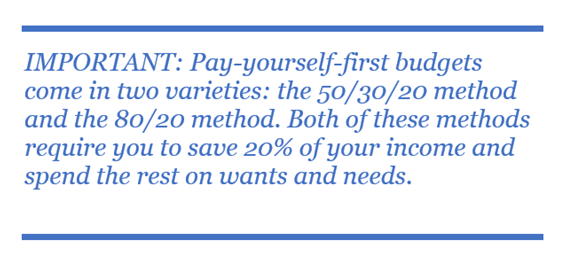
EXAMPLE:
Assume you earn $5,000 per month and have the following savings goals:
• Contribute $500 to your Roth IRA each month if you’re 49 or younger this year ($6,000 yearly contribution limit for those 49 and younger, $7,000 for those 50 and older).
• Save $400 per month for a down payment on a house.
• Set aside $200 per month for an emergency fund.
• Set aside $100 per month for a vacation fund.
Overall, you’d need to save $1,200 per month, for a savings rate of 24% ($1,200 / $5,000 = 24%).
The remaining $3,800 (or 76 percent) would be used to cover your fixed and variable expenses, such as rent, utilities, groceries, phone bill, and eating out.
IMPORTANT: Do you have big savings goals you’re aiming for? Divide them into biweekly (or monthly if you’re paid monthly) chunks so you can easily track them. For example, if you want to contribute the maximum amount to your Roth IRA, which currently has a contribution limit of $6,000 per year, your monthly savings goal would be $500.
What Is an Appropriate Percentage to Pay Yourself?
One of the first questions you may have when creating a pay-yourself-first budget is, “How much should I pay myself?”
Most experts recommend saving at least 20% of your monthly income. But things aren’t always this simple in real life. You may be living paycheck to paycheck or saving 5% of your income, and that’s perfectly fine. Saving anything, even if it’s only a few dollars per month, is preferable to saving nothing.
Even simply paying yourself first each month can have a significant impact when your situation improves, and you finally have the opportunity to save more money.
Pros and Cons of a Pay-Yourself-First Budget

How To Make a Personal Budget in 6 Simple Steps
A budget is required if you want to control your spending and work toward your financial goals.
A personal or household budget is a summary that compares and tracks your income and expenses over a set period of time, usually one month. While the term “budget” is frequently associated with limited spending, a budget does not have to be restrictive in order to be effective.
What Is the Purpose of a Budget?
A budget will show you how much money you expect to bring in, then compare that to your necessary expenses (like rent and insurance) and discretionary spending (like entertainment or eating out). Instead of seeing a budget as a hindrance, consider it a tool for achieving your financial objectives.
Making a budget may not sound like the most exciting activity (and for some, it may be downright terrifying), but it is an essential part of keeping your financial house in order. This is due to the fact that budgets rely on balance. Spending less in one area allows you to spend more in another, save for a large purchase, create a “rainy day” fund, increase your savings, or invest in wealth creation.
The outcome of your new budget will show you where your money comes from, how much there is, and where it all goes each month.
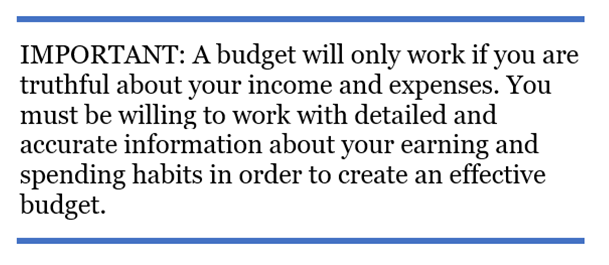
6 Steps to Creating a Budget
1. Gather Your Financial Documents
Gather all of your financial statements before you begin, including:
• Bank Account statements
• Accounts for investment
• Utility bills from recent months
• W-2 forms and pay stubs
• 1099s
• Bills from credit cards
• Receipts from the previous three months
• Statements for a mortgage or an auto loan
You want to have access to all of your income and expense information. Creating a monthly average is one of the most important aspects of budgeting. The more information you can sift through, the better.
2. Determine Your Earnings – How much money can you expect to make each month? If your income is in the form of a regular paycheck with taxes deducted automatically, using the net income (or take-home pay) amount is acceptable. Include any outside sources of income, such as child support or Social Security, if you are self-employed. Make a note of this total income as a monthly amount.
3. Make a list of your monthly expenses.
Make a list of all the expenses you expect to incur during the month. This list could include the following:
• Rent or mortgage payments
• Vehicle payments
• Insurance
• Groceries
• Utilities
• Entertainment
• Personal hygiene
• Dining out
• Child-care services
• Transportation expenses
• Travel
• Student loans
• Savings
To identify all of your spending, go through your bank statements, receipts, and credit card statements from the last three months.
4. Calculate the Fixed and Variable Expenses
Fixed expenses are those expenses for which you must pay the same amount each time. Include mortgage or rent payments, car payments, fixed-fee internet service, trash pickup, and regular childcare. Include any standard credit card payments as well as any other essential spending that tends to remain consistent from month to month.
Include savings and debt repayment as fixed expenses if you plan to save a set amount or pay off a set amount of debt each month.
Variable expenses are those that vary from month to month, for example:
• Groceries
• Gasoline
• Entertainment
• Dining out
• Gifts
Begin by allocating a spending value to each category, starting with your fixed expenses. Then, calculate how much you’ll need to spend on variable expenses each month.
If you’re unsure how much you spend in each category, look through your last two or three months of credit card or bank transactions to get a ballpark figure.
5. Add up your monthly earnings and expenses. You’re on the right track if your income exceeds your expenses. This extra cash allows you to allocate funds to other areas of your budget, such as retirement savings or debt repayment.
If your expenses exceed your income, you are overspending and should make some changes.
6. Make Expense Adjustments
If your expenses exceed your income, look for areas where you can cut your variable expenses. Look for areas where you can cut back on spending, such as eating out less, or eliminate a category, such as canceling your gym membership.
Aim for an equal balance in your income and expense columns. This equal balance indicates that all of your income has been accounted for and budgeted for a specific expense or savings goal.
“Money moves from those who do not manage it to those who do.” – Dave Ramsey

How to Use Your Budget
After you’ve established your budget, you must monitor and continue to track your expenses in each category, ideally on a daily basis throughout the month. The same budgeting spreadsheet or app that you used to create your budget can also be used to track your income and expenses.
Keeping track of your spending throughout the month will help you avoid overspending and identify unnecessary expenses or problematic spending patterns. Rather than waiting until the end of the month, spend a few minutes each day recording your expenses.
TIP: If you are unsure about budgeting your money, use the envelope system, in which you divide cash for spending into separate envelopes for different spending categories. When an envelope runs out of money, you must stop spending in that category.
Keep track of how much you spend as you use your budget. When you reach your spending limit in a category, you must either stop spending in that category for the month or transfer money from another category to cover additional expenses.
The goal of using a budget should be to keep your monthly expenses equal to or less than your monthly income.
Examine and Improve Your Budget
Circumstances shift. Our priorities change as we change jobs, relocate, and have children. Make a date with yourself every few months to sit down with your budget and ensure that it is still appropriate for your current goals and realities.
If you’ve already entered your numbers into a program or website, you can easily experiment with your budget categories to see where you can make more room or prioritize one thing over another.
Remember that your budget should serve you, not the other way around.
Many people, despite their best intentions, fall off the financial bandwagon. Sticking to an overly restrictive budget can be suffocating. It can be difficult to understand investment jargon. But don’t be disheartened.
You did not get into your current financial situation overnight, and you will not get out of it overnight. Allow yourself enough time to learn and grow. You can manage your money with confidence if you work hard and dedicate yourself.
Protect Your Wealth
Your estate plan is how you protect your wealth, your family, and your legacy when you die or if you’re incapacitated. It’s the set of documents mainly your will used by your loved ones to carry out your decisions and wishes.
The #1 reason Americans give for not having a will is “I just didn’t get around to it.”

Case Study
Aretha Franklin passed away in 2018 with an estate worth more than $80 million. When Prince died in 2016, his assets were worth more than $150 million. Both left their families and business partners in an emotional and legal quagmire that would take years to resolve. Why? Because neither had a will or an estate plan.
No one would want to call the Queen of Soul and Prince ignorant, but you have to wonder what they were thinking. How could you have amassed so much wealth and not have a plan in place to protect it in the event of your untimely death? Were they like so many others who never bothered to take the time?
Aretha Franklin and Prince are just two recent examples of famous people who “didn’t get around to it.” Pablo Picasso, Sonny Bono, and Abraham Lincoln were all discovered to be intestate (without a will at death).
Your estate includes everything you own, including your home, cars, furniture, electronic devices, personal belongings, checking and savings accounts, investments, life insurance, and business ownership. The guardianship of your minor children and the debts you owe are also included.
Almost everyone has an estate, and almost everyone believes that having an estate plan is critical. Many people, however, believe that their estate is too small to warrant an estate plan, or that getting one is too expensive.
Although 76 percent of Americans believe that having an estate plan is important, nearly half of those over the age of 65 do not have a will or an estate plan. Make sure you’re not one of them.

Exercise 4:9: Bouncing Ball Budgets
Through an interactive game, students share spending decisions they’ve made in the past and start to think about their spending habits in new ways.
Big idea:
As consumers, people make spending and saving decisions all the time.
Essential questions:
When I receive money, do I tend to save it or spend it?
What are my spending habits?
Objectives:
Practice active listening and reflect on their own spending habits.
Realize that spending decisions often reflect habits that develop over time.
Duration: 15-20 minutes
Preparing for this activity:
• Print the “Bouncing ball budgets game: (Access Here) Bouncing Ball Budgets Doc 10 questions for participants …
• Get a ball (plastic blow-up beach ball, volleyball, or soccer ball) to use for this game, and write or tape the numbers 1–10 on different areas of the ball.
What participants will do:
Form a circle and toss or bounce the ball to different people in the room.
Answer a question about their spending habits based on the number they see when they catch the ball.
Group work:
• Form a circle.
• Toss or bounce the ball to a participant.
• When the student catches the ball, have them call out the number closest to their right index finger.
• Ask the participant the question that corresponds to that number (see the list at the end of this guide), or have another student read the question.
• Give each student up to 30 seconds to answer the question.
• You may need to ask them clarifying questions to draw out a full answer.
• You can use the information in the “Expanding understanding” column in the questions below to add to the conversation.
• When the student has finished answering their question, ask them to toss the ball back to you or have them toss it to another student.
• Continue the game until one of three things happen: the time you’ve allotted for the activity runs out; all 10 questions have been answered; or all participants have had a turn.
• Remember, this should be a quick activity that feels like a game, so keep things moving and energetic
Wrap-up:
If you have time, you may ask the participants to share one thing they learned or want to remember about spending or budgeting from this activity.

Course Manual 10: Money Goals
“What you believe about money determines all of the results you have in your life surrounding money. The reason is simple. Your mindset determines the actions you do (or don’t) take. Your actions determine your results.” – Dr. Vi Scott, Personal Finance Junkie
It’s important to focus on what you want and create goals when it comes to money. Imagine what it will be like to live debt-free, achieve financial stability, and have the ability to spend your money on the things you value most. When you focus on what you want vs. your current situation it’s far easier to stay motivated and reach your financial goals.
Know Your Freedom Number
What exactly is a freedom number? If you don’t know, you’ve been approaching your finances incorrectly. Let’s discuss this further.
Your freedom number is the amount of passive income required to cover your living expenses completely. Once you reach this level of passive income, you will no longer require a full-time job. You will be able to fully enjoy the life that has been given to you because you will be able to live off of your passive investments. So, what’s the magic number for you? Don’t be concerned if you don’t know. We will discover it together.
Developing YOUR Freedom Number
It is simple to compute your freedom number. It is the average amount you spend each month. If you are well-organized, you can complete this task in as little as 10 minutes. If not, you may need to spend a few hours compiling records of your various spending outlets. In any case, the time spent here is well worth it.
The 3 steps to calculate are as follows:
1. Determine how much you spend each month. Examine all of your spending mediums from the previous year, including bank statements, credit card statements, debt payments, charity donations, and so on, and try to recall any cash transactions as well. This is why I try to avoid using cash. It can’t be traced!
2. Put them all in one spreadsheet. Combine all of your transactions from the previous 12 months into a single Excel spreadsheet.
3. Divide the result by 12. Divide the total of all transactions you’ve made in the last 12 months by 12. This is your average monthly spending, also known as your freedom number, assuming no major life changes. You will be free once your passive income exceeds this amount.
Put them all together.
Here’s an example:
Assume Mary Smith examines all of her transactions from the previous year and determines that she spends approximately $5,000 per month. She will be “free” once her passive investments generate $5,000 per month.
Why is the word “free” in quotation marks? Because being free does not imply quitting your job and relocating to a tropical island with bottomless pia coladas—at least not yet!
Being “free” means that you can continue to live your current lifestyle without having to work. Before you can upgrade your lifestyle, you must first increase your passive income by the amount you desire. If you want to live a lavish lifestyle without working and spend $10,000 per month, you must first increase your passive income to that amount.
Annual Earnings Are Irrelevant
Most Americans use “annual income” to determine someone’s level of success. Let me break it to you: annual income is meaningless in and of itself.
Why? Because your annual income is only a measure of how much your time is worth. If you are financially independent, you do not need to work, and your time is therefore infinitely valuable.
The only purpose of annual income is to provide you with extra cash on a regular basis that you can use to invest and grow your passive investments.
Real Net Worth vs. Net Worth
Your net worth is the sum of your assets minus the sum of your liabilities (debt and other liabilities). What is the significance of this? Because you can earn passive income from your assets while still paying off your debts.
Many Americans’ net worth is tied up in their personal residence, personal vehicle, retirement accounts, and so on, as Scott Trench pointed out in his book Set for Life. These are referred to as “false assets.”
They do not provide you with a return that can be used to generate passive income in a reasonable amount of time. We will exclude all “false assets” from our calculation because our goal is to have cash-flowing assets and the ability to access this capital before the age of 60.
And, yes, we will keep the debt. Even if you did not purchase real assets to pay your debts, you are still obligated to do so.
This will give you your “true net worth.”

Your Money Speedometer
Many of us are stuck when it comes to our income – maintaining the status quo. We are subconsciously imprinted in creating a certain amount of money. This is known as our money speedometer. (like cruise control).
Is not unusual to see as people make more money self-sabotage will take them back to their status quo.
Formula to identify your money speedometer:
• Look at your income for the last 12 months.
• Select 5 highest months.
• Add them up and divide by 5 (high average)
• This is your money speedometer. This represents the past.
Now, we want to pick a new money goal – pick a number that feels like a stretch but is doable. (if too high your subconscious will know and come in and sabotage it)
Write it down!
Many people claim that writing down your goals is scientific proof that you will be more successful and earn more money. This can make an incredible impact for you as an individual as well as the success of your company.
“Rich people believe ‘I create my life’ Poor people believes ‘life happens to me’.” – T. Harv Eker

Case Study on Written Goals
Created by Brian Francis Redmond, last modified by crw5202@psu.edu on Feb 22, 2011
Overview/Introduction
According to Jones and George’s book “Contemporary Management” (2007), the goal-setting theory focuses on identifying the types of goals that are most effective in producing high levels of motivation and performance and explaining why goals have these effects. Each goal set forth by a person is a resemblance of what they are trying to accomplish through their actions and behaviors. Without one’s efforts, their goals cannot be set or accomplished. The harder the specific goal to achieve, the more likely one would be motivated and dedicate their best performance to achieving the desired goal.
Details of Case
John, a member of the senior management staff at Lowe’s, was given a Professional Development Plan (PDP), in order to maximize his potential as part of the management team of his store. The goal of the PDP was to ensure that the store was maintaining excellent customer service and improving company and store sales. The PDP would allow John to look at each individual section (self-development, department development, and store performance) to see where he needed to improve to achieve standards set forth by the Lowe’s corporate office. The plan was built on goal-setting theory and included education on how to create S.M.A.R.T. goals to ensure focused changes could be implemented to improve the success of his store. Half-way through the year, John would report his status to his supervisors. If John was able to meet the goals he had established, new goals would be created. If the goals were not met by that time, a more in-depth look would be taken to see what changes may be needed to be able to accomplish those goals.
John realized that if his store was going to be successful, he would first need to take a look at himself to see if he was reaching his maximum potential. Therefore, John decided to first focus on self-development. He knew that the store would not run efficiently if he was not a successful manager. John knew through his years of being a manager that his crew relied on him for encouragement, attitudes, dependability, etc. John also knew that his employees’ morale often reflected his own morale while at Lowe’s. For each department to be successful, constant improvements needed to be made. John felt the success of each department would have a trickledown effect and enhance the success of the store. Lastly, John had to improve his customer service and store sales to make the store’s overall performance better. Improving in these three areas would give his Lowe’s store a more successful outlook.
Analysis
John began to research goal-setting theory and learned that for goals to be successful as motivators there are several factors that are necessary (Redmond, 2011). First, there must be acceptance and commitment to the goal. Second, the goals must be specific in their language and must be directly related to a specific end result. Third, they must be difficult enough to pose a challenge but not too difficult that they cannot be achieved. Fourth, there needs to be feedback on when and how the goal was achieved. The acronym used in goal-setting theory to make certain that goals affect these four factors is S.M.A.R.T. John now needs to develop S.M.A.R.T. goals to apply this theory to the self-development, department development, and the store performance sections of the Professional Development Plan. John learned that the S.M.A.R.T. acronym meant that his goals needed to meet the following criteria:
Store Performance
John was to apply the S.M.A.R.T. theory concept to this part of the PDP and see what goals can be set to increase the performance of the Lowe’s store he is in charge of managing. The questions listed on the PDP under store performance included: “How can I improve overall store sales?” “How can I improve average ticket?” “What can I do to impact customer service?” and “What can I do to improve employee engagement?” He looked at each category to see how they could be defined using the S.M.A.R.T. theory.
Specific:
John decided that he needed to give his employees a chance to be involved within the company to make them feel like part of the team. While research has not necessarily shown that employee improves motivation John decided that having the employees involved would give them a sense of belonging. He hoped that this sense of belonging would improve the morale of the employees and in turn improve customer service. John set himself a goal to have monthly team meetings where the staff could give input on ideas, they may have to improve Lowe’s. John set a goal to develop a program that would allow each employee to learn more about their department so that they could better assist customers and know what the customers want and need when shopping within his particular store.
Measurable:
John was taught that if a goal is not measurable, it cannot be achieved (Reis, 2010). This is why John was going to review the team meetings after three months to see if the employees were inputting any ideas they have and how successful it was at carrying out those ideas. He would also learn as each meeting went on if the employees felt like they had input if more and more input was given as the meetings went on. The team that was in charge of putting together the program about each department would return to the same employees within three months to see if their knowledge of their department has improved as well.
Attainable:
In order for the goals to be attainable, they must be assigned to a specific person or group capable of achieving that goal. The team meetings were going to be assigned to John himself since he was in charge of all the employees, and he knew the best ways to improve their morale and receive their inputs. He assigned the tasks of “department knowledge” to a team of ten people who would ensure that each department received the knowledge, training, and expertise in their department.
Realistic:
The two main goals set forth for store performance were realistic because they could actually happen. They were not goals that would turn people away due to the lack of interest.
Timely:
John set the timeline to review each goal’s progress in three months. This would allow him time to see if the goals were attainable or needed to be changed. John had a year to complete and work on the PDP. Allowing three months to see the progress would still give him ample time to change the goals if these specific goals were not working to improve the store performance.
Department Development
The guidelines given to aid him in developing S.M.A.R.T. goals for department development were the questions: How can I improve Attachment Rates? How can I improve Shrink Loss? What can I do to improve Specialty Sales?
Specific:
For the Department Development, John sets specific goals to be achieved. The goals to be achieved include:
– Absenteeism and tardiness in each department to decrease by 50%. With documentation for those who violated the policy.
– Positive customer feedback for each department to rise by 20%.
– Employee meeting attendance 100%.
– Each department sales increase by 3-5% than previous “quarter” (previous three months.)
Measurable:
John will measure these Department Development goals as listed:
– Absenteeism/tardiness will be measured by counts of days absent, counts total hours tardy per department each month.
– Customer feedback measured as positive or negative every 4-8 weeks
(Depending on amount of each individual department’s amount of feedback)
– Meetings will be held once a quarter (3 months), attendance will be measured Per department.
– Meetings are important for communication between Departments and management.
– Departments’ sales measured by, obviously their sales totals, and will be compared to last year’s sales same month, for sales growth.
Attainable:
Through achievability, each department’s goals will have the factor that John is comparing each department’s sales, absenteeism, feedback, etc. rather than comparing them as total combined.
Realistic:
Realistically, John has set attainable goals for the departments individually and as a whole. By doing so, it will help him realistically achieve his goal of becoming a better supervisor. Through his pragmatic goals and measurements, the department will have a very positive development as well as outcomes.
John will be able to develop “project objective…work plans and implementation strategies consistent with departmental goals” (Indiana University) as well as be able to rationally “accomplish his goals “in a specified time frame,” follow through and resolve “problems in a timely manner to keep project on track” (Indiana University).
Timely:
John will be able to “resolve problems in a timely manner to keep project on track” (Indiana University). With his goals having a time-frame kept in mind (measurements per so many weeks, months, quarters, etc.), a timely execution of succeeding will be practicable as well as very possibly successful.
Conclusion
John has set himself up to succeed, the goal setting plan he has set forth will allow him to measure the success he is striving to achieve for the growth of his company. His S.M.A.R.T Goals meet the criteria that are needed to be successful. The challenges that John has set forth within his PDP urge his employees to work hard toward a goal and involve them on the decision making for improvements. In order to increase motivation, the employees not only need to be allowed to participate in the goal setting but be challenged as well. Not only has John requested his employees partake in the developing of the goals but they have made the goals clear and pointed. Locke and Latham (2002) stated that the mangers who urge their employees just by asking them to “do their best” will not do so. They go on to state that individuals need to have a clear expectation of the goals at hand, in turn they will focus their efforts to accomplish these goals.

Create a Money Mantra
Money Mantras: A daily money affirmation may be just what you need to keep you motivated.
It is not always easy to make changes in your financial life. The daily grind of managing your money and controlling your household budget can be exhausting. As a result, progressing to bigger and better things can be difficult.
A money mantra allows you to keep a financial goal in the forefront of your mind at all times. This makes it easier to take action and achieve the desired results. So, let’s take a look at how to make a personal money mantra that works.
What exactly is a money mantra?
A money mantra is a simple statement that expresses what you want to achieve in your financial life. It can either motivate you to make good financial decisions or prevent you from making bad ones. It functions similarly.
The components of a successful money mantra:
• It’s positive – You want to motivate yourself to act, and positive affirmations are usually the best way to do so. Even if you’re trying to break a bad habit, you make it positive.
• It’s specific to your finances – With a money mantra, you want to concentrate on a specific aspect of your finances. Whether it’s to pay off debt, save money, or stick to a budget, your mantra needs a financial goal to keep it on track.
• It’s straightforward – A good mantra of any kind is something that you can easily remember and repeat to yourself. If your mantra is too long or complicated, you won’t be able to remember it throughout the day.
How to Create a Powerful Money Mantra
• Begin by identifying a specific financial goal you want to achieve in the next six months. As an example, suppose you want to save money.
• Consider developing a financial habit that will help you achieve that goal.
• Then, take that thought and turn it into a phrase that you can easily repeat.
• Repeat your mantra a few times to help it stick in your mind.
• You can also write your mantra down and post it in places where you’ll see it frequently, such as on your bathroom mirror, fridge, or a post-it note at your desk at work.
“Make your goal more than money. Make it about helping people and creating a better future.” – Maxime Lagace

Exercise 4:10: Create Your Own Money Mantra
Follow the steps below to create your Powerful Money Mantra
• Begin by identifying a specific financial goal you want to achieve in the next six months. As an example, suppose you want to save money.
• Consider developing a financial habit that will help you achieve that goal.
• Then, take that thought and turn it into a phrase that you can easily repeat.
• Repeat your mantra a few times to help it stick in your mind.
• You can also write your mantra down and post it in places where you’ll see it frequently, such as on your bathroom mirror, fridge, or a post-it note at your desk at work.
Share your Money Mantra with the group.

Course Manual 11: Action and Accountability
“Action is the foundational key to all success.” – Pablo Picasso
Every person in the world wants a comfortable life, smooth relationships, and enough money to live comfortably, have their own house, car, and enough money to enjoy their yearly or monthly vacations. But just having a dream, plan, or vision for your work isn’t enough. To have this kind of life, the most important thing that is required is action. In order to get your desired outcome, you must take action. Taking action isn’t difficult, only the first step towards your success journey can be difficult, because that first step will take you out of your comfort zone.
Whatever small baby step you take toward your success journey, the most important thing is that step, because that step will be your action toward your dream and vision. No matter how knowledgeable and intelligent a person you are, if you do not act on that knowledge, you will never see success and accomplishments. For example, no matter how intelligent a student you are, if you do not study during exams, you will never be able to top or score well, so similarly, if you want desired outcome, you must work hard and take action. Always remember that hard work and actions will always pay you back, and that too with debt.
What do You Value in Your Life and Career?

Step 1: List what you value most in your personal life in the left column and what you value most in your career on the right. Aim for 10-15 things you value in each column.
Step 2: Where is money in your list of values? Is it even in the list?
Step 3: Now move money into your top 3 values in BOTH columns. What actions will you take because of your shift in focus?
If you want to attract more money in your life you must focus on money which means making it a priority. (remember- what you focus on you bring about). While this doesn’t mean that the importance of money should come before your faith or your family and friends – it still needs to be a priority.
This exercise should help to prioritize money in your life.
How to Prioritize Money in Your Life
With everything going on in your hectic life, it can be difficult to know where to begin when it comes to your finances. You don’t need to look any further: this article has you covered.
The first step in managing your finances is to assess your current financial situation before making any decisions. Are you Scrooge McDuck, swimming in cash, or are you about to sell your kidney to pay off some debt? After we’ve established this, we’ll go over the seven financial priorities you should use as your financial road map.
7 Financial Priorities:
Priority #1 is to establish an immediate obligation fund.
Before paying off debt, saving for retirement, or otherwise investing, your first financial priority should be to ensure that you have enough money to cover your immediate obligations until your next paycheck or source of income arrives. This includes paying your ongoing bills (e.g., rent, food, utilities, transportation whatever) as well as your minimum debt payments.
The size of this immediate obligation fund is determined by (1) your current living expenses, including minimum debt payments, and (2) whether or not you have a job/source of income or are confident you will have one in the near future. If you rent a beachfront penthouse near Los Angeles and make it rain $100 bills every Friday night (not judging), your immediate obligation fund will be quite large. If, on the other hand, you’re renting your friend’s floor for $10 a month and subsisting on ramen noodles (not recommended), your immediate obligation fund will be much smaller. Similarly, the longer the time span between your next paycheck or source of income, the larger your immediate obligation fund must be. In most cases, your immediate obligation fund should be equal to one month’s worth of living expenses.
Aside from providing you with the necessities of life, the goal of this first priority is to keep you from going further into debt. If you don’t have any debt, that’s fantastic! Pay your bills as usual (we’re trying to get somewhere here, people). If you have debt, make the minimum periodic (e.g., monthly) payments; and if you are unable to make all minimum payments, prioritize payments on your debt with the highest interest rates. Whether it’s a credit card, a mortgage, student loans, or another type of loan, making your minimum debt payments on time and in full is critical to building a solid financial foundation.
Importantly, keep in mind that this is not an emergency fund. This is only the first step toward providing yourself with a cushion before saving for additional months of living expenses.
Priority #2 is to establish an emergency fund.
The next step is to set aside money for an emergency fund (yes, another fund, already). The immediate obligation fund you established in Priority 1 does not actually prepare you for emergencies or unexpected expenses; rather, it is only large enough to cover your ongoing obligations until your next paycheck or source of income arrives. Your emergency fund ensures that you don’t run out of money in the event of a job loss or unexpected expenses such as car maintenance, medical bills, or home repairs, which would otherwise force you into more debt.
Your emergency fund should be enough to cover three to six months of living expenses. This amount, once again, is clearly dependent on your current living expenses and income sources/timing. Estimate your monthly living expenses and multiply them by three (if you’re a risk taker) or six (if you’re not) (if you would like to be conservative). This is the total amount you should set aside for an emergency fund. Saving for an emergency fund can be difficult for those who live paycheck to paycheck. Focus on strict budgeting, however, because emergency fund savings are critical to avoiding credit-card debt, which is the devil of the financial world itself, as we’ll discuss further later.
Priority # 3: Increase employer match.
If your company or organization provides an employer-sponsored retirement plan, such as a 401(k), 403(b), 457, Thrift Savings Plan, Solo 401(k), SEP IRA, or SIMPLE IRA, make sure you take advantage of any employer match. Many employers will match your contributions up to a certain percentage of your salary to these retirement savings plans. This is COMPLETELY FREE MONEY! People rush to get free food, but many don’t bother with the minimal effort required to get free money from their employers: it’s mind-boggling.
One of the most common mistakes you can make, especially if you’re just starting out, is not contributing the maximum percentage of your salary that your employer will match. What exactly does this mean? As an example, your employer may match 50% of your contributions up to the first 6% of your salary. In this case, you should aim for a contribution percentage of at least 6%. Some businesses will even match your contributions dollar for dollar, though this is uncommon. It is critical that you understand (or inquire about) the percentage of your salary that your employer will match, as this is the minimum contribution you should make to your employer-sponsored retirement plan each year.

Priority #4 is to pay off all high-interest debt.
Debt isn’t always a bad thing. There is, in fact, such a thing as “good debt,” but only when it is absolutely necessary and only when you have the ability to make at least the minimum payments on the debt.
Borrowing that will provide long-term financial benefits is considered good debt. What are the long-term financial benefits of borrowing? Take into account student loans. You take out student loans to pay for an education, which (hopefully) leads to a degree and, hopefully, a higher-paying job. When compared to the earnings from the job you would have had without your degree, the earnings from that job will undoubtedly pay off your student loans and earn you significantly more money over the course of your life.
Because the priority order and ranges in the table above may not apply to your situation, make a list of all of your outstanding debts, along with their corresponding interest rates (this will necessitate some reading of statements and/or contracts on your part). Then arrange them in descending order from highest to lowest interest rate. This is the order in which you will pay off your debts.
To be clear, this is not an easy priority. It will take tenacity, accountability, and a commitment to your budget to overcome this obstacle, even if it takes several years. However, as you will hear repeatedly, this step is critical to a strong financial start, which is why it comes immediately after your initial savings and employer match. Keeping this in mind, if you find that you can reduce your initial obligation fund, put the extra money toward paying off your highest-interest debt. It’s unlikely that you’ll earn more in savings than you will “earn” (in avoided interest) by repaying your high-interest debt. Stay committed, stay motivated, and you’ll be able to get rid of that pesky debt once and for all.
Priority #5: Put money into tax-advantaged accounts.
Except for those who work for the IRS, almost everyone despises the IRS. They never seem to bring you good news, and you don’t want to hear from them. However, everyone should contact the IRS to express gratitude for tax-advantaged accounts. These are wonderful government gifts. The only problem is that many people do not take advantage of them! That’s akin to telling Santa to return up the chimney because you don’t want his gifts. Grinches galore.
Taxes play a MUCH bigger role in our daily finances than most of us realize. The government considers what they want us to do and incentivizes us to do it by lowering the associated taxes. For example, the government wants us to save for retirement, so they created tax-advantaged retirement accounts (such as 401(k)s, IRAs, 403(b)s, 457s, Thrift Savings Plans, SEP-IRAs, and Solo 401(k)s); they want us to save for education, so they created education tax credits and tax-advantaged education accounts (e.g., 529s and Coverdell Education Savings Accounts); they want us to buy homes and real estate, so they provide tax breaks for mortgage interest; and they want us to save for healthcare expenses, so they created tax-advantaged health savings accounts (e.g., HSAs and FSAs).
What are all these letters and numbers supposed to mean? In subsequent posts, we’ll go over the fundamentals of these and which are best for you. What’s important to understand right now is that these plans exist, and you should use them to the extent permitted before investing in non-tax advantaged accounts.
If you are eligible, you should invest in BOTH employer-sponsored retirement accounts and individual retirement accounts.
Priority #6: Pay off all outstanding debts.
Choosing between the next two priorities (6 and 7) necessitates some deliberation on your part. You must decide which is more important: the interest rate on your debt (for example, 4% on student loans) or the rate of return on potential investments. The simple answer, and the one we recommend, is to pay off the remaining balance on all low-interest debt, with the exception of your mortgage (which has a lower interest rate and tax benefits), before investing in non-tax-advantaged accounts.
Priority # 7 is to invest in non-tax-advantaged accounts.
When you reach this point, you will have established a solid financial foundation. You’ve saved for a rainy day, paid off all your debts, and maxed out your annual retirement account contributions. However, this does not imply that you should flee to La-La Land and disregard any remaining funds or income.
Given that inflation averages 2% per year, storing all of your money in your mattress or a savings account earning 0.1 percent interest will result in a loss of money over the course of your life (i.e., your money will lose its purchasing power). As a result, you must invest.
Investment options range from safer investments like money market funds, CDs, and bonds to riskier investments like stocks, real estate, derivatives, and hedge funds. The goal of your investment portfolio should be to have a low-cost, diverse portfolio.
Subsequent Priorities
Once you’ve mastered these seven priorities, you’ll be able to concentrate on saving for your children’s education, accumulating wealth, planning your estate, and giving back to others. Whew! So many duties to fulfill. However, if you can pay off all of your debts and begin investing, you’ll be well on your way.

Saving Money
Many people don’t save money especially if they are in debt because they feel like what’s the point.
The truth is the more money you save the more confident you will become. With the money you save you can help people, donate to cause you believe in, enjoy in life’s luxuries, and invest.
It’s essential to create a strong emotional reason to save money. What is the money going to be used for. Your Why.
Accumulating Money = Abundance
Just like the Law of Attraction demonstrates- abundance is available in all areas of our lives even money.
As you start saving money a certain magic starts happening…you start attracting more of it.
If you want to feel a sense of empowerment and achievement you must adopt an abundant money mindset.
Reward Yourself
Make a commitment to pamper yourself a little along the way and it will help you reconnect with yourself which will in turn help you reconnect with your life as a whole and the people around you in a healthy and positive way.
When you start achieving some of your financial goals it’s time to pamper yourself.
Treat yourself a manicure, or a massage go out to a special dinner, buy those new shoes you’ve been wanting – anything that brings you joy!
Daily Gratitude Statements
Staying positive and focusing on the blessings in your life will help you create more. Creating daily gratitude statements will help you do just that.
For each day of the week, you write down 5 things that you are grateful for (why you feel rich – this doesn’t have to be money related)
Example:
Monday
1. Today I feel rich because__________________________
2. Today I feel rich because__________________________
3. Today I feel rich because__________________________
4. Today I feel rich because__________________________
5. Today I feel rich because__________________________
Tuesday
1. Today I feel rich because__________________________
2. Today I feel rich because__________________________
3. Today I feel rich because__________________________
4. Today I feel rich because__________________________
5. Today I feel rich because__________________________
Wednesday
1. Today I feel rich because__________________________
2. Today I feel rich because__________________________
3. Today I feel rich because__________________________
4. Today I feel rich because__________________________
5. Today I feel rich because__________________________
ETC…
Action and Accountability Steps
Follow these steps to help you stay on track with your financial goals.
Daily:
• Track Income
• Track Expenses
• Keep checkbook current with deposits and withdrawals
• Complete daily gratitude statements
Weekly:
• Review bills for accuracy
• Pay bills
Twice a Month:
• Pay yourself (your personal payday)
• Pay your savings account
Monthly:
• Tally total income for the month
• Balance checkbook/checking account
• Review expenses by category
• Review credit card statements for accuracy
• Review debt payoff plan
• Reward yourself with a special treat (based on your performance and action taken this month)
Quarterly:
• Calculate current money speedometer
• Compare to annual Bold Money Goal and track status
• Re-evaluate expenses and eliminate one based on value and current necessity
Yearly:
• Set new Bold Money Goal
• Set new Bold Savings Goal
• Create a new Money Vision Board
“A dream becomes a goal when action is taken toward its achievement.” – Bo Bennett

Exercise 4:11: Create a Money Vision Board
What is a money vision board?
A money vision board is a collection of images, each associated with a personal life goal, that are organized based on the amount of money and time required to achieve each goal. It’s recommended to make a vision board to help you bridge the mental gap between your finances and your goals.
Each participant will make their own money vision board.
Materials Needed:
A variety of magazines (home, vacation, clothing, lifestyle etc.)
Posterboards for each participant
Pens, markers
Glue sticks
Scissors
Rulers
Follow these simple steps:
1. Select pictures that resonate with you
Choose the ones that resonate with you in a positive way as you think about the trajectory of your life.
2. Identify how each image ties to your life goals
The images you have left can help you define what you really want out of life.
3. Arrange your images according to the time and cost of each goal.
After you’ve chosen your images, you’ll only need a few more items to begin creating your vision board:
A piece of paper or cardboard large enough to display the images you’ve chosen.
A writing instrument, such as a pen or marker.
Glue sticks, tape, or thumbtacks, or anything else that will adhere your pictures to your paper or cardboard.
Now draw a simple grid with your marker, with one line vertically down the middle and one horizontally across the middle of your board. This will result in four rectangles of equal size.
Looking vertically, you will notice that the top half of your financial vision board is for goals that will require a significant amount of money that you will most likely need to save and plan for, such as a nice vacation, a new car, a college education, or a new house. The bottom half is reserved for goals that can be accomplished for little or no cost, such as strengthening relationships or excelling in your career.
Going horizontally, the left half of your financial vision board is for things you can achieve sooner in life. The right side is set aside for long-term objectives. “Sooner” and “later” are relative terms, but goals that can be accomplished within the next five years should be on the left side of the board.
For example, if you chose an image of a person going for a run, you could place it in the lower left-hand quadrant of your financial vision board. If getting in shape is your goal, it doesn’t really require any money, and you can get started right away.
If you have a picture of the type of house you want to buy in the next five years, put it in the upper left corner (high-cost, near-term). The sailboat you’d like to own when you retire? If retirement is still a long way off, that would go in the upper right (high-cost, long-term). In addition, the book representing the memoirs you intend to write can be fixed in the bottom right corner (low-cost, long-term).
As you continue to organize your money vision board, you’ll see a clearer picture of the life you want to live, as well as a better understanding of the financial implications of each goal. Creating a vision board may also provide you with an additional incentive to begin saving money today.
4. Maintain your focus on your financial vision board.
After you’ve finished your money vision board, share it with the group and then when you go home hang it somewhere you can see it.
As you work toward financial independence, vision boards help you visualize the timing and financial commitment required to achieve your most important life goals.

Course Manual 12: Money Power
Money is a metaphor for your self-worth. If you are not making the money that you desire somewhere in your life you are giving your power away.
We’ve all felt as if we were at the mercy of what happened to us. However, just because you believe you are powerless does not imply that you are.
When you feel powerless, it’s usually because you’ve chosen (consciously or unconsciously) to give away your power to others.
The great news is that you can do something about it. You can re-claim your power in your life and with money. In this course we will go through a process to show you exactly how.
Money Power Archetypes
There are 7 archetypes that must be in alignment for you to be in your power and operate from a place of integrity.
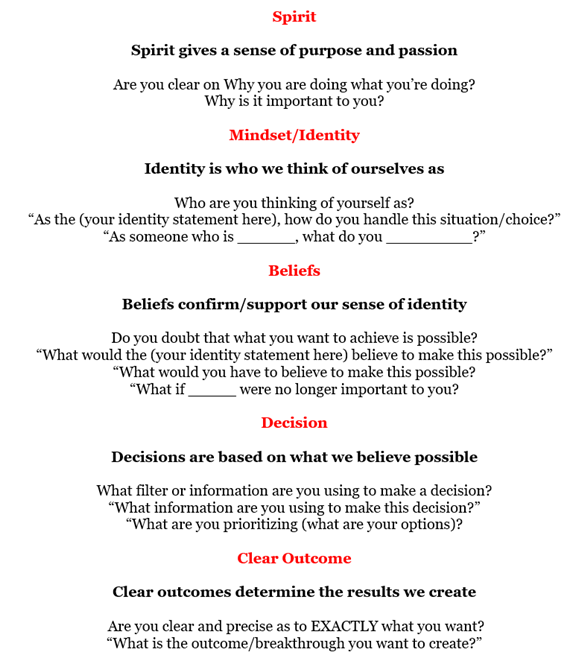
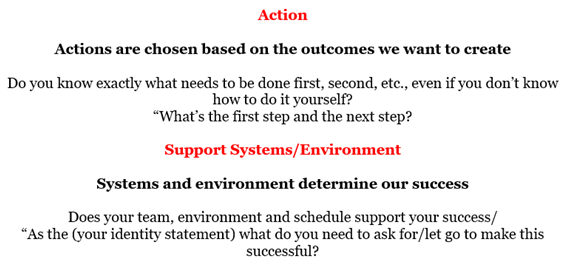
Recognizing your power and the ability to choose
The truth is that you have no control over the world around you. You have the same amount of power over others as you do over the weather, natural disasters, or the past. Concentrating your efforts on controlling external forces is a waste of energy. While you have no control over what happens to you, you can always choose how you respond.
This does not imply that you are a victim of your circumstances. On the contrary, it implies that you have control over your experiences because you have control over your thoughts, words, and actions.
You always have the power and ability to choose what you will do in any situation, as long as you recognize it.
10 ways we give our power away — and how to reclaim it
If you want to feel more empowered in your life, you must first become aware of the situations in which you are relinquishing power. Do any of these scenarios ring a bell? If that’s the case, you have the power to change things.
1. You don’t speak up when something is wrong. Whether the “something” is wrong with you, your relationships, or the world at large, you have the ability to speak up at any time. When you choose to remain silent, you become complicit in what is going on around you. Instead, consider the following options: Practice expressing your thoughts on issues that are important to you, even if they appear minor or insignificant. You’ll begin to exercise your ability to speak up, and it will eventually become easier and more natural.
2. You’re waiting for permission from someone. Do you want someone to tell you when you’re ready to move on? Are you waiting for someone to give you permission to do something you really want to do? When you wait for permission, you cede control. Instead, consider the following options: Recognize where you are in your life where you are waiting for someone else to give you the green light and instead give it to yourself. You exercise your power to create your life when you give yourself permission to do what you really want.
3. You procrastinate or refuse to make a decision. When you put off making a decision, you end up not making one at all. You then become a victim of whatever happens to you, whether you wanted it or not. This can result in resentment, anger, and blaming others — all because you did not exercise your right to choose. Instead, consider the following options: Commit to making decisions that will benefit you the most. Advocate for your best interests and don’t put off important decisions.
4. You have allowed someone else to make decisions in your life. Who really has control over your life? If the answer is someone other than you, you are relinquishing power. You, not anyone else, are ultimately responsible for your circumstances. Instead, consider the following options: Decide what you will do if you are not in the job, relationship, or health condition that you desire. Share your ambitions with the people in your life. Inform those closest to you of your priorities and what you intend to do to effect change.
5. You are not using your intuition. Have you ever had the uneasy feeling that something isn’t quite right? But then you ignore that feeling and continue on your way? Our intuition is the most accurate predictor of what is right and wrong for us at any given moment. We choose against ourselves when we ignore this innate force. Instead, consider the following options: Believe that your intuition is guiding you toward a higher good. Practice tuning into your intuition on a regular basis by checking in with yourself.
6. You are the victim of your own story. When you find yourself saying, “Everything is happening TO me,” it’s a sign that you’re a victim of your own story. Sure, a lot of crap happens in our lives over which we have no control. However, if you find yourself saying “poor me,” it’s time to reclaim your power. Instead, consider the following options: Victimizing oneself leads to inaction and depression. Begin to replace these negative thoughts with more supportive and empowering ones. Begin with “I support myself by…” or “I choose to…” and then include an action you will take to improve your situation.
7. You wait until the conditions are “ideal.” You will be waiting forever if you wait until the time is right, or until the stars align, or until [insert perfect circumstance here]. Perfection is a mirage. By waiting for perfection, you are giving yourself an excuse to never do anything. Big achievements are built over time through a process of failing and succeeding, rather than in a single perfect instant. Instead, consider the following options: The key to exercising your power is to simply begin and adjust as you go. Accept that failure is a necessary part of the learning process and keep moving forward in spite of it. Take the first, clumsy step.
8. You are constantly putting others’ needs ahead of your own. Being considerate and caring is one thing, but if you are constantly putting the needs of others ahead of your own, you are neglecting yourself. You must first look after yourself before you can look after others. Instead, consider the following options: Start prioritizing your own well-being. What should you do on a daily, weekly, or monthly basis to feel cared for? This is not selfishness; it is prioritizing our own needs so that we can serve others.
9. You are playing small. When you know deep down that you have the ability to do more, be more, and live up to your full potential, but you choose to color “in the lines” because it makes you feel safe, you are giving up your power. You were born with gifts, strengths, and talents that were meant to be shared with the rest of the world. Why squander them? Instead, consider the following options: Tell yourself that even if it’s scary, you’ll start stepping up to the plate in your (career/relationship/health). This could imply doing something you don’t think you’re ready for. Do it anyhow.
10. You’re not earning your worth. Since money is a reflection of your self-worth if you are not earning an income that reflects the value that you offer then you are giving your power away. We deserve to get paid what we’re worth when we do, we can realize our value and have others see it too.
Recognizing how you give away your power is the first step toward reclaiming it. Recognize that, regardless of your circumstances, you have the power to choose, to prioritize your best interests, and, ultimately, to create the life you truly desire.
“When I dare to be powerful, to use my strength in the service of my vision, then it becomes less and less important whether I am afraid.” – Audre Lorde

Claiming Your Money Power
Why we give up our money power.
1. Afraid of conflict.
2. Afraid of facing responsibility and being a financial grown up.
3. Afraid of what others will think.
4. Afraid of looking like a failure.
5. Afraid of disempowering someone else.
It’s time to regain our power and stand in our power with money. Start feeling expansion and peace vs. contraction and frustration.
You can define your own set of rules. It will take practice, focus and courage.
Examples of Situations where you give away your money power
1. What’s a situation you’re uncomfortable asking for the money that you want?
2. What is a situation where you are afraid to ask for more money?
3. What’s a situation where you are afraid of making more money?
4. Where are you making excuses of why you can’t do something because you don’t have the money?
5. What is a situation where you could be saving money and haven’t investigated or followed up on it?
6. What is a situation where you owe someone money and you haven’t agreed upon a payoff plan?
7. What is a situation where you are avoiding having an honest conversation regarding money with someone?
8. What is a situation where you are afraid of asking for what is owed or due to you?
9. What is a situation where you are avoiding setting a Bold Money Goal?
10. What is a situation where you are holding back from leaping into a new opportunity?
State your own situation where you are giving away your power with money.
Be Courageous
It takes commitment and courage to change these situations.
Statement Starter…
“I have the courage to…” (state in the positive)
Set Boundaries
By setting boundaries you can honor and protect your commitments.
“The boundary I will put into place is…”
Be Proactive
Remember the key to making a change is to take action.
“The action I will take is ___________ and ____________by _________ (this date).
The Gift
Seeing this change as a gift will allow for feelings of expansion. Visualize the end result so you can tap into the feelings of gratitude and appreciation.
“The gift in this is…” (state in the positive)
A spiritual life is synonymous with a prosperous life. When we allow ourselves to identify as naturally abundant from within, we create abundance in the outside world in the form of money and wealth.
“We do not need magic to transform our world. We carry all of the power we need inside ourselves already.” – J.K. Rowling

Exercise 4:12: Claim Your Money Power Exercise
Print out a copy of the Claim Your Money Power Document for each of the participants. (Access Here) Claim Your Money Power Doc
Have the group partner up into pairs.
Have them go through this document with their partner asking the questions on the chart. (Include at least 3 situations).
Once complete switch places.
Share experience with the group.
Project Studies
Project Study (Part 1) – Customer Service
The Head of this Department is to provide a detailed report relating to the Money Mindset process that has been implemented within their department, together with all key stakeholders, as a result of conducting this workshop, incorporating process: planning; development; implementation; management; and review. Your process should feature the following 12 parts:
01. Money Legacy
02. Expansion vs Contraction
03. Clear Clutter
04. Forgive Past
05. Money Breakthrough
06. Relationship with Money
07. Need vs. Want
08. Financial Literacy
09. Money Management
10. Money Goals
11. Action and Accountability
12. Money Power
Please include the results of the initial evaluation and assessment.
Project Study (Part 2) – E-Business
The Head of this Department is to provide a detailed report relating to the Money Mindset process that has been implemented within their department, together with all key stakeholders, as a result of conducting this workshop, incorporating process: planning; development; implementation; management; and review. Your process should feature the following 12 parts:
01. Money Legacy
02. Expansion vs Contraction
03. Clear Clutter
04. Forgive Past
05. Money Breakthrough
06. Relationship with Money
07. Need vs. Want
08. Financial Literacy
09. Money Management
10. Money Goals
11. Action and Accountability
12. Money Power
Please include the results of the initial evaluation and assessment.
Project Study (Part 3) – Finance
The Head of this Department is to provide a detailed report relating to the Money Mindset process that has been implemented within their department, together with all key stakeholders, as a result of conducting this workshop, incorporating process: planning; development; implementation; management; and review. Your process should feature the following 12 parts:
01. Money Legacy
02. Expansion vs Contraction
03. Clear Clutter
04. Forgive Past
05. Money Breakthrough
06. Relationship with Money
07. Need vs. Want
08. Financial Literacy
09. Money Management
10. Money Goals
11. Action and Accountability
12. Money Power
Please include the results of the initial evaluation and assessment.
Project Study (Part 4) – Globalization
The Head of this Department is to provide a detailed report relating to the Money Mindset process that has been implemented within their department, together with all key stakeholders, as a result of conducting this workshop, incorporating process: planning; development; implementation; management; and review. Your process should feature the following 12 parts:
01. Money Legacy
02. Expansion vs Contraction
03. Clear Clutter
04. Forgive Past
05. Money Breakthrough
06. Relationship with Money
07. Need vs. Want
08. Financial Literacy
09. Money Management
10. Money Goals
11. Action and Accountability
12. Money Power
Please include the results of the initial evaluation and assessment.
Project Study (Part 5) – Human Resources
The Head of this Department is to provide a detailed report relating to the Money Mindset process that has been implemented within their department, together with all key stakeholders, as a result of conducting this workshop, incorporating process: planning; development; implementation; management; and review. Your process should feature the following 12 parts:
01. Money Legacy
02. Expansion vs Contraction
03. Clear Clutter
04. Forgive Past
05. Money Breakthrough
06. Relationship with Money
07. Need vs. Want
08. Financial Literacy
09. Money Management
10. Money Goals
11. Action and Accountability
12. Money Power
Please include the results of the initial evaluation and assessment.
Project Study (Part 6) – Information Technology
The Head of this Department is to provide a detailed report relating to the Money Mindset process that has been implemented within their department, together with all key stakeholders, as a result of conducting this workshop, incorporating process: planning; development; implementation; management; and review. Your process should feature the following 12 parts:
01. Money Legacy
02. Expansion vs Contraction
03. Clear Clutter
04. Forgive Past
05. Money Breakthrough
06. Relationship with Money
07. Need vs. Want
08. Financial Literacy
09. Money Management
10. Money Goals
11. Action and Accountability
12. Money Power
Please include the results of the initial evaluation and assessment.
Project Study (Part 7) – Legal
The Head of this Department is to provide a detailed report relating to the Money Mindset process that has been implemented within their department, together with all key stakeholders, as a result of conducting this workshop, incorporating process: planning; development; implementation; management; and review. Your process should feature the following 12 parts:
01. Money Legacy
02. Expansion vs Contraction
03. Clear Clutter
04. Forgive Past
05. Money Breakthrough
06. Relationship with Money
07. Need vs. Want
08. Financial Literacy
09. Money Management
10. Money Goals
11. Action and Accountability
12. Money Power
Please include the results of the initial evaluation and assessment.
Project Study (Part 8) – Management
The Head of this Department is to provide a detailed report relating to the Money Mindset process that has been implemented within their department, together with all key stakeholders, as a result of conducting this workshop, incorporating process: planning; development; implementation; management; and review. Your process should feature the following 12 parts:
01. Money Legacy
02. Expansion vs Contraction
03. Clear Clutter
04. Forgive Past
05. Money Breakthrough
06. Relationship with Money
07. Need vs. Want
08. Financial Literacy
09. Money Management
10. Money Goals
11. Action and Accountability
12. Money Power
Please include the results of the initial evaluation and assessment.

Project Study (Part 9) – Marketing
The Head of this Department is to provide a detailed report relating to the Money Mindset process that has been implemented within their department, together with all key stakeholders, as a result of conducting this workshop, incorporating process: planning; development; implementation; management; and review. Your process should feature the following 12 parts:
01. Money Legacy
02. Expansion vs Contraction
03. Clear Clutter
04. Forgive Past
05. Money Breakthrough
06. Relationship with Money
07. Need vs. Want
08. Financial Literacy
09. Money Management
10. Money Goals
11. Action and Accountability
12. Money Power
Please include the results of the initial evaluation and assessment.

Project Study (Part 10) – Production
The Head of this Department is to provide a detailed report relating to the Money Mindset process that has been implemented within their department, together with all key stakeholders, as a result of conducting this workshop, incorporating process: planning; development; implementation; management; and review. Your process should feature the following 12 parts:
01. Money Legacy
02. Expansion vs Contraction
03. Clear Clutter
04. Forgive Past
05. Money Breakthrough
06. Relationship with Money
07. Need vs. Want
08. Financial Literacy
09. Money Management
10. Money Goals
11. Action and Accountability
12. Money Power
Please include the results of the initial evaluation and assessment.

Project Study (Part 11) – Logistics
The Head of this Department is to provide a detailed report relating to the Money Mindset process that has been implemented within their department, together with all key stakeholders, as a result of conducting this workshop, incorporating process: planning; development; implementation; management; and review. Your process should feature the following 12 parts:
01. Money Legacy
02. Expansion vs Contraction
03. Clear Clutter
04. Forgive Past
05. Money Breakthrough
06. Relationship with Money
07. Need vs. Want
08. Financial Literacy
09. Money Management
10. Money Goals
11. Action and Accountability
12. Money Power
Please include the results of the initial evaluation and assessment.

Project Study (Part 12) – Education
The Head of this Department is to provide a detailed report relating to the Money Mindset process that has been implemented within their department, together with all key stakeholders, as a result of conducting this workshop, incorporating process: planning; development; implementation; management; and review. Your process should feature the following 12 parts:
01. Money Legacy
02. Expansion vs Contraction
03. Clear Clutter
04. Forgive Past
05. Money Breakthrough
06. Relationship with Money
07. Need vs. Want
08. Financial Literacy
09. Money Management
10. Money Goals
11. Action and Accountability
12. Money Power
Please include the results of the initial evaluation and assessment.
Program Benefits
Marketing
- Customer experience
- Sales support
- Effective communication
- Positioning power
- Market growth
- Increased ROI
- Increased productivity
- Competitive advantage
- Improved image
- Accelerated growth
- Cutting edge
Management
- Increased collaboration
- Leadership excellence
- Improved communication
- Happier team
- Empowered employees
- Positive environment
- Innovation
- Augmented skills
- Valued skills
- Increased productivity
- Increased engagement
Human resources
- Improved culture
- Happier workplace
- Greater retention
- High-impact teams
- Growth mindset
- Increased engagement
- Improved management
- Leadership excellence
- Improved skills
- Strong Communication
- Empowered employees
Client Telephone Conference (CTC)
If you have any questions or if you would like to arrange a Client Telephone Conference (CTC) to discuss this particular Unique Consulting Service Proposition (UCSP) in more detail, please CLICK HERE.






















